 5
Issue 5
5
Issue 5
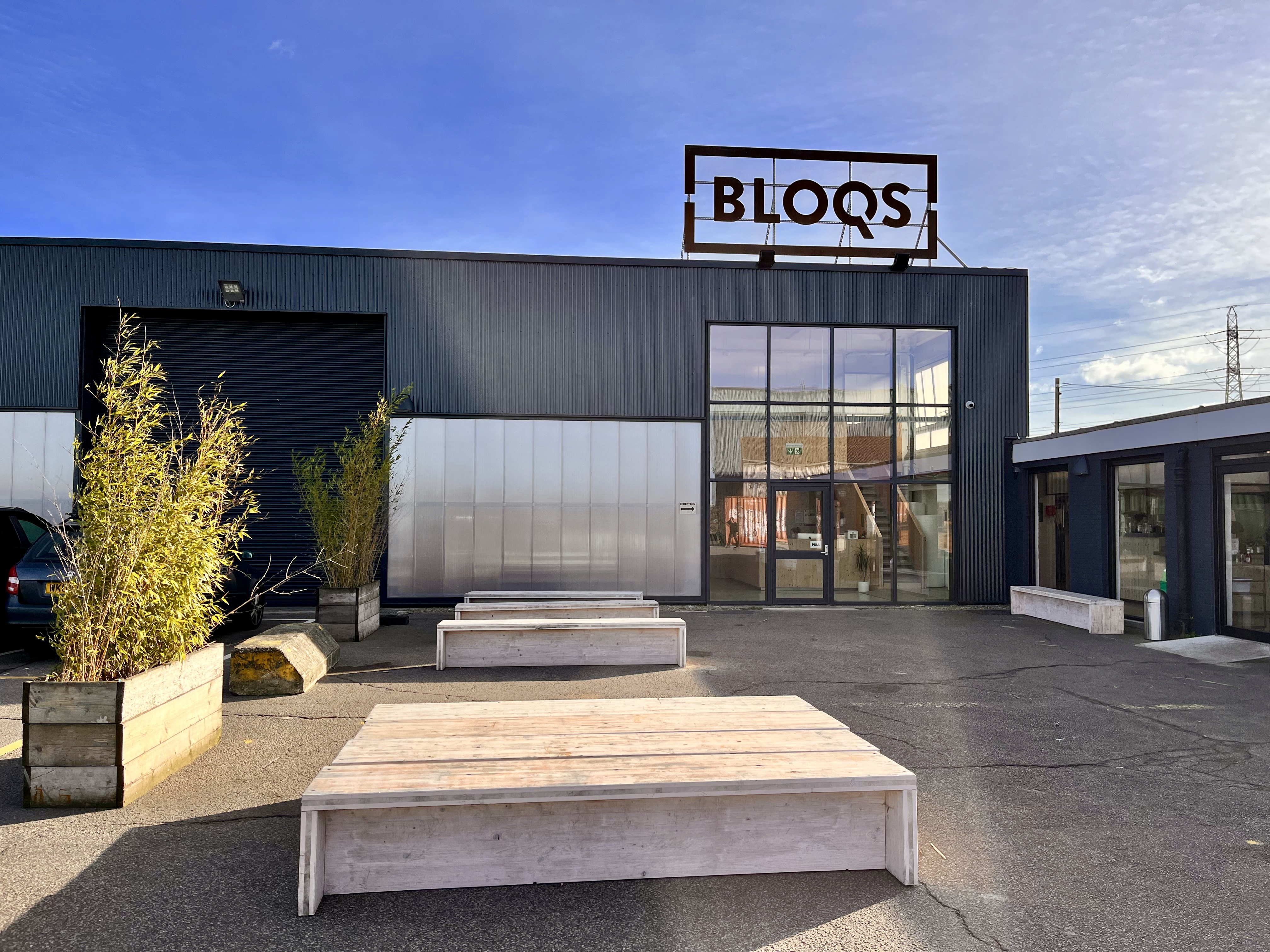
Bloqs' new open access factory – the UK's first – designed by 5th Studio, architects and urban designers, at Meridian Water, Upper Edmonton, a diverse new piece of city being led and delivered by Enfield Council over 20 years. Photo: Miles Evans.
Making it Happen – Bloqs’ open access factory launches at Meridian Water
Cutting ribbons to open new buildings is a pretty common ritual, and plenty of these newbies in the UK are still factories, with a giga-sized one as big as 74 football pitches apparently in the pipeline for the West Midlands in three years’ time. Last Thursday Bloqs, the country’s first ever open access factory officially launched in Upper Edmonton, in Enfield, north-east London. It’s forging ‘a magnificent new model for how manufacturing and making can thrive in London’s ever-changing socio-economic landscape’, says Al Parra, one of the founders and directors of Bloqs, the open access maker workshop organisation which has been based here for nearly a decade. The big – 32,000 sqft – new building, complete with Bloqs Kitchen Bar Deli, is open for business, You might well call it a maker haven, once you’ve visited.
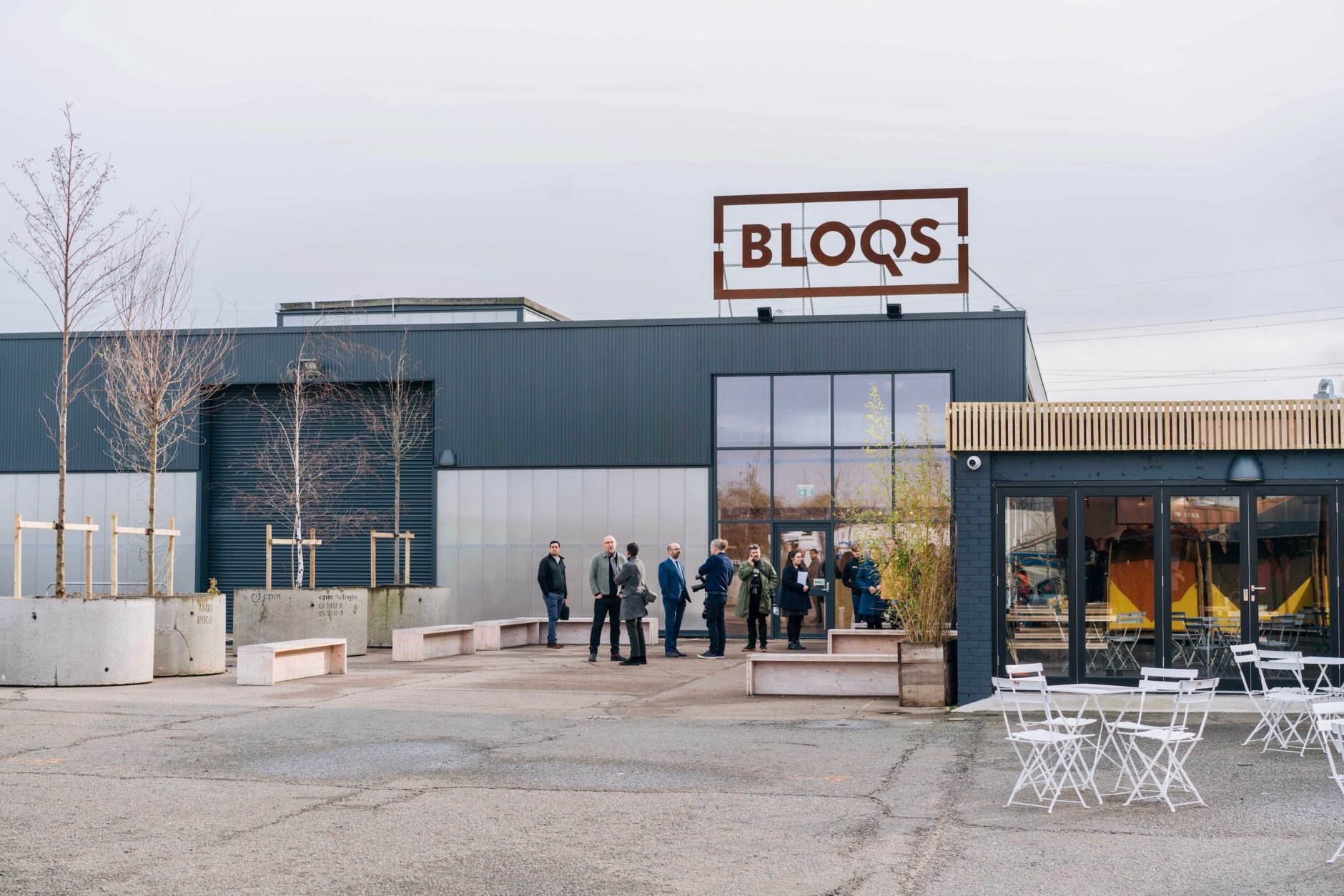
Bloqs’ open access factory, Meridian Water, Upper Edmonton in Enfield, north-east London, on launch day, 10 February 2022. The Bloqs Kitchen Bar Deli is on the right. Architects: 5th Studio. Photo: Claudia Abati.
Rooted in an area known predominantly by the public for its retail big boxes off the North Circular, close by the River Lea Navigation in the Upper Lea Valley, where lots of industrial sheds have been clustered, a place historically full of workshops cheek by jowl and thrumming with manufacturing activities, Bloqs is a beautiful 21st century invention. A space for making, a crucible of creative, community synergies and networks, with so many versatile facets to it. The gleaming new factory is based in the middle of Meridian Water, a diverse unfolding piece of London for living and working in close proximity and supporting the local area, being led, planned and delivered by Enfield Council over the next 20 years.
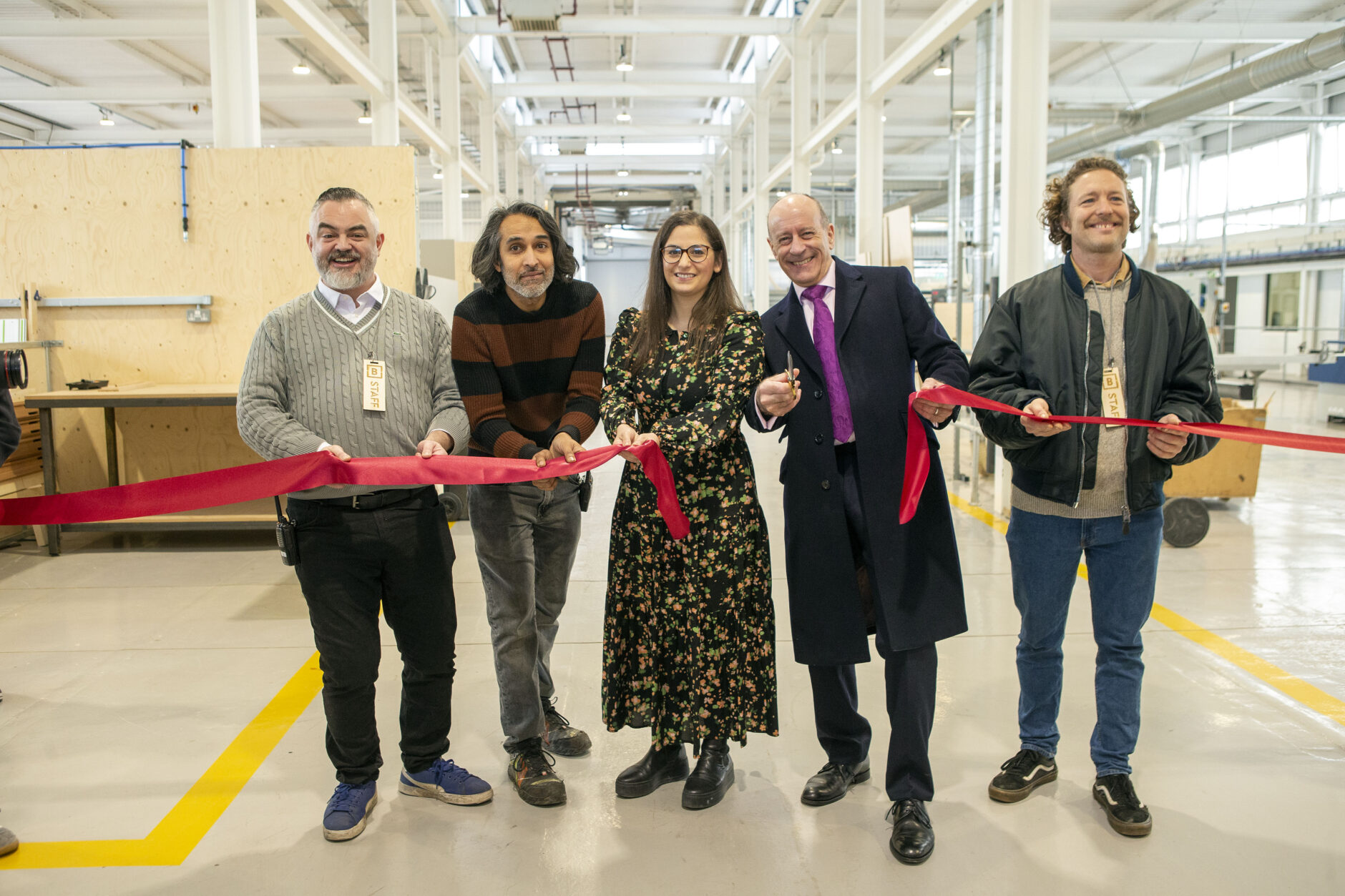
Cllr Nesil Caliskan, Leader, Enfield Council and Jules Pipe, Deputy Mayor of London, Regeneration, Skills and Planning, join Bloqs’ co-founders and directors Al Parra, Vinny Nanray (from left) and Arnaud Nichols (right) in celebrating the opening of Bloqs’ new open access factory at Meridian Water, Upper Edmonton, 10 February 2022. Architects: 5th Studio. Photo: Simon O’Connor; courtesy of Enfield Council.
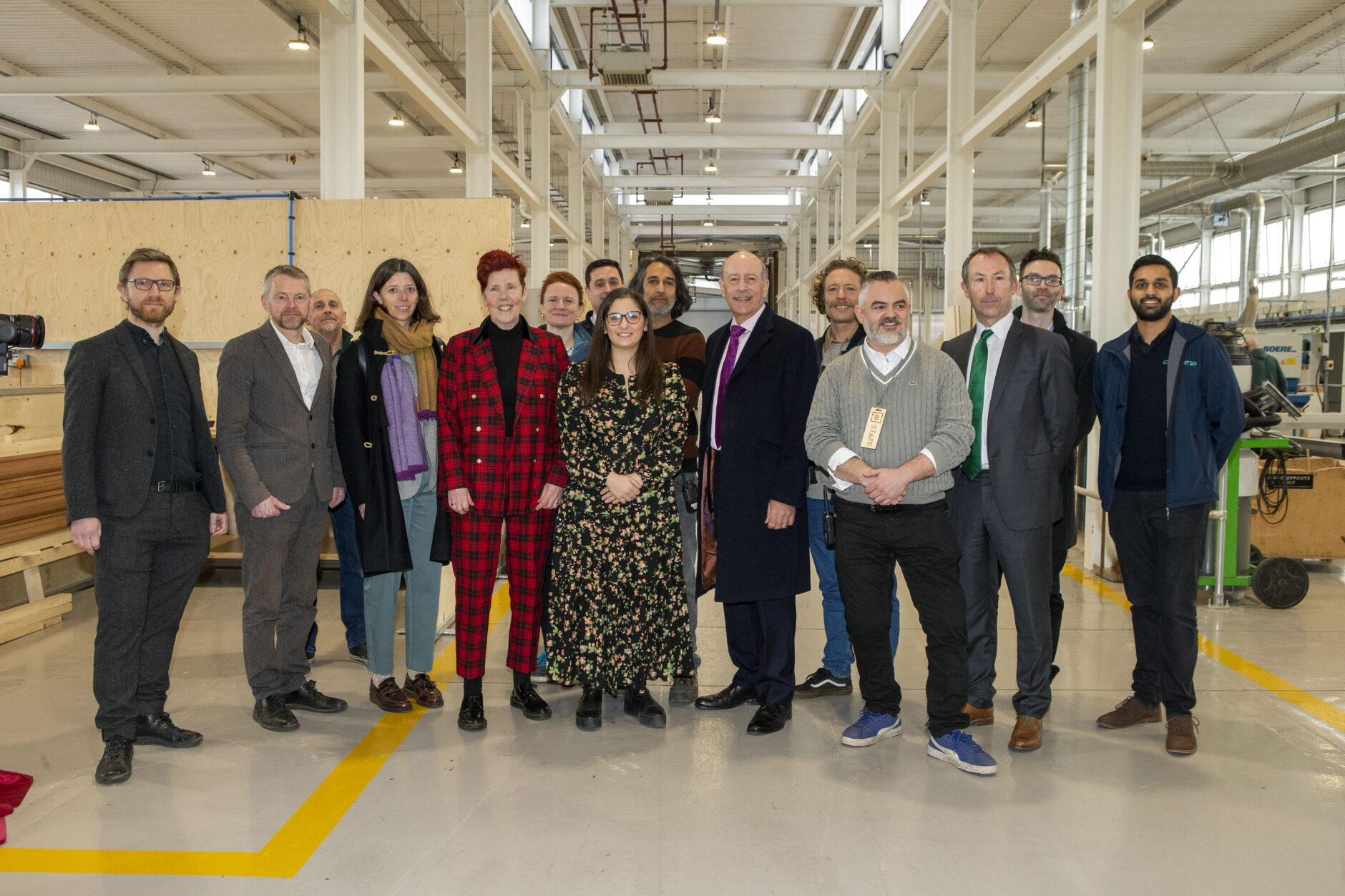
Launching Bloqs’ new open access factory: John Cain, Associate, 5th Studio , Tom Holbrook Director, 5th Studio; David Chamberlain, Bloqs member, Managing Director, DWCarpentry, Louise Duggan. Interim Head of Regeneration, GLA, Sue Tripp, Director, Learning for Life charity, Sarah Cary, Executive Director of Place, Enfield Council, Anthony Bushnell, Managing Director, Selmach Machinery Ltd, Cllr Nesil Caliskan, Leader of Enfield Council, Vinny Nanray, Co-founder, Bloqs, Jules Pipe, Deputy Mayor of London, Arnaud Nichols and Al Parra, Co-founding Directors, Bloqs, Malcolm Cuthbertson, Managing Director, Michael Weinig (UK); Matthew Jaffa, Senior External Affairs Manager, Federation of Small Business, Sachin Patel, Major Accounts Manager, Creat3D. Photo: Simon O’Connor; courtesy of Enfield Council.
As a unique grassroots organisation, Bloqs is a ‘a means for makers to make new lives for themselves’, said Parra, speaking at the launch on 10 February 2022. Now, with its new hangar-sized factory made from an ensemble of a repurposed, expanded vehicle testing shed, new building and yards designed by architects and urban designers 5th Studio, and a wealth of versatile machinery, Bloqs has successfully remade itself as Bloqs 2.0. ‘As a model, Bloqs intensifies land use and machinery by grouping multiple businesses under one roof’, he explained.
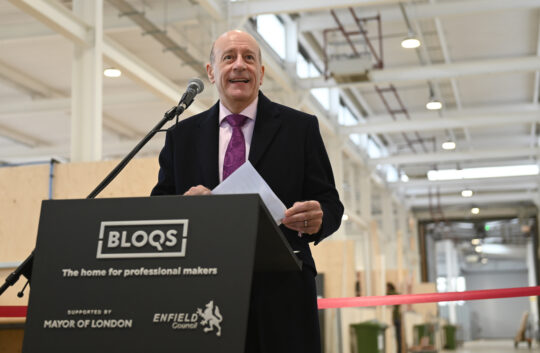
Jules Pipe, Deputy Mayor of London, speaking at the launch of Bloqs’ new open access factory, Meridian Water, 10 February 2022. Photo: Stuart Wilson for Getty.
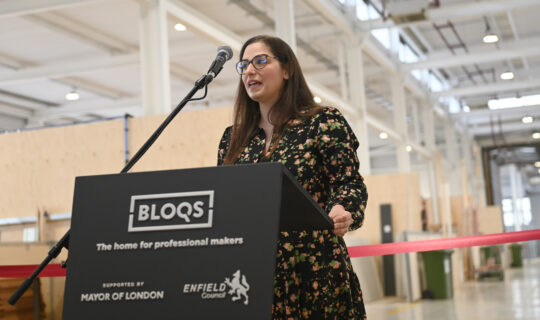
Nesil Caliskan, Leader, Enfield Council, launches Bloqs’ new open access factory, 10 February 2022. Photo: Stuart Wilson for Getty.
Jules Pipe, Deputy Mayor of London, Regeneration, Skills and Planning, who launched the new space with Cllr Nesil Caliskan, Leader of Enfield Council, described Bloqs as ‘an innovative example of what can be achieved when businesses, boroughs and City Hall work together to add value to local communities and economies. The ability of our small businesses to rebuild and thrive will be a crucial element of London’s post-pandemic recovery, and Bloqs gives businesses the space, materials and resources to do just that’.
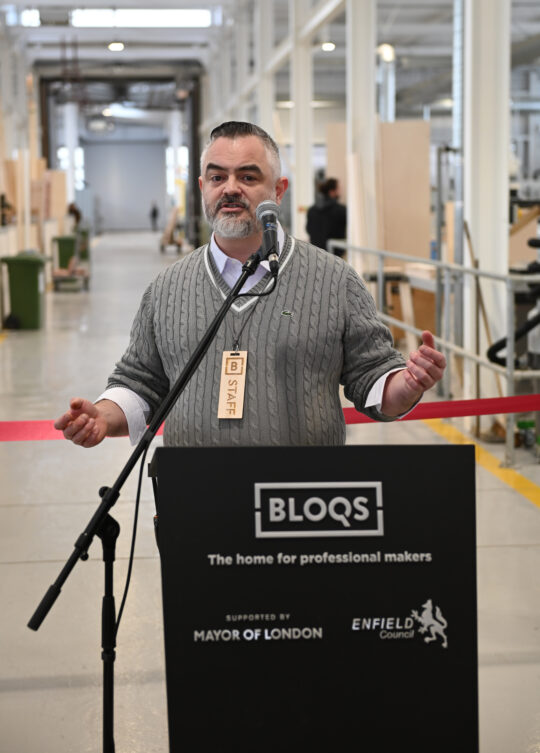
Al Parra, one of Bloqs’ co-founders and directors, speaking at the launch of Bloqs’ new open access factory, Meridian Water, 10 February 2022. Photo: Stuart Wilson for Getty.
‘In bringing economic benefit locally and for London, it’s addressing the ever growing demand for affordable workspace, has great potential to boost the local and regional economy, and make sure artisans aren’t priced out’, Pipe emphasised.
For Caliskan, ‘the expansion of the Bloqs workshop will provide higher levels of employment in Enfield, directly supporting our creative industries and businesses’, she said at the launch. ‘This is another great example of how Meridian Water is not only helping a local business grow but how it’s becoming the key place in the borough for the creative sector to flourish. I’m proud that our partnership with Bloqs has allowed the space to grow for the benefit of local people, with the prospect that ‘local businesses use this fantastic facility for many years to come’.
Caliskan, on taking office as Leader in May 2018, decided the council would lead the pioneering 85 hectare Meridian Water scheme as master developer, taking control and avoiding any possibility of the area becoming dominated by ‘flats for overseas developers’. Cranes have been on the remediated site since last year, and the first homes are due to be completed at Meridian One, the first phase on the west side, later in 2022, delivered by Vistry for Enfield, and designed by HTA, Hawkins\Brown, Edmonton-based Fisher Cheng and Urban Projects Bureau. £93m has been invested by the GLA in building affordable homes over four phases of development.
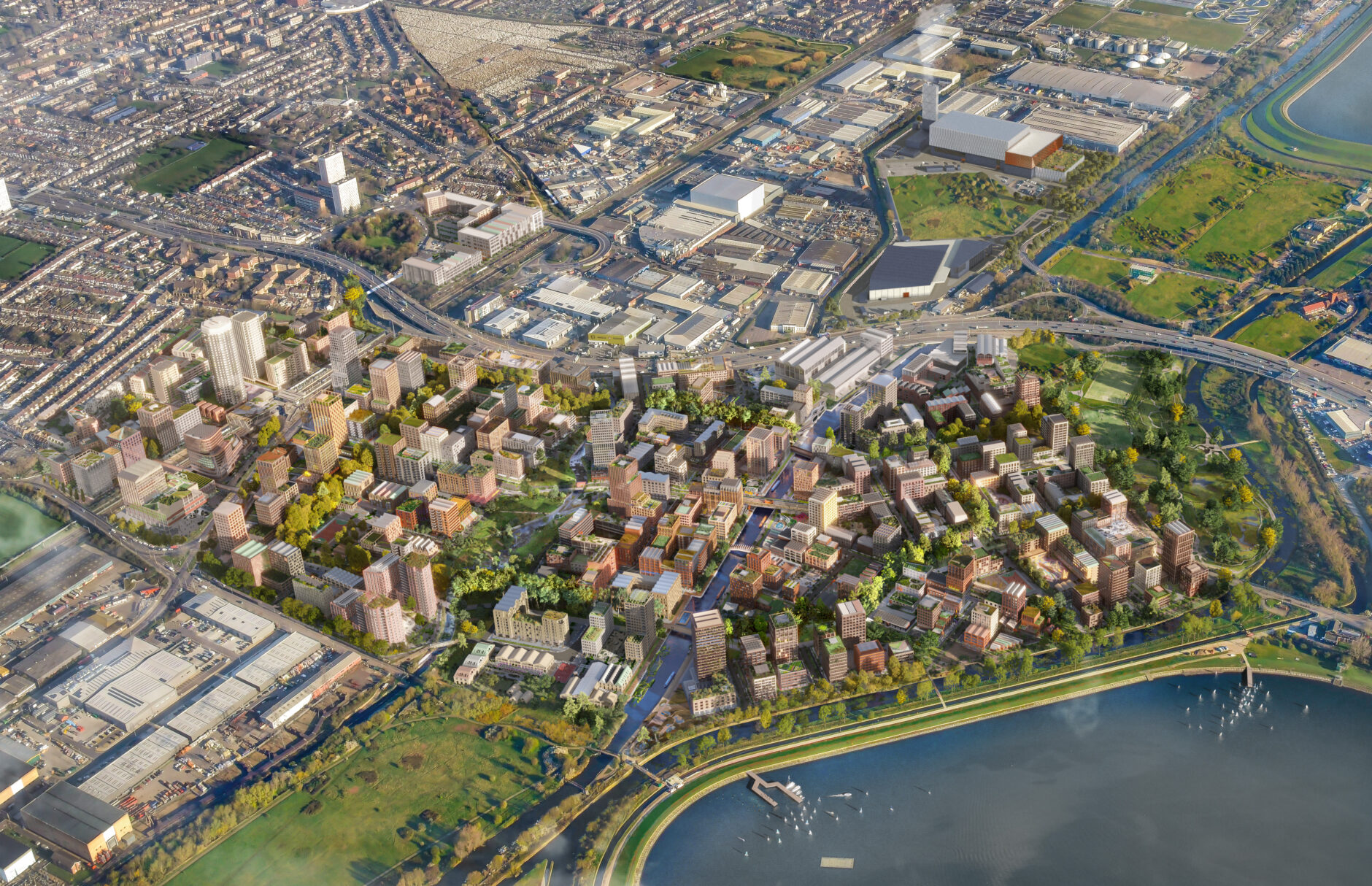
Aerial visualisation of the 85 hectare Meridian Water mixed use development in Upper Edmonton led by Enfield Council. Image: Kjellander Sjöberg Architects (overall masterplanning spatial lead in team with Periscope, Mae Architects, Jacobs; and 5th Studio, meanwhile masterplan) and A2 Studio.
With lots of space and creative possibilities signalled by strategic design work to date to make sure it will be as ecologically, socially and economically sustainable as possible, the overall Meridian Water masterplan team is necessarily a multi-disciplinary one: Kjellander Sjøberg Architects, Periscope, Mae Architects and Jacobs, with the meanwhile masterplan by 5th Studio, architects of the new factory. It’s all coming together phase by phase, growing and evolving, like King’s Cross has done, for example. Bloqs’ factory launch clearly helps hugely to continue building Meridian Water’s traction as a coming place with edge and character.
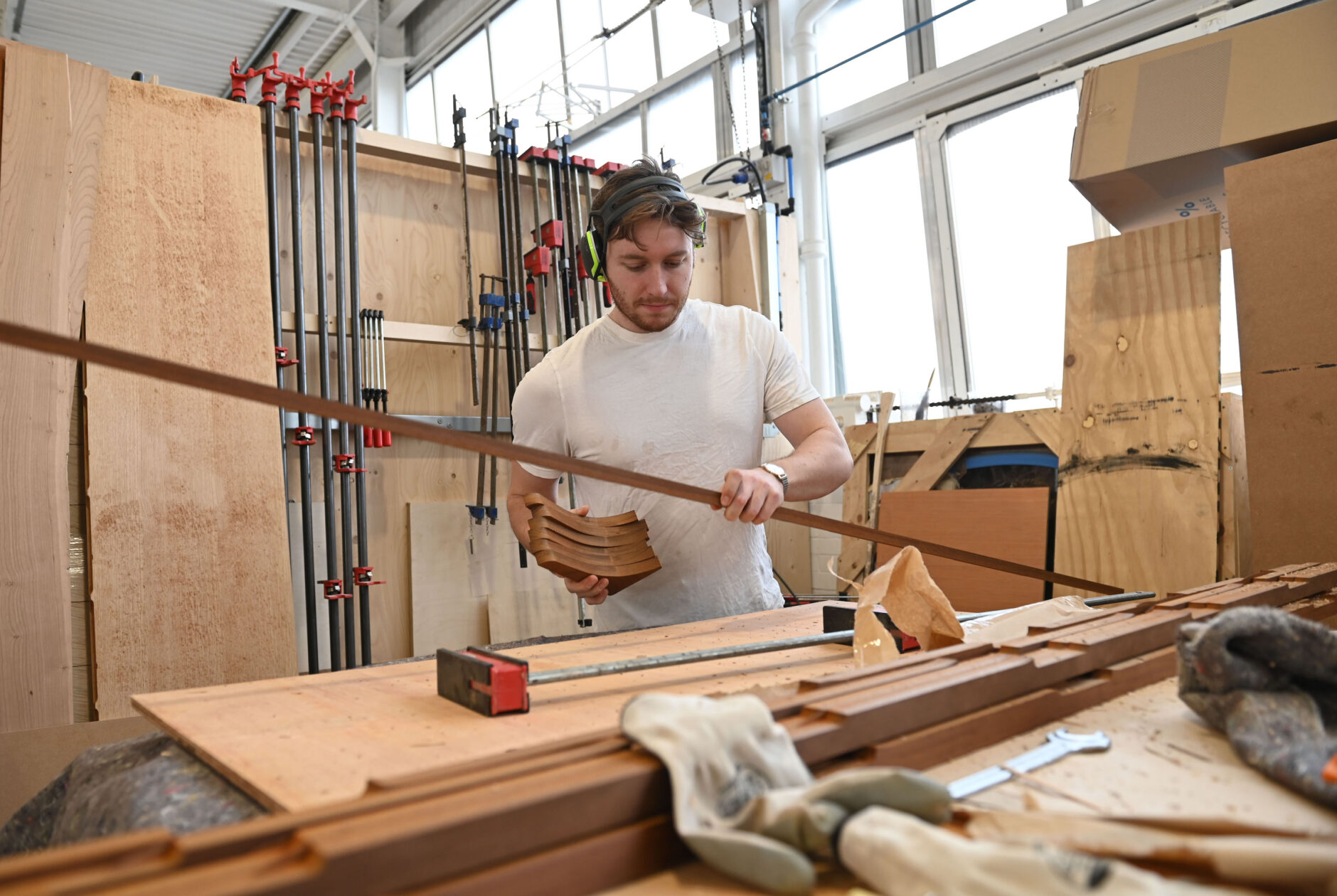
A maker member in action at Bloqs’ new open access factory designed by architects and urban designers 5th Studio. Photo: Stuart Wilson for Getty.
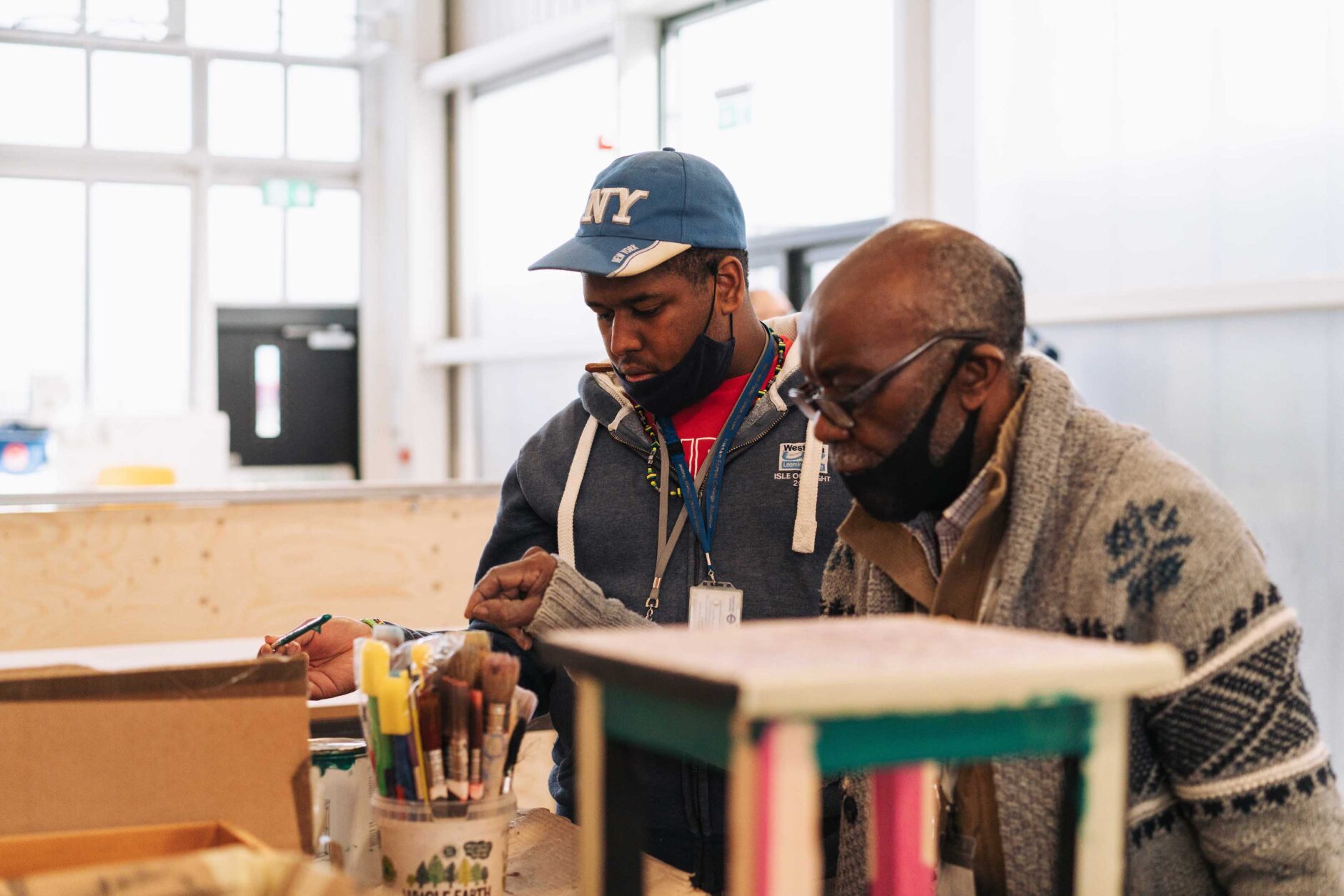
Maker members of Bloqs at the new open access factory, Meridian Water. Photo: Claudia Agati.
Dubbing themselves ‘the space you need to make it happen’ on their website, Bloqs has for some years now been a flagship partner to Meridian Water, central to its creative identity as a place as well as a trailblazer for a sustainable creative industries in London, ‘the exciting new town that is being built around us’, as Parra describes it. Bloqs’ expanding scope at Meridian Water means opportunities for all to access, practice and enjoy creative making close to hand.
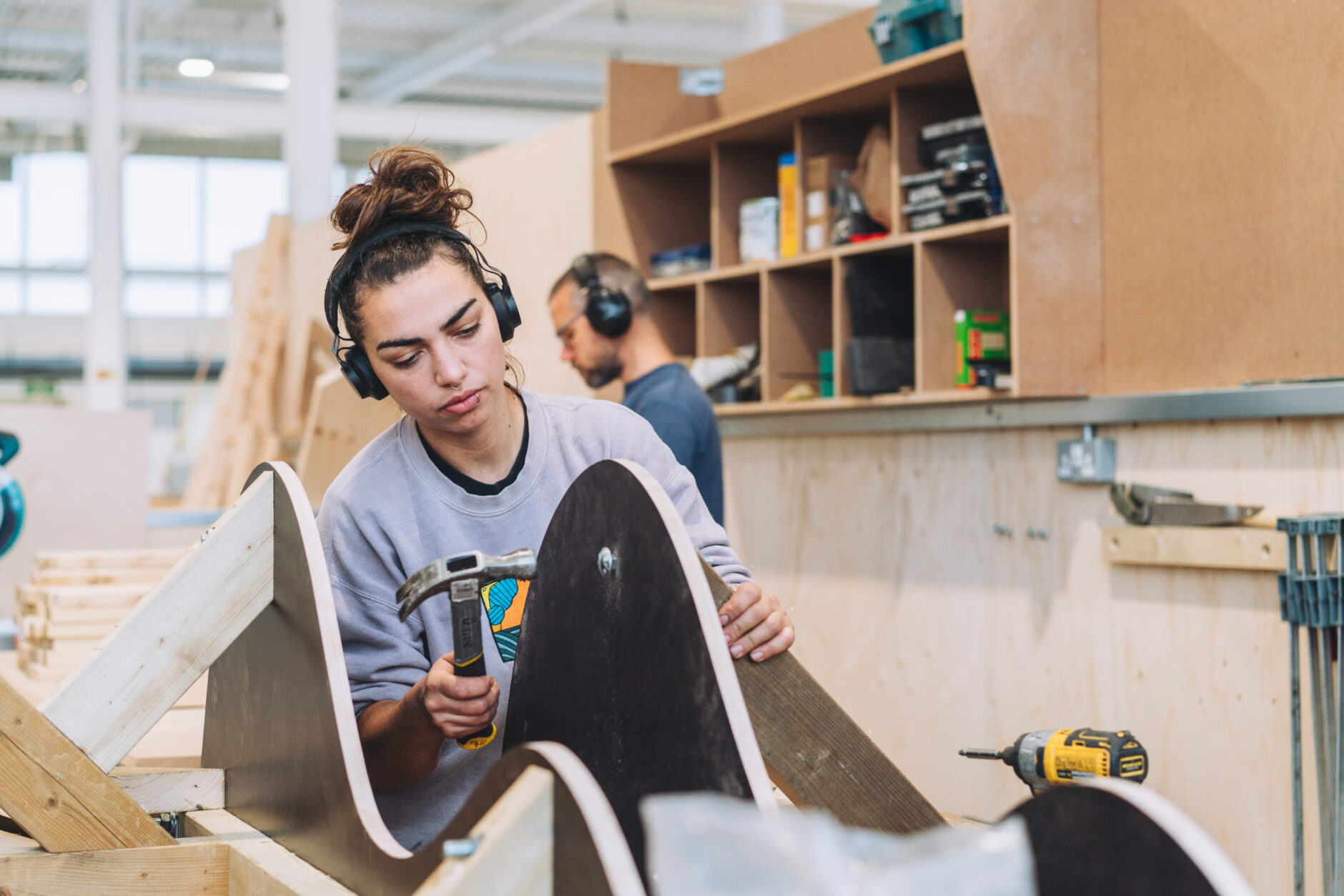
A maker member in action at Bloqs’ new open access factory designed by architects and urban designers 5th Studio. Photo: Claudia Agati.
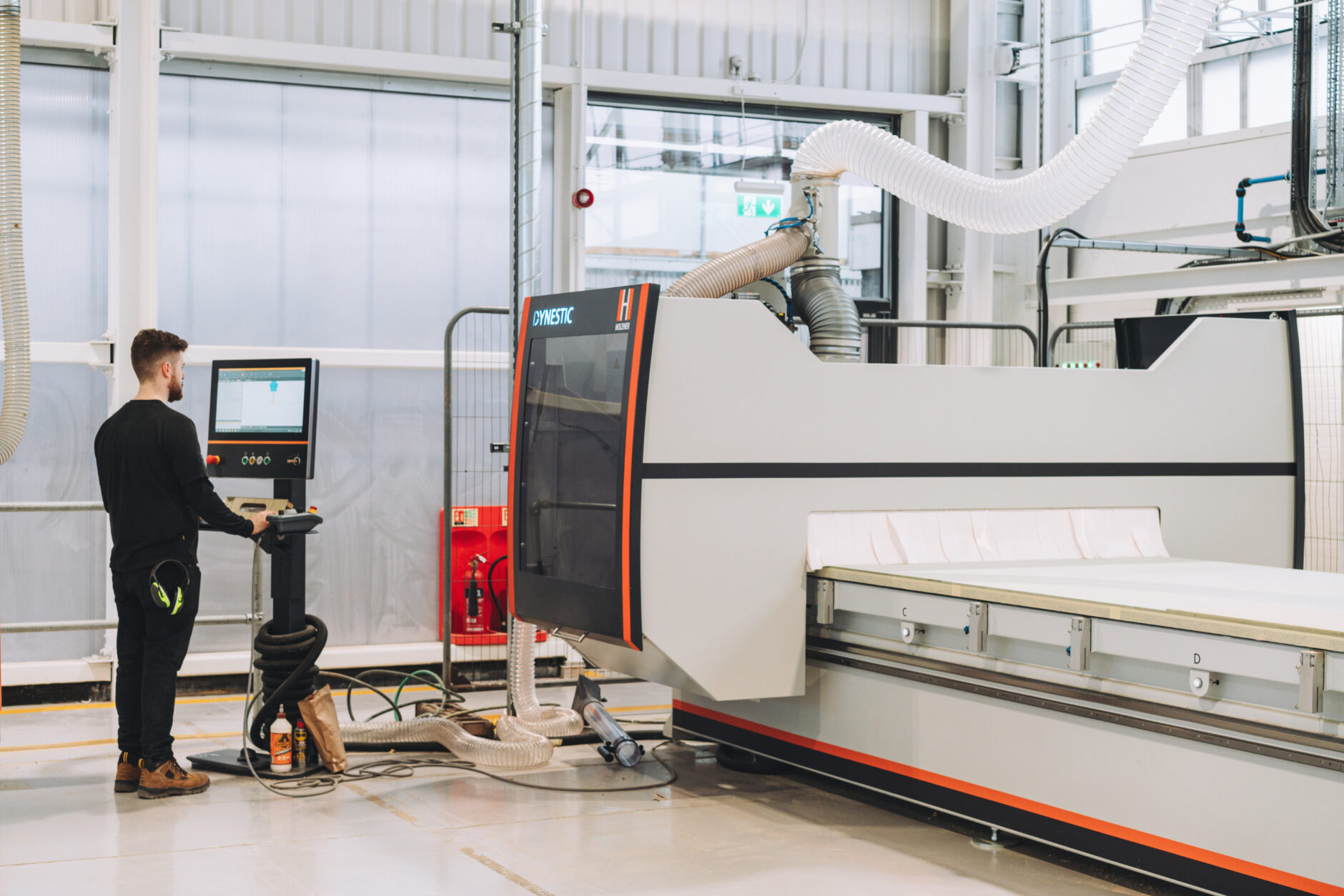
A maker member uses the new Dynestic 7505 flatbed CNC router in the CNC suite at Bloqs’ new open access factory, Meridian Water. Photo: Claudia Agati.
Peter George, Programme Director of Meridian Water since 2014, and Enfield Council’s Director of Development from February 2022, who’s been supportive of Bloqs’ growth at close hand from its founding, sees Bloqs as an opportunity to create what he calls a local economic ecosystem in a way that’s integral to the future of Meridian Water and its neighbouring communities. ‘We’ve got a shared commitment to job creation targeted at local people, to creating a skills programme, and a food and beverage, culture and entertainment offer. Bloqs can act as a foundation that we can build upon in terms of further job creation elsewhere at Meridian Water over the coming years’.
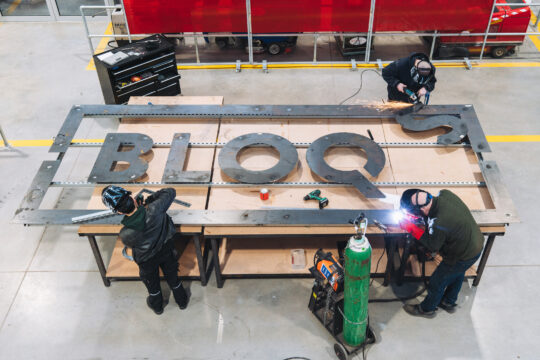
Bloqs’ maker members finishing the sign for the new open access factory at Meridian Water. Photo: Claudia Agati.
It was just five years after Bloqs first came to the area that the social enterprise won a £1.35m grant from the Greater London Authority (GLA) in 2016 through the London Regeneration Fund, match funded by Enfield Council, a total of £4m. The funding allowed Bloqs to move to a larger site over the road, 2 Anthony Way, and broaden the range of equipment and workstations it offers to its members on a pay-as-you-go basis.
The structure means you join for free and pay only for what you need, when you need it, as each maker’s circumstances is different and is likely to change over time. In some cases makers have rented bench spaces with access to the machinery they need in order to test out and see whether a business concept of theirs is viable before spending money on renting and equipping their own space. ‘A lot of people have walked into the first Bloqs over the years and said, OMG, it’s like the best university workshop, and they can access it themselves, as opposed to waiting for a technician’, Parra explains.
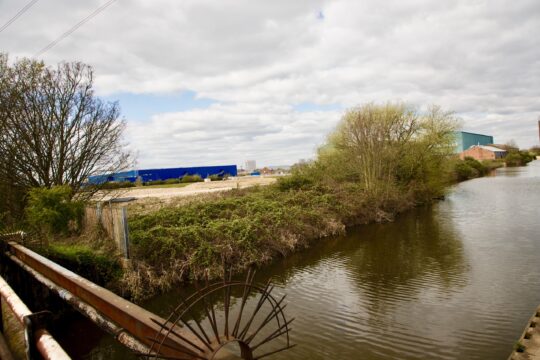
Waterways, greenery, sheds and IKEA in the background, Meridian Water, 2021. Photo: Bettie Harold-Sodipo.
This long neglected and economically deprived part of NE London, close to Waltham Forest and Haringey’s borders, is part of the city’s swathes of green, blue and grey (natural landscapes, waterways and strategic industrial sites) in the Upper Lea Valley. Today not so many people know about the groundbreaking social history of the area. Here, and across the whole of London, the focus is squarely placed on the post-pandemic recovery of the creative industries’ resilience and contribution to communities’ quality of life as part of the city’s wider economic health.
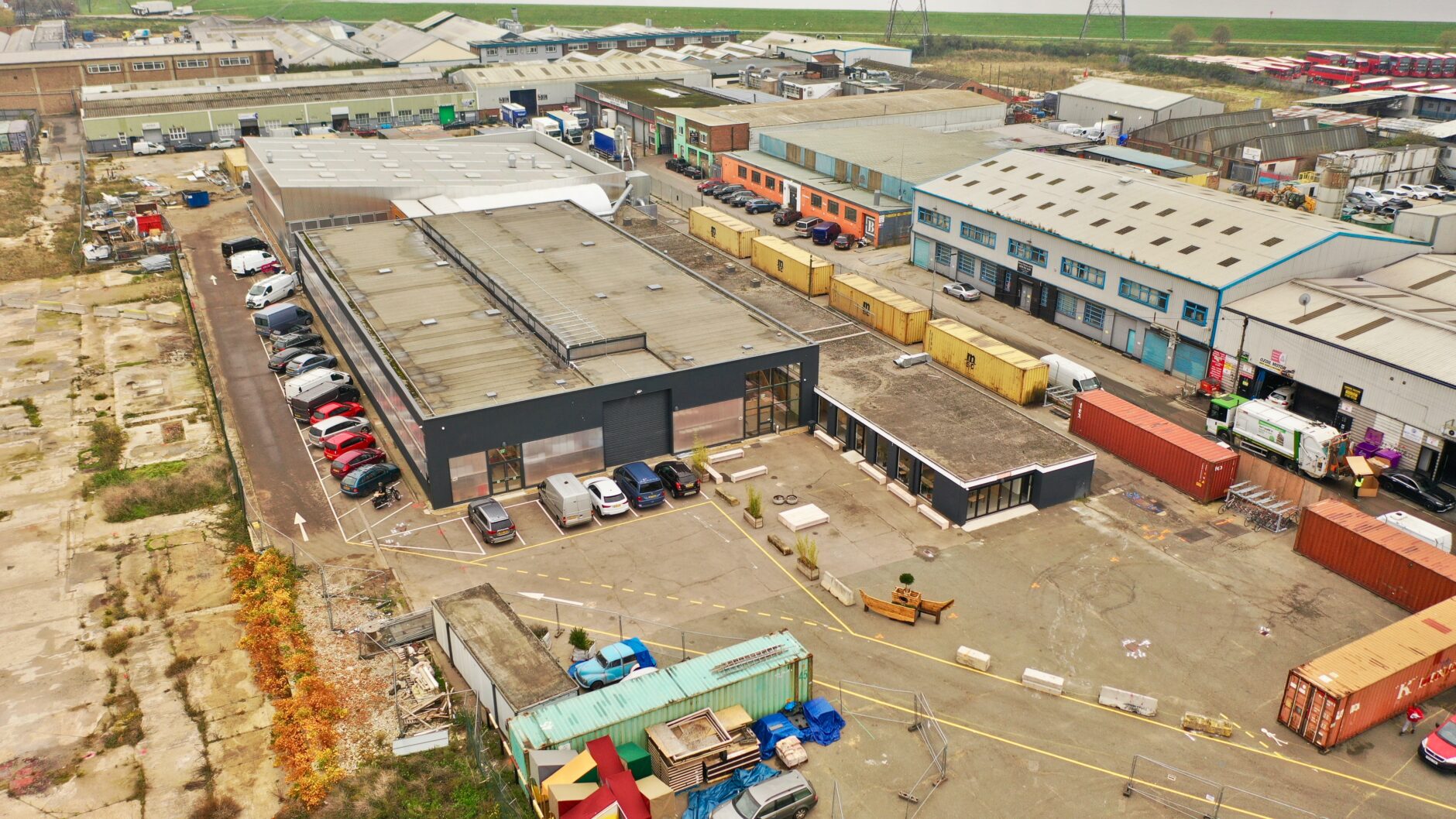
Aerial photo of Bloqs’ new factory at 2 Anthony Way, designed by architects and urban designers 5th Studio, at Meridian Water, Upper Edmonton. Photo: Alvie Hussein.
The launch of Bloqs’ state-of-the-art factory is a brilliant contemporary echo of that grand heyday, free of any trappings of the past. It gives the wider city a state-of-the art workshop – and an expanded means to avoid the further destabilisation of creative manufacturing. London has lost one quarter of its industrial floor spaces in the last 20 years. This has progressively eaten away at the sector’s capacity to stay in London on affordable rents and employ people locally since the 1980s. Severely impacted by the pandemic, they have been challenged by a growing lack of affordable making facilities. The situation, exacerbated by funding pressures, has displaced creative producers, causing communities to suffer rather benefit from their embedded presence in neighbourhoods over the long-term.
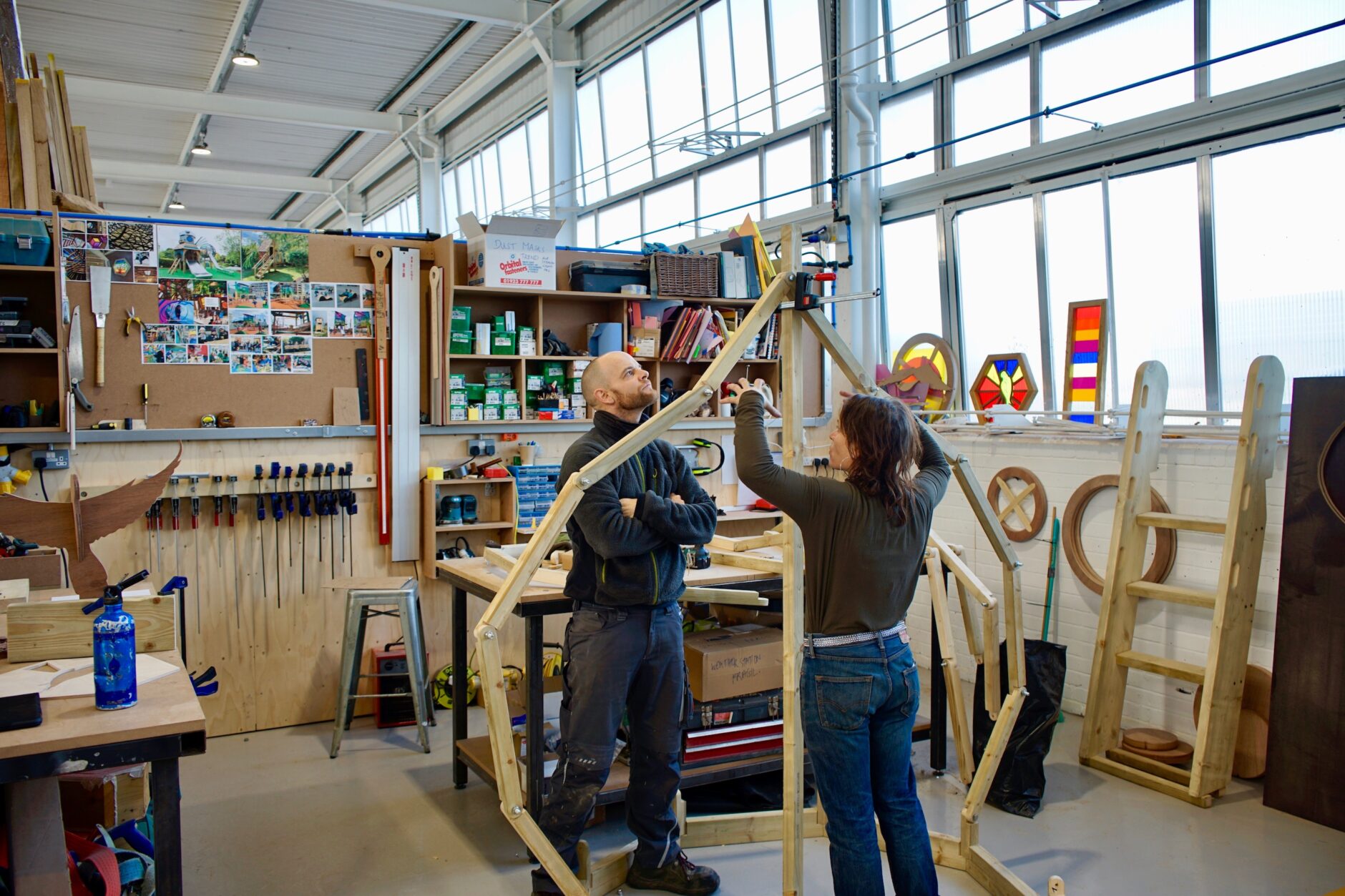
Maker members of Bloqs at work in the new open access factory space. Photo: Elijah Serumaga.
From the very first, Bloqs has always been open access and provided for the needs of the individual maker through a range of equipment and making facilities that has in the past been available inside educational institutions. By growing organically in the way that it has, Bloqs is supporting its members and the collaborative multidisciplinary spirit of the creative arts and wider entrepreneurial initiatives, while over the long-term benefitting people at Meridian Water and in neighbouring communities. Now with the new building, maker businesses can actually base themselves at Bloqs, something they couldn’t do in the old building due to its smaller scale.
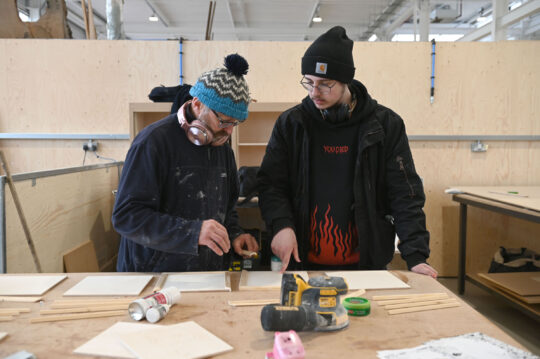
Bloqs is a community of over 1000 maker members. Photo: Stuart Wilson for Getty.
Bloqs is a family with strong community vibes visitors never fail to remark on. A number live locally, but across the whole they come from all over. The new light and spacious space exudes a sociable air of communality and can-do creative spirit. It means Bloqs is now able to share these expanded facilities, which include a host of new making equipment, with its community of over 1000 different maker members, maximise their use, and grow their membership, while sticking steadfastly to the accessible ethos Bloqs has always been renowned for.
How it began
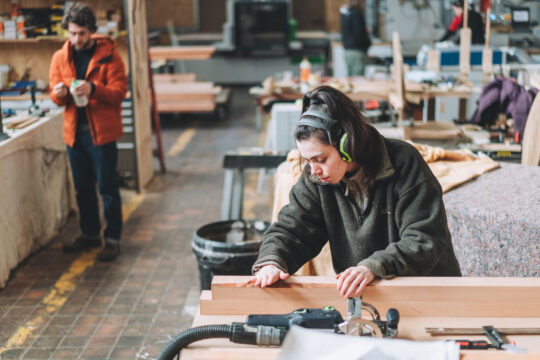
Bloqs maker members working at the original Bloqs space at 4 Anthony Way. Photo: Claudia Agati.
Parra and co-founders Arnaud Nichols, Vinny Nanray, Julien Thomasset and Alex Motta first set up Building Bloqs, as they were originally known, as a pay-as-you-go open workshop – the largest in London at the time – in 2012 at a brick building at 4 Anthony Way. It was a boon for the group after experiencing the rising rent of their live/work space which forced them to relocate from Hackney, to Haringey and then to Enfield. Bloqs was conceived ‘an entirely self-seeded solution made by makers for makers’, says Parra, ‘filling a gap in the market we’d prefer wasn’t there’.
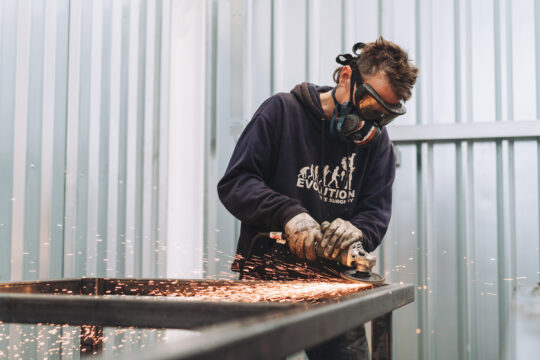
A maker member of Bloqs at work at the new open access factory. Photo: Claudia Agati.
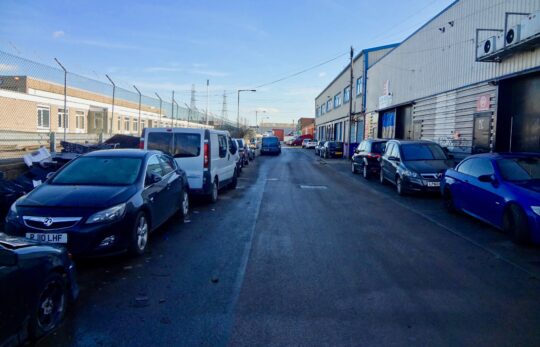
Anthony Way, home of Bloqs at no. 4 in the orange-painted brick building on the right, a setting with a number of other businesses photographed by 5th Studio, the architects of Bloqs’ new open access factory before they began design work. On the left, the location of the future Bloqs building (which was completed in September 2021). Photo: courtesy 5th Studio.
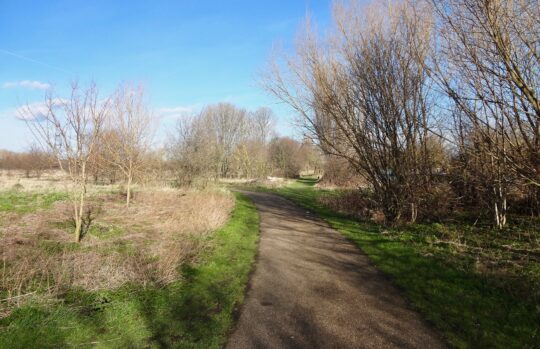
The Lea Valley Regional Park. Photo courtesy of 5th Studio.
Its maker members and a lot of other people have been fuelled by Bloqs’ tasty café on its premises since 2013, known as a valuable pit stop along the River Lee Navigation. That year it won best Social Enterprise at the Enfield Business Awards, at a time when member numbers were around 60. Anthony Way, the road where Bloqs’ original building sits, an orange-painted structure taxi drivers know well, serves the former heavily industrial landscape of Meridian Water next to the River Lea Navigation just south of the North Circular. A brownfield site on the fringes of the Lea Valley National Park, it had been earmarked by Enfield Council as a redevelopment zone a few years prior to when Bloqs arrived.
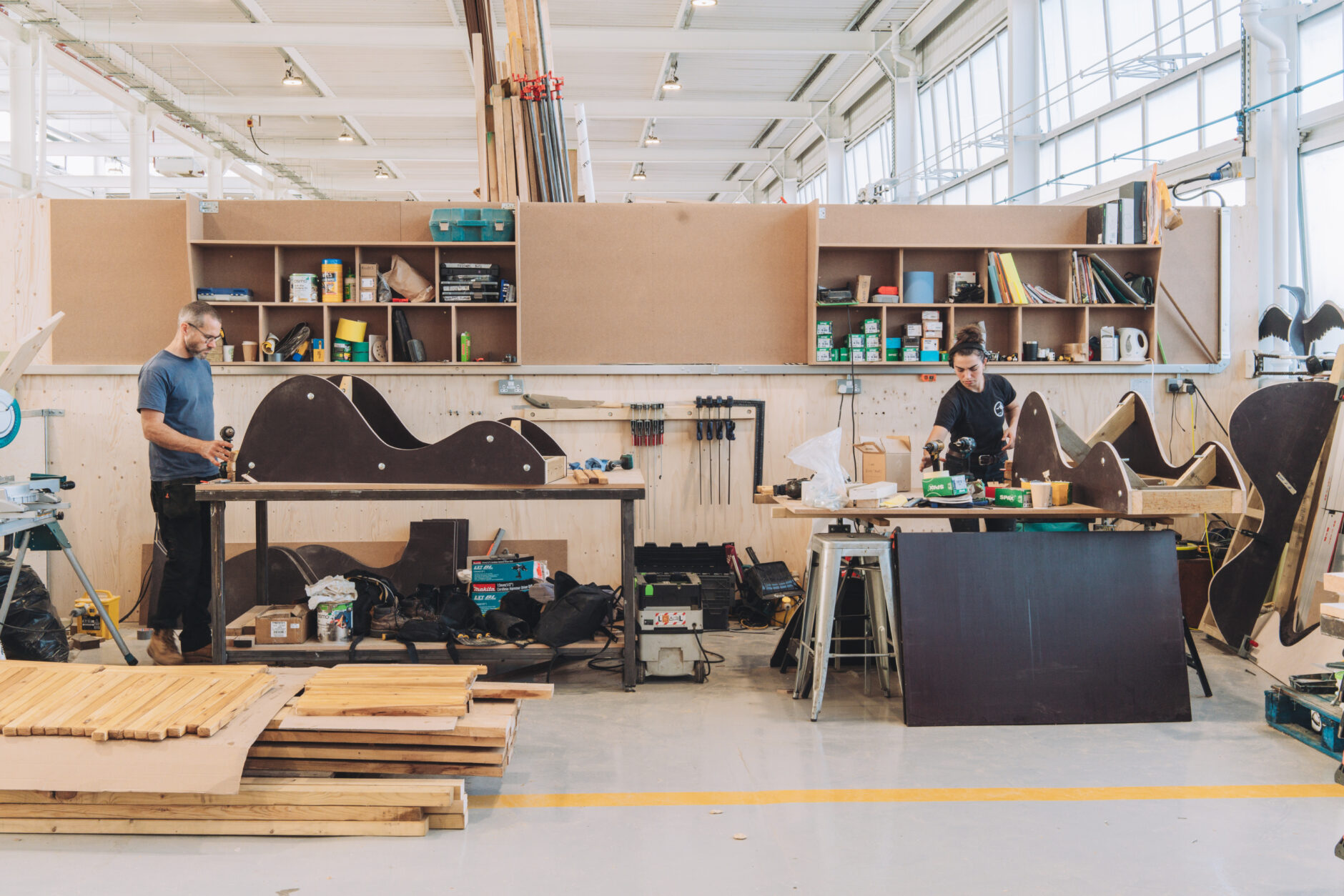
Teamwork at Bloqs’ new open access factory. Photo: Claudia Agati.
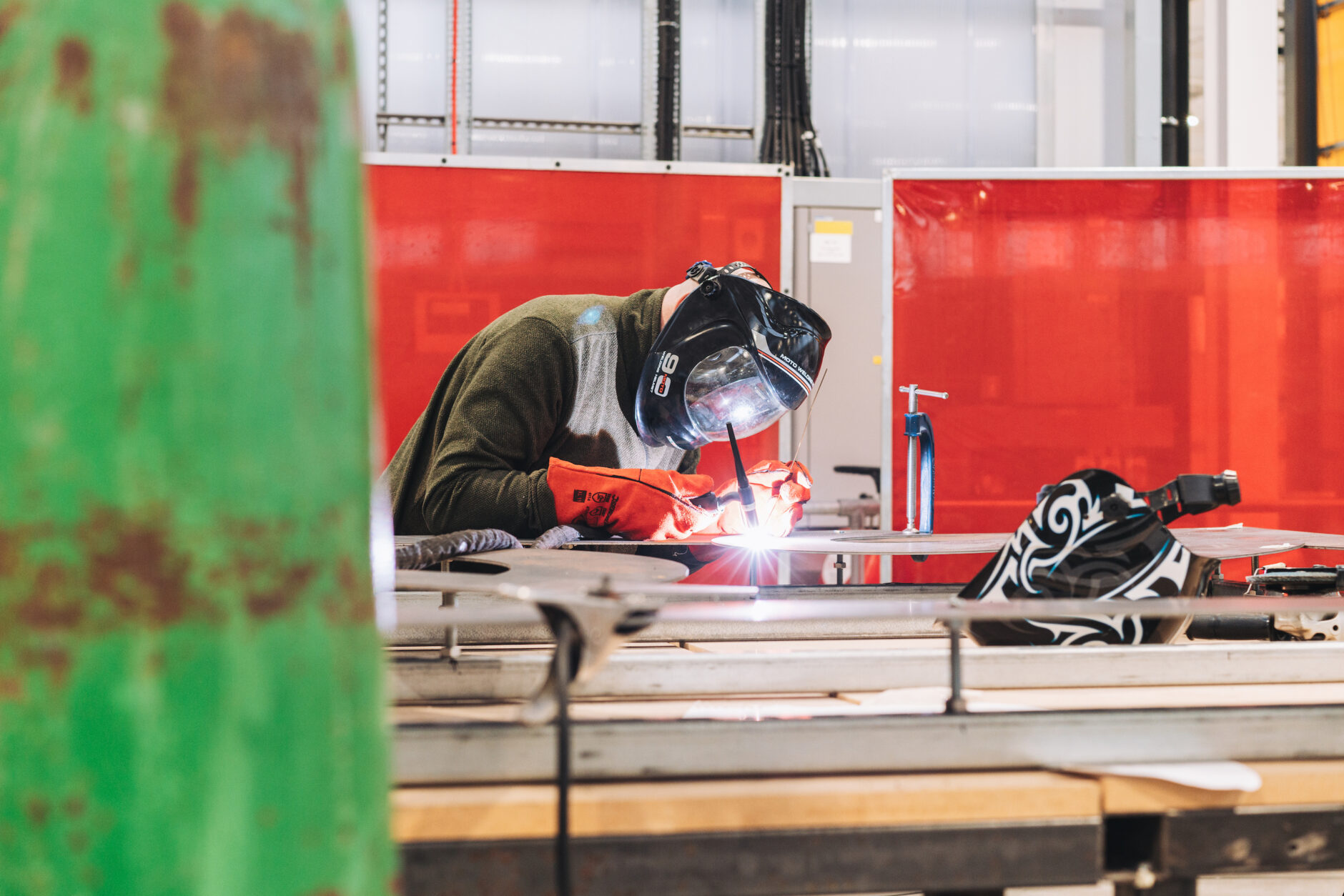
A maker member at work at Bloqs’ new open access factory. Photo: Claudia Agati.
In 2015 the £20m GLA Fund launched by the then Mayor Boris Johnson through the London Enterprise Partnership (LEAP), at Bloqs in 2015, when he announced the first awards to be made through it to 24 businesses and community groups in the capital, including a £1.35m London Regneration Fund (LRF) grant for Bloqs with partners Enfield Council as match funders. The aim of the Fund was to re-energise London’s places of work and high streets by supporting its talent in the creative arts and technological innovation, and to tackle the dire shortage of affordable creative workspaces in London due to dwindling options across all boroughs. LEAP champions small and medium sized enterprises in the city, which have grown in number from 800,000 (2016) to over 1.1m (2020), representing 1,593 businesses per 10,000 residents.
In 2016, the year that Mayor Sadiq Khan took office, he came to see Meridian Water taking shape and offered to open it when it was ready. ‘We urgently need to build more balanced neighbourhoods with space for creative talent and cultural infrastructure’, Khan wrote in his foreword to London’s Cultural Infrastructure Plan, published by the GLA in 2019.
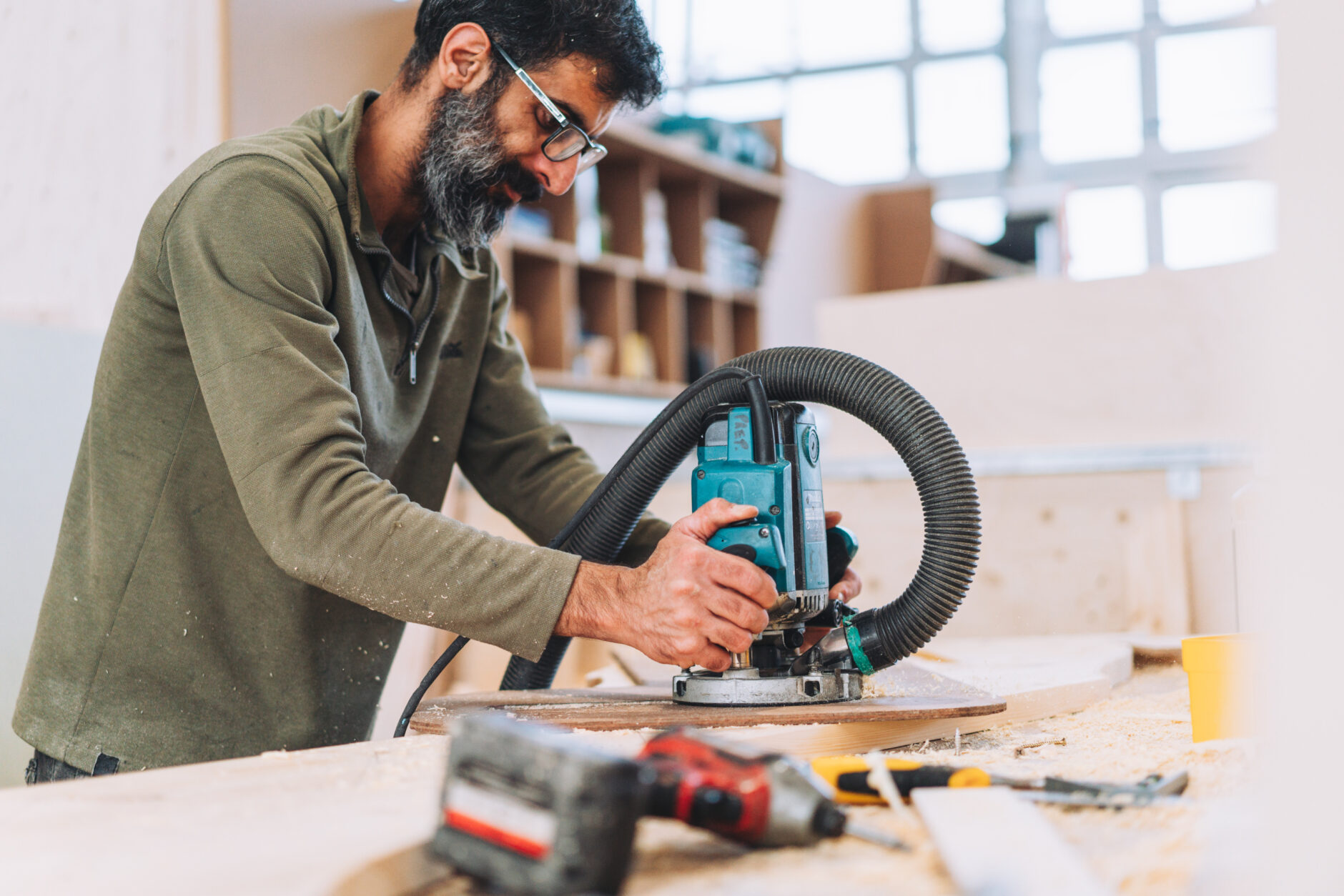
A maker member of Bloqs working at the new open access factory. Photo: Claudia Agati.
In 2017, after Stonehill Estate there was levelled, Bloqs was ‘an oasis amongst piles of rubble’, says Parra. Bloqs’ presence as what Ian Freshwater, Senior Regeneration Manager for Meridian Water, calls ‘early adopters’ at the heart of the site has been regarded as a community asset by the council for many years, and it’s a key part of the Meridian Water meanwhile strategy designed by 5th Studio for the council to nurture meanwhile activities and their integral value for the development. At the same time this goal activates Meridian Water’s local employment strategy enabling new well paid jobs and upskilling opportunities for local people. As a proponent of circular economy from the very start, Bloqs is an inspiring symbol of the sustainable value and growth potential of the creative industries in this part of Enfield.
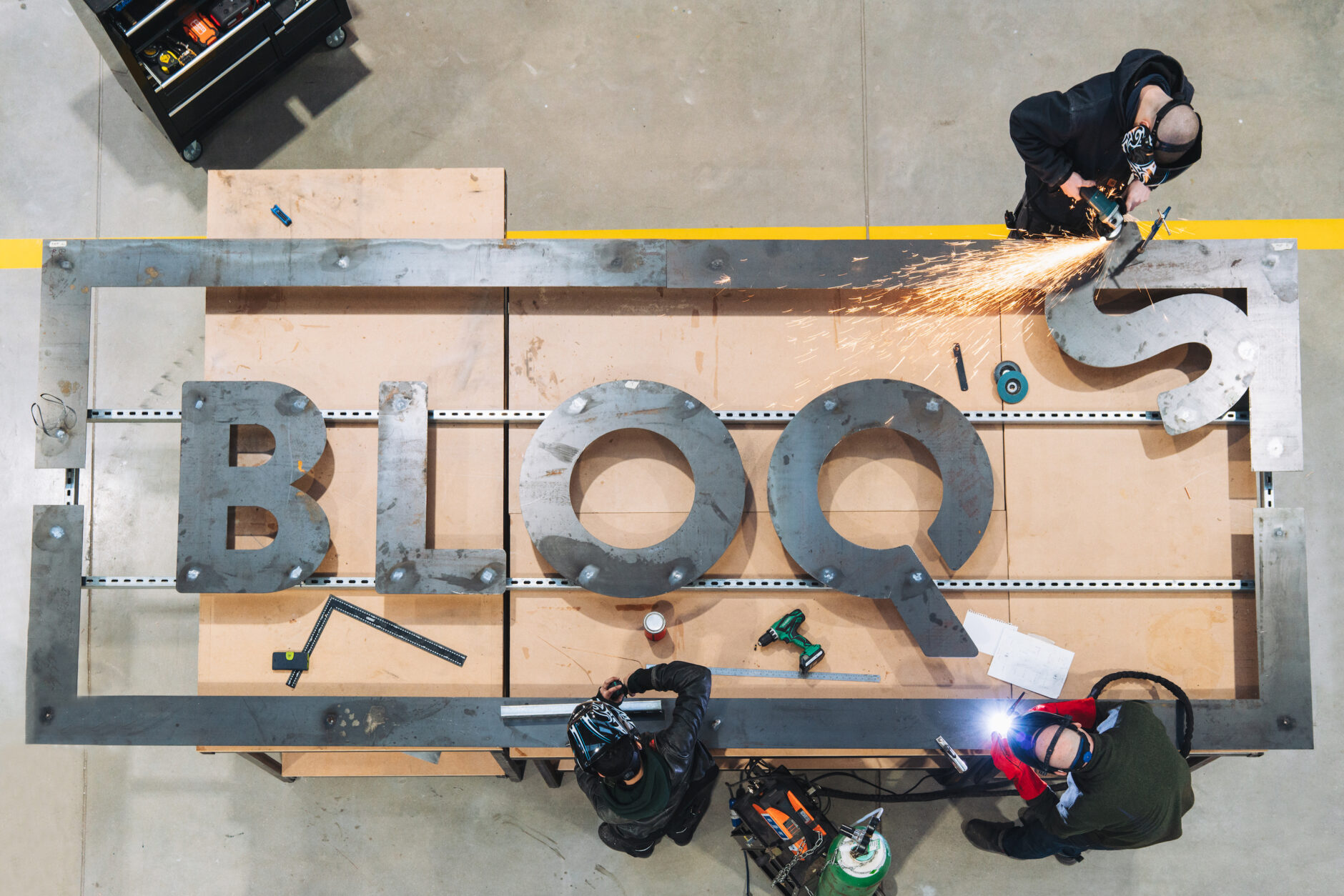
Making the Bloqs building sign at Bloqs’ new open access factory. Photo: Claudia Agati.
Bloqs’ multiplicity of makers
Flicking through the Bloqs membership directory online, it’s packed with furniture and film set makers, product and fashion designers (the fashion and sewing studio opened in 2016), customised bike makers, chippys, blacksmiths, artists, interior and mural painters, violin makers, set builders and more. At any one time the massive new factory spaces are buzzing with members engaged in making of all kinds, from high tech to low tech, at all scales.
They could be making workpods to make workspaces more pandemic-friendly, stage sets, bespoke children’s playground installations, bicycles, clothing, chopping boards, custom stiletto heels for a play – all sorts. Or using Bloqs’ welding or sewing machines, CNC equipment and additive technologies, for example, or doing joinery; deploying their flair in metal, wood, engineering and fashion and textiles. And, as maker in wood Mark Wood says, Bloqs ‘is so open you can see what everyone is working on’.
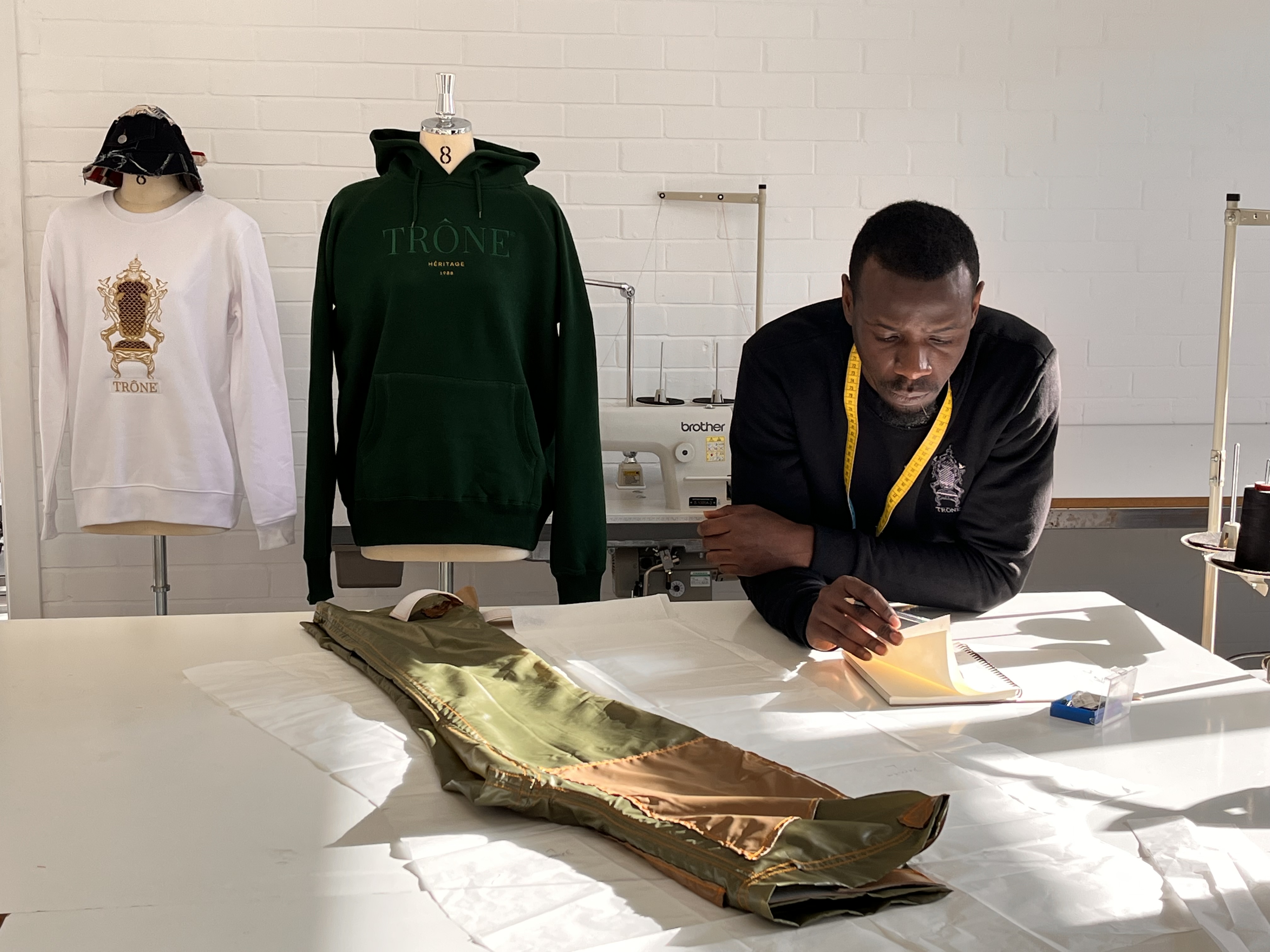
A maker member working in Bloqs’ fashion and sewing studio at its new open access factory. This facility first opened at their original space over the road at 4 Anthony Way in 2016. Photo: Elijah Serumaga.
Content producer Elijah Serumaga, Bloqs’ marketing manager since October 2021, calls Bloqs ‘a space of shared experience and shared knowledge. We also get the hobbyists who want to test out their new ideas. During lockdown a lot of people started working on their own projects at home and in their garages’, he says, and the Bloqs community was making more than 11,000 free visors for NHS workers. Bloqs offered business support to its members through the Culture at Risk Business support fund through a grant won from the Mayor of London.
Commissions for Bloqs’ members come from far and wide as well as from around the corner. Open innovation lab Green Lab used Bloqs to fabricate, prototype and build an urban farm concept with geodesic domes for a project in central London. The Wandsworth Community Food Bus was fitted out at Bloqs. The ‘Made At’ service harnesses the collective creativity of the maker members on bespoke commissions for clients. This year they made the Drummond Street Streetery in Euston for Indian restaurants with Camden Council’s support, designed by architect Jan Kattein, who, not far from Bloqs, is also converting derelict garages into affordable workspaces on the Joyce and Snell’s estate, and refurbishing its Fore Street Library, projects funded by £2.2m from the Mayor of London’s Good Growth Fund.
In the last two years Bloqs has scaled up the physical projects it’s delivered for other tenants and occupiers at Meridian Water, for example the three Troubadour Meridian Water film studios which opened next door to Bloqs in 2021 (with two more in the offing). Their arrival meant that the Bloqs, ‘a little lonely in its location’, as Parra puts it, suddenly gained neighbours they had a close kinship with. The film studios immediately commissioned Bloqs – a number of whose makers were already working in the film industry – to make and deliver all their entrance signage, as well as provide access to their facilities for a specific production.
Bloqs’ makers are also making street furniture for Vistry, developers of Meridian One, for the scheme. Parra would also very much like to have a relationship with the Construction Skills Academy the firm is delivering (which got planning permission last autumn) enabling hundreds of local people to gain the skills to start a career in construction. It looks like there’s plenty of scope for multiple partnerships across Meridian Water in the near future.
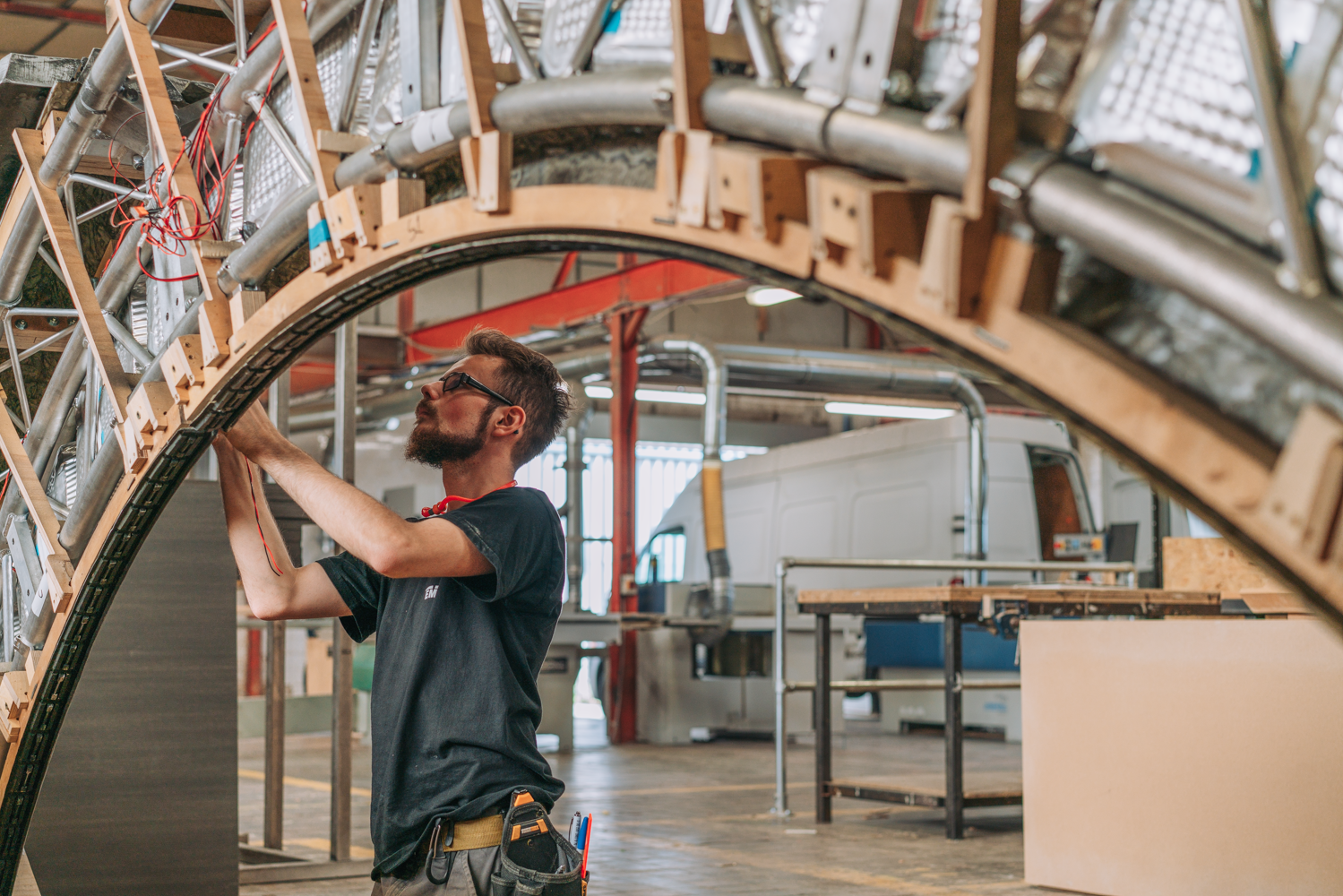
A Bloqs maker member working at the social enterprise’s first space at 4 Anthony Way. Photo courtesy of Building Bloqs.
Making the new building
For the building’s architect Tom Holbrook, director of 5th Studio, Bloqs has always been an ‘amazing macrocosm of ways of working’, an energetic place where ‘you’ve got to get the show on the road’, with a ‘very practical and opportunistic’ can-do attitude. He admires their pioneering ways. That includes ensuring the café is ‘not a burger van but somewhere civilised where you can stop working’, as well as take meals homes from, vital in an environment ‘where there aren’t really shops around you’.
‘It made me go gooey when I first walked in there’, he says of Bloqs’ first home. As someone who became an apprentice stage carpenter on leaving school, he found Bloqs exciting, with all that means of production and the bonhomie of a workshop. However as time went by improving their working conditions became a high priority.
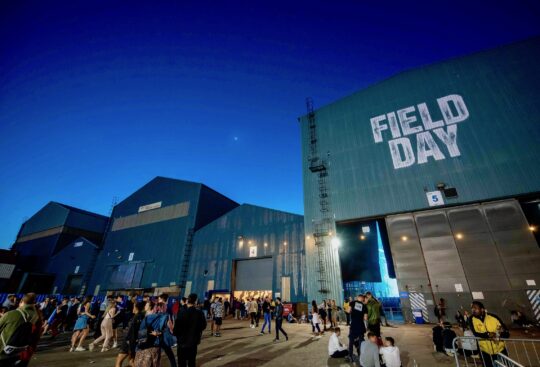
The Drumsheds live music venue launched in 2019 in the blue former VOC sheds, led by Broadwick, with programming that made a great impact on visitors. The buildings are Building Bloqs’ neighbours at Meridian Water, on the other side of the River Lea Navigation. Photo courtesy of Enfield Council.
A plan for Bloqs to expand and relocate to the blue sheds, originally built for BOC gasworks, nearby on the Meridian Water site was hatched but deemed unfeasible by the council due to land ownership issues. Instead the Drumsheds music venue opened in these, launching Meridian Water’s live culture offer in style. Broadwick’s music programming there from 2019 onwards, and recommenced after lockdown, was consistently exceptional and trailblazing, creating treasured lifelong memories of one of the best live music venues in London.
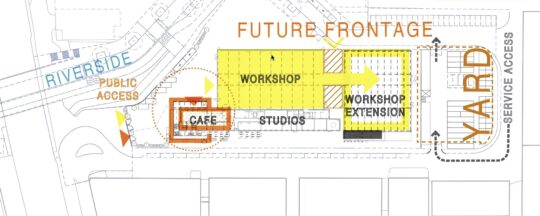
Plan of the new Bloqs’ open access factory, showing the repurposed building, new build structure, cafe, studios and two yards, an ensemble close to the River Lea Navigation. Architects 5th Studio. Image: 5th Studio.
The new strategy to develop Bloqs 2.0 began in earnest in 2018. A whirl of surveys, meetings and Gantt charts ensued, says Parra. 5th Studio was brought in, and offered an existing building at 2 Anthony Way to rework for Bloqs, which had a yard, very close to their premises at number 4 over the road. A former vehicle testing centre (VOSA) for the Department of Transport, it had been vandalised and stripped, and was due for demolition. A cheap structure, but it had fantastic big windows letting in the abundance of light Bloqs wanted. With a limited budget, they worked closely together to create a really good, big functional space out of design and build processes, an ensemble of the repurposed building and a new structure behind it with two working yards. The old VOSA site was stripped and refurbished, and Bloqs took on the fitout. They successfully pulled off the transition from a leaky, 10,000 sq ft building to the 30,000 sq ft full-blown factory – representing a tripling in scale – and Bloqs 2.0 was born.
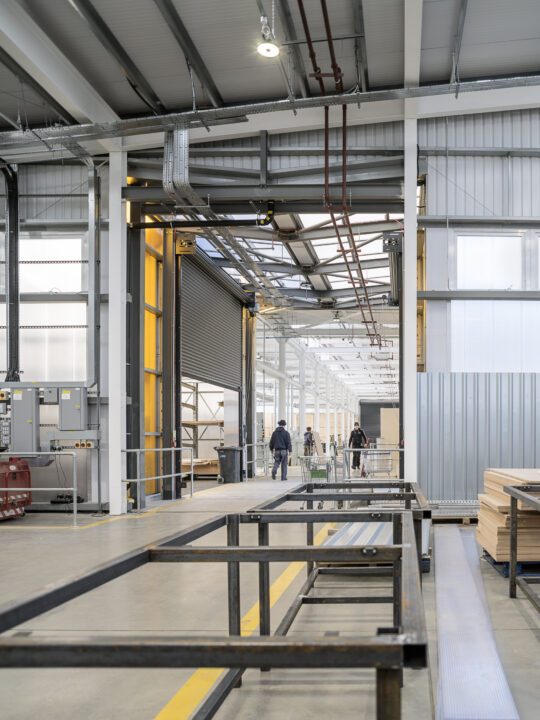
Looking down Bloqs’ airy, high ceilinged open access factory space designed by architects and urban designers 5th Studio. Photo: Timothy Soar.
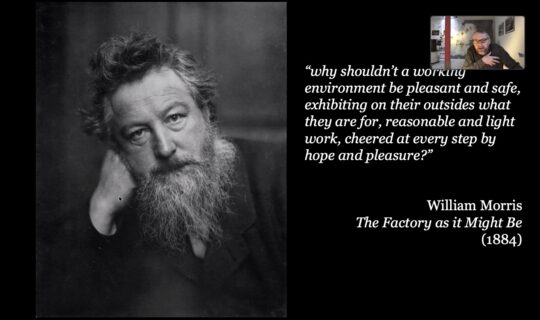
The 19th century UK Arts and Crafts movement design activist William Morris, who lived a short walk away from the Bloqs’ site, is a figure who strongly advocated for improved working conditions, says Tom Holbrook, director of 5th Studio, architects of the new Bloqs’ building (seen here speaking at NLA’s Makers Spaces, 4 March 2022).
Holbrook says that William Morris, the 19th century design, activist and doyen of the UK Arts and Crafts movement, a strong advocate for improved working environments, lived walking distance away from where Bloqs is now. ‘We wanted to have an enormous amount of natural light in the building, good smooth floors, plenty of access, and that’s what we’ve got’, says Parra. They took out the single glazing and put in polycarbonate panels to insulate the space, working with the building’s found qualities. To fully adaptably reuse it and create the scale of space needed, they added another industrial shed adjoining it to east of their design, with a palette of crinkly metal and standard roof lights and details.
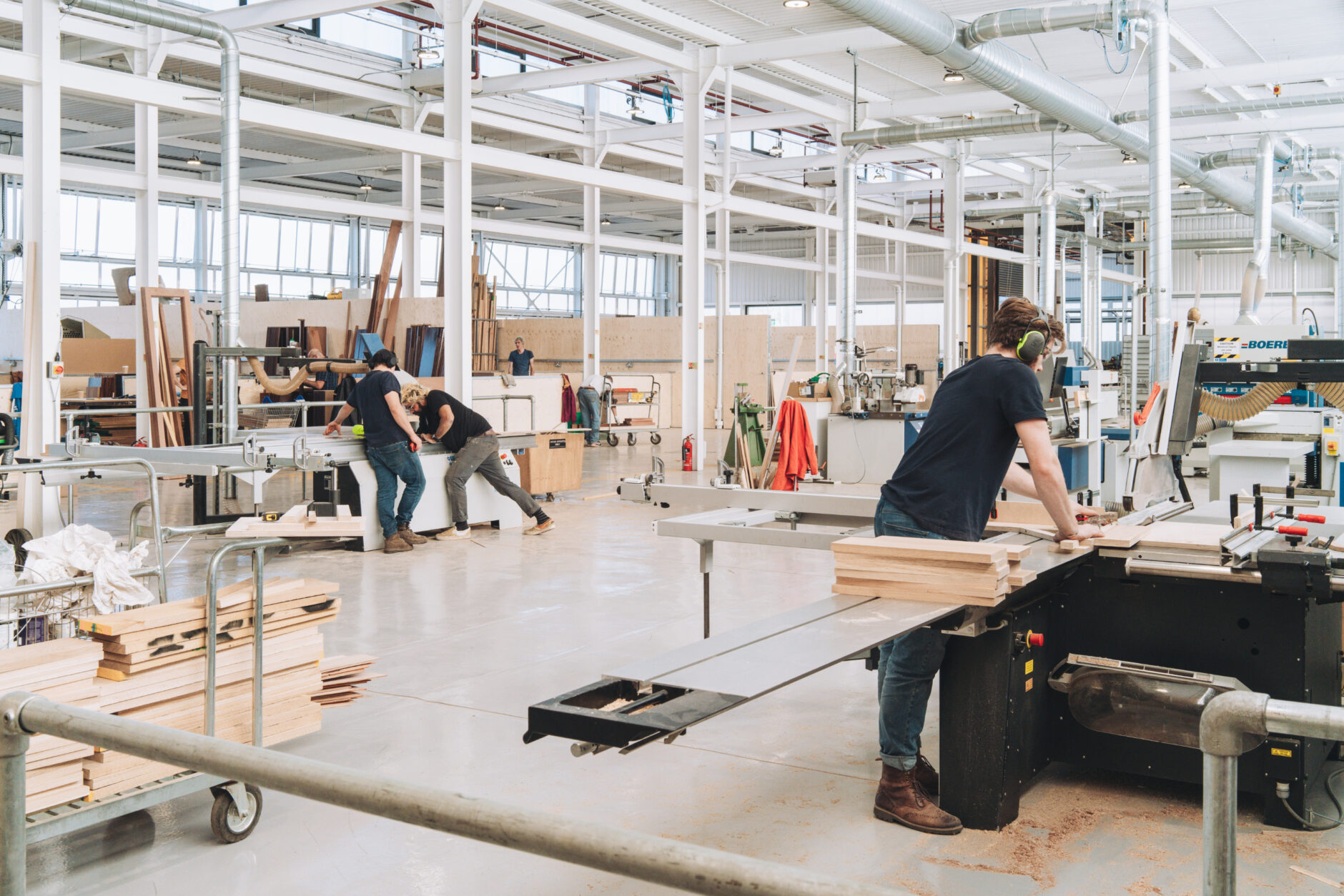
Maker members working in Bloqs’ new open access factory. Architects: 5th Studio. Photo: Claudia Agati.
The old building has new aluminium windows Bloqs sourced. When the design and build contractor left the site they retained all the polycarbonate and other waste for potential reuse. The bays for the workspaces are made of repurposed cross-laminated timber (CLT) from the Biscuit Factory in Bermondsey, for example, donated by Karakusevic Carson Architects (KCA). The practice is leading the architectural consortium engaged by Enfield last year for the Meridian Four mixed use phase where there’ll be 2300 homes planned nearby Bloqs, on the north and south sides of Meridian Water’s central spine road and bound by the Lee River Navigation.
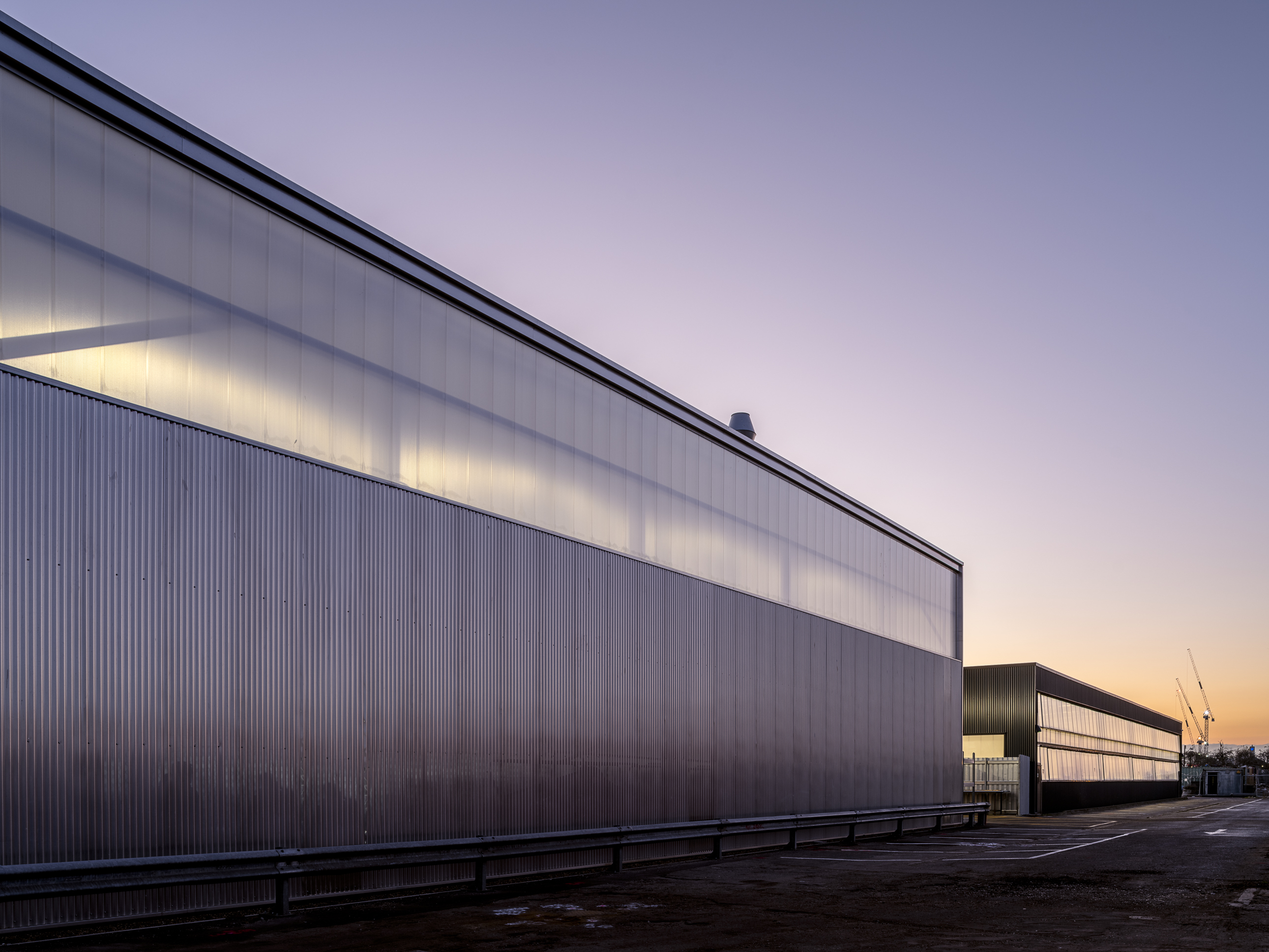
Eastern elevation of Bloqs’ open access factory designed by architects and urban designers 5th Studio has polycarbonate facade panels. Photo: Timothy Soar.
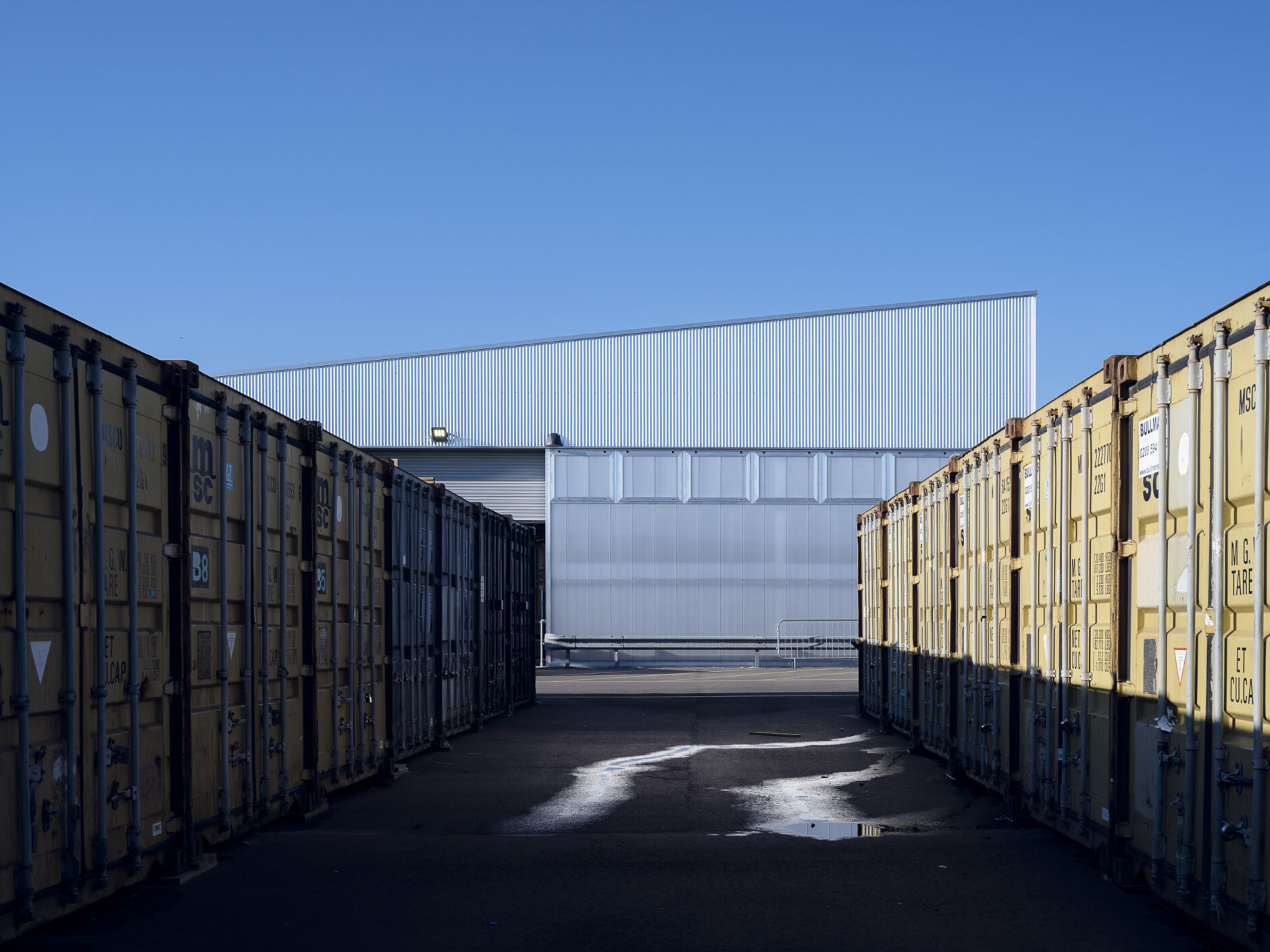
The east side of new Bloqs open access factory, seen from between the shipping containers on its site, resourcefully reused by the makers for storage, so they can clear their workspaces when needed. Photo: Timothy Soar.
At night the translucent polycarbonate panels on the façade give the building a glowing presence in the new frontiers land of its setting. ‘People come up from the Marshes and come and ask what it is, they’re intrigued’, Parra adds. On its Instagram feed Bloqs’ video of a car spin around the new building reveals the pared down industrial beauty of its external form and porousness of the new space to its surroundings.
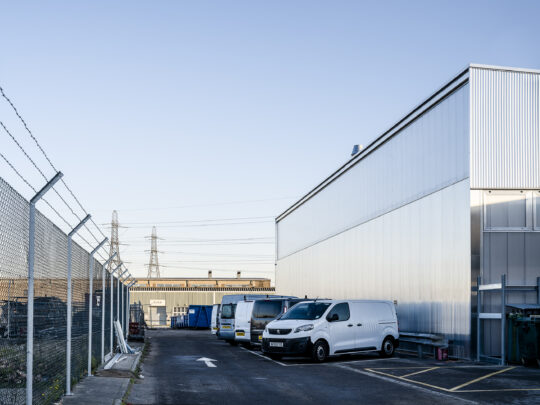
Touring the peripheral outdoor spaces around Bloqs’ open access factory. Architects: 5th Studio. Photo: Timothy Soar.
Bloqs’ mega spaces are ideal for people to see and connect with one another. They invite you to interact and mix, be curious and learn as you move around. ‘There’s so much space here. Low internal walls, open, plain, it’s good for conversations and networking’, says Serumaga. Like a hangar, it is high ceilinged, with 6.5 serviceable metres vertically, and direct access to a series of wide, open yard spaces which Bloqs use for their timber shop and where people can build sets or make sculptures.
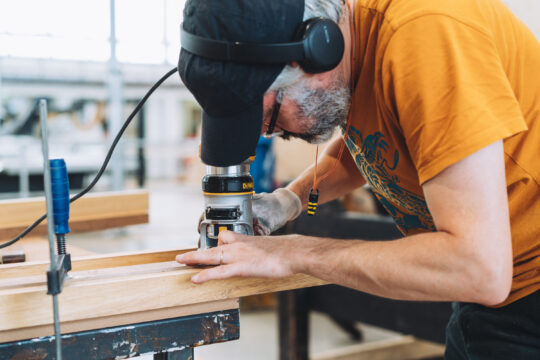
Hard at work at Bloqs’ new open access factory. Photo: Claudia Agati.
The new space provides a great opportunity to grow the member base. Over 350 businesses are actively using the facilities, and Parra anticipates increasing that to 500 or more within the next 12 months, if not sooner. Based on the pattern he’s observed since they set up Bloqs at Meridian Water in 2012, some of their maker members opt to stick with one or a few specialist fields as time goes by. However ‘most creative people have several strings to their bow’, and one of the things that make Bloqs’ new home so valuable is that it offers the possibility for makers to upskill as well as collaborate more ambitiously on projects.
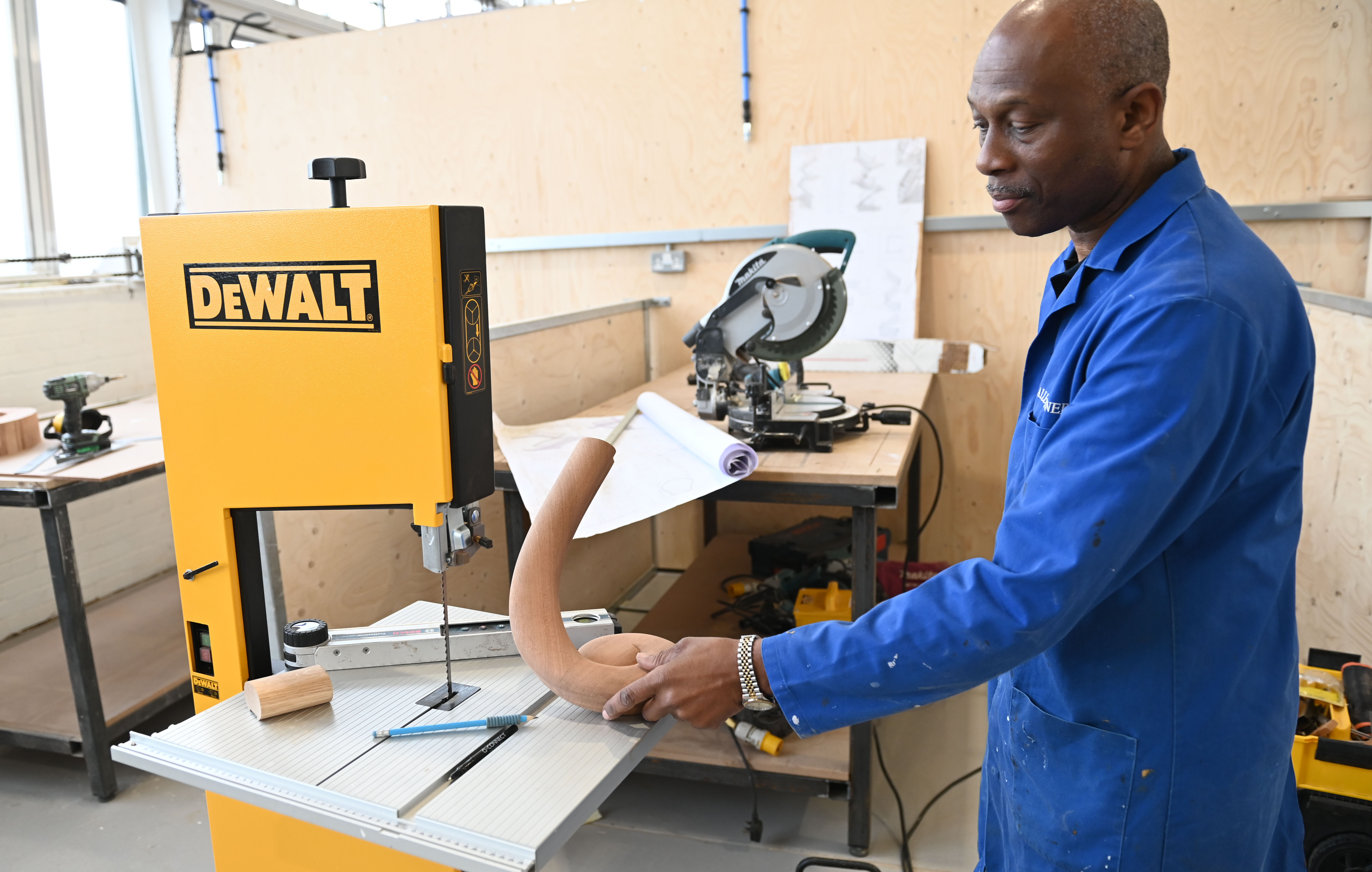
A maker member of Bloqs at work in the new open access factory. Photo: Stuart Wilson for Getty.
Liz Parker, who founded EP Studios in 2018, a group of makers from multiple disciplines providing services to the set design and events industry, who’ve been Building Bloqs’ members since then, thinks the new building is ‘brilliant – it’s one step up with more professional equipment, a really open and bright space, very easy to walk through’.
‘Everyone crosses over’ the disciplines at Bloqs, and makers help each other a great deal with each others’ work, something she feels the new building facilitates very well. Maker spaces are often quite male-oriented places, but Bloqs is by far the most helpful to and accepting of women makers she’s ever worked at, says Parker. EP Studios has a lot of women members and they all feel very comfortable working at Bloqs: ‘it’s a nice, clean environment. It’s really refreshing. They don’t feel intimidated’.
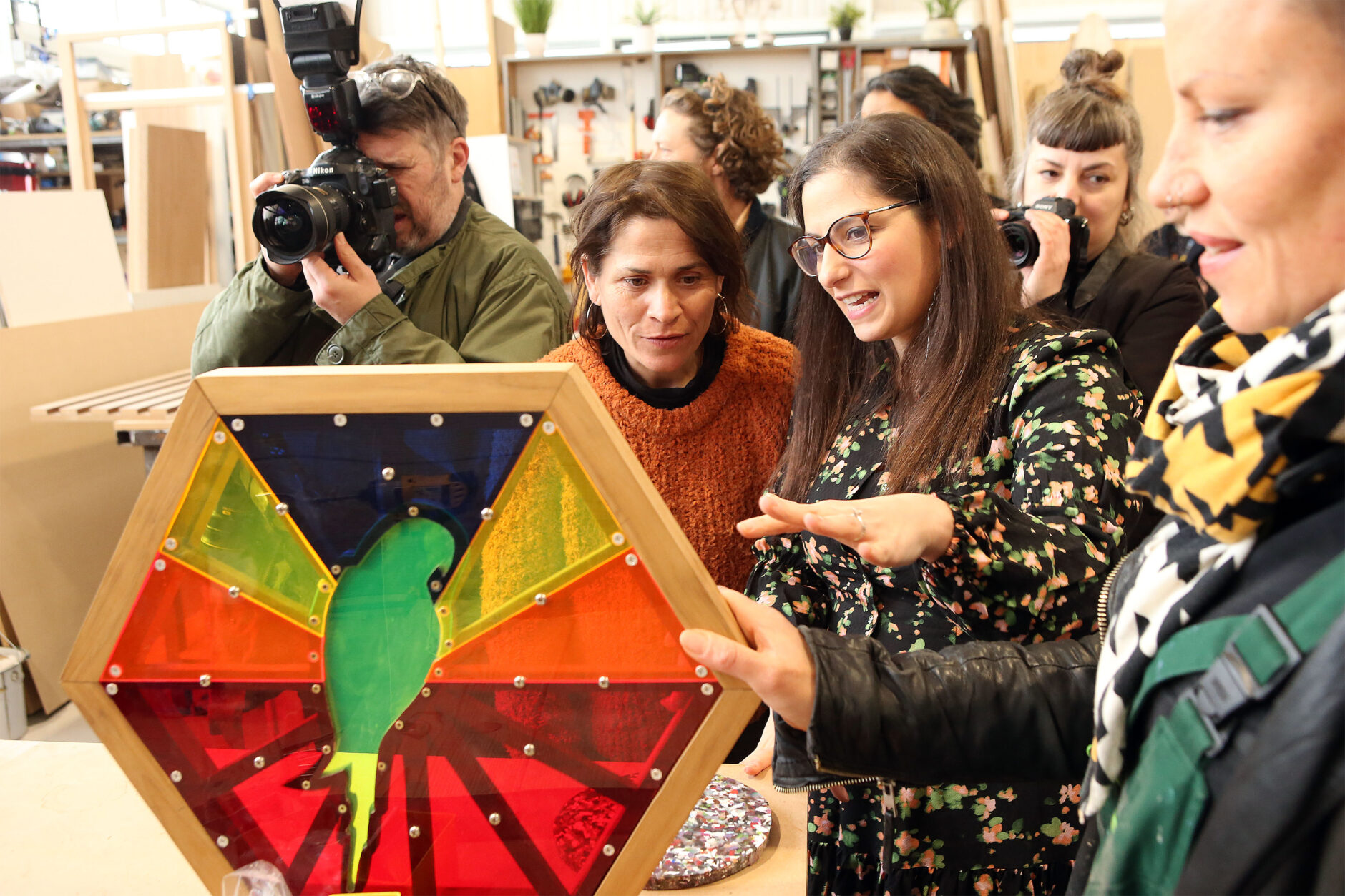
Marilo Seco, Workshop Manager, and Lizzie Fleming (right), founder, Made From Scratch, which creates adventure playgrounds, show their work to Nesil Caliskan, Leader, Enfield Council, at the launch of Bloqs’ new open access factory, 10 February 2022. Photo: Simon O’Connor; courtesy of Enfield Council.
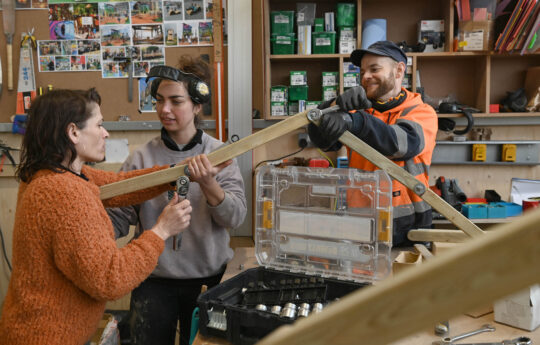
Marilo Seco and colleagues from Made From Scratch, one of the businesses with many team members working at Bloqs’ open access factory. Photo: Stuart Wilson for Getty.
The space and light in the new building are a real boon, says Lizzy Fleming, founder of Made From Scratch, which creates adventure playgrounds and has invested in hiring the firm’s own large, long term woodwork bay there for the next year. ‘Access in and out with materials is super smooth’, and you get ‘the same supportive community as in the old building, with advice, guidance across the different material disciplines’. Fleming and her team have been based at Bloqs for three years. Before they built everything from scratch on-site, and since joining they’ve been prototyping new items like ‘playable parcour’ furniture, woven oak nest pods and prefabricated treehouses.
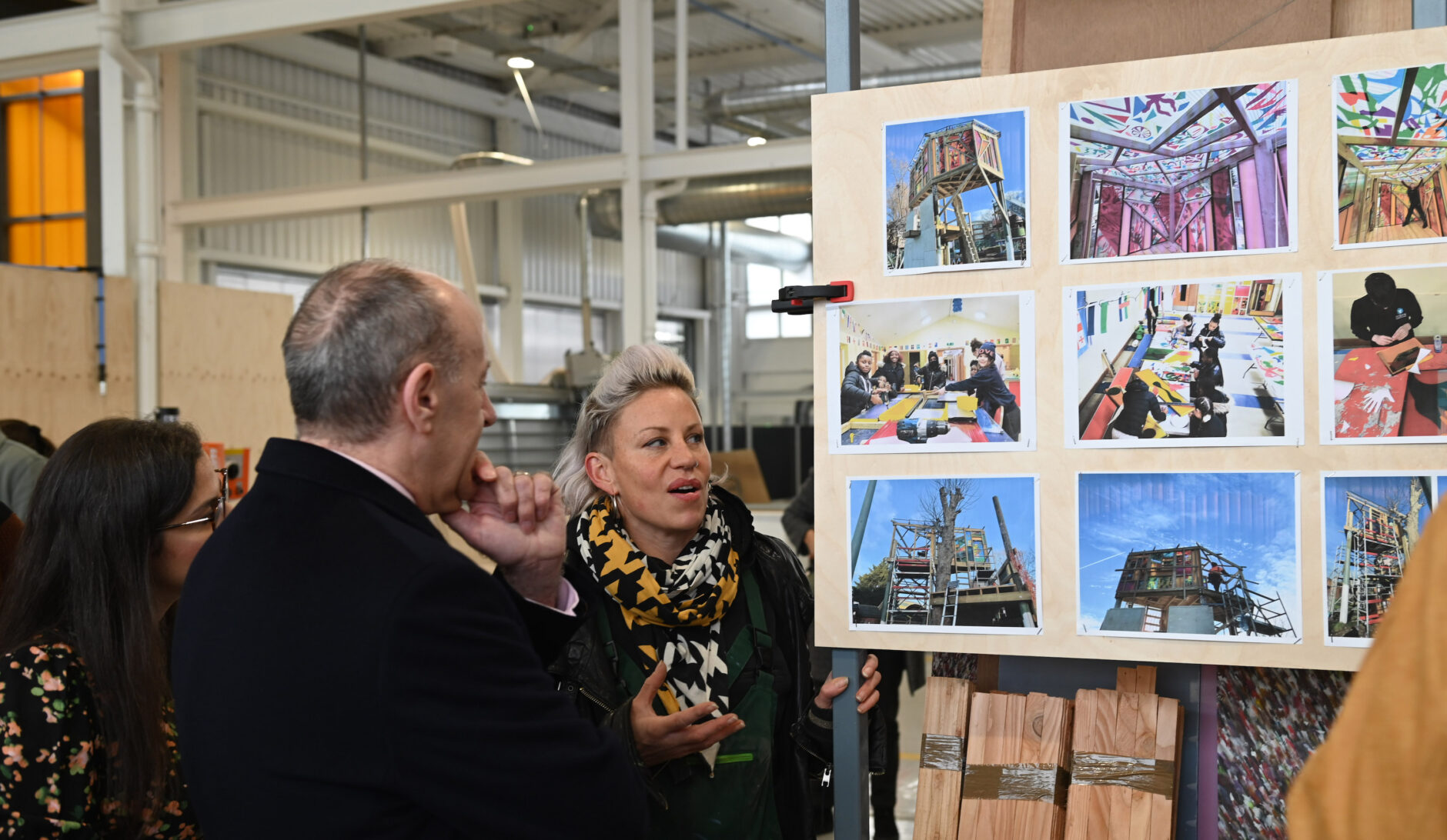
Bloqs’ maker member Lizzy Fleming, founder of Made From Scratch, shows the firm’s work to Nesil Caliskan, Leader, Enfield Council, and Jules Pipe, Deputy Mayor of London, at the launch of Bloqs’ new open access factory. Architects: 5th Studio. Photo: Stuart Wilson for Getty.
Adventure playgrounds are an ‘endlessly creative magical world but increasingly an endangered species in the built environment’, she says. Currently they have a female crew of their top carpenters working at a local Tottenham adventure playground creating a unique 4 metre-high ‘jewel’ treehouse co-built with local children, and using 100% donated materials including offcuts of the orange polycarbonate sheets that were part of Bloqs’ loading bay.
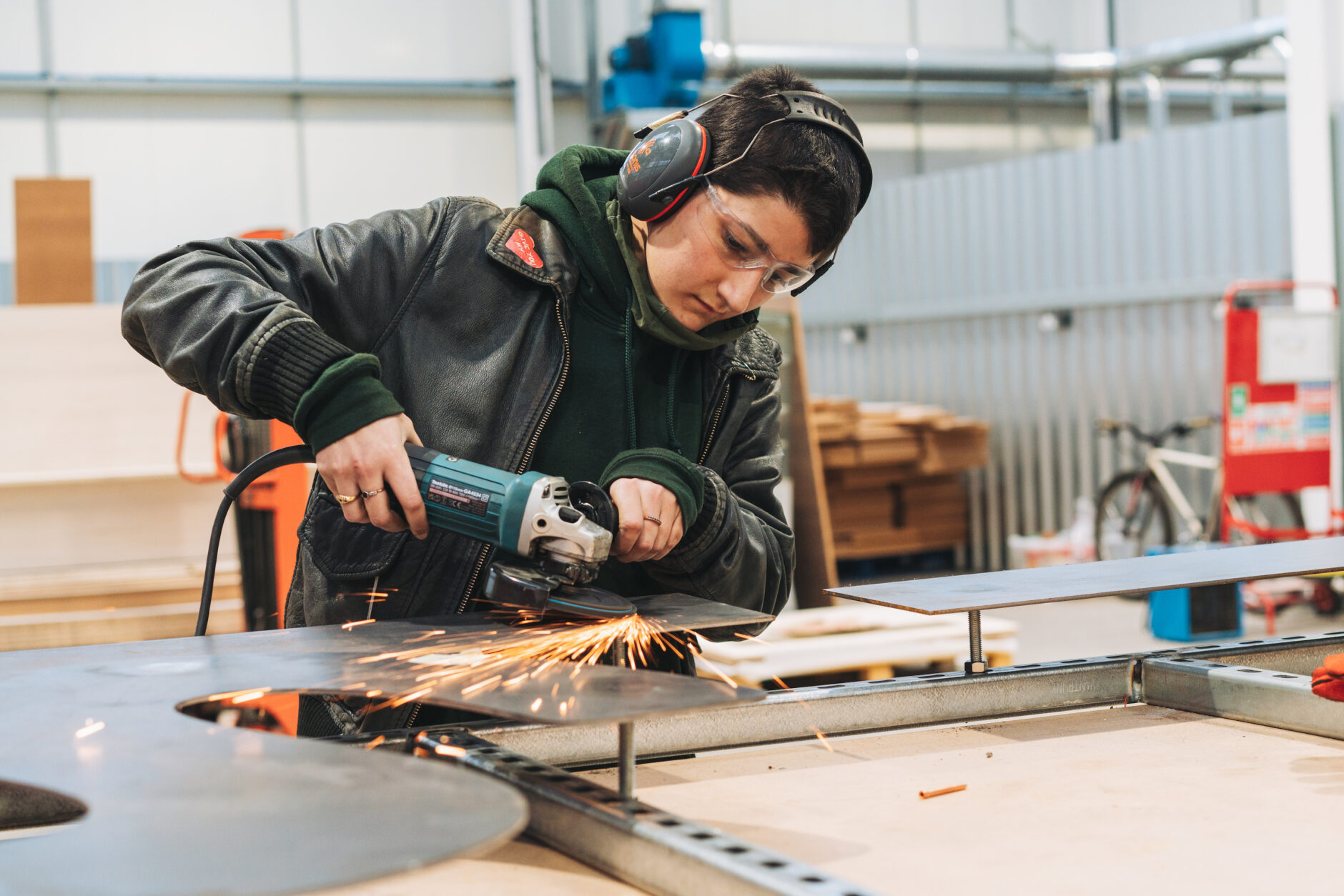
A maker member at work at Bloqs’ new open access factory. Architects: 5th Studio. Photo: Claudia Agati.
The social enterprise ethos of many Bloqs makers runs deep, and Made from Scratch in particular, ‘love working with communities’. They are bringing more children and local community groups to experience Bloqs as a resource they can be part of, starting by mobilising their Sisterhood project inspired by building the treehouse for those who see a future for themselves in design and build.
Moving across the road from their old building with their array of making machines, Bloqs have since taken delivery of £1.3 million worth of new light industrial equipment in the new space. The spacious new building’s tech roll call includes a huge array of additional machinery, like an edge banding machine, ‘so that kitchen fitters, cabinet and furniture makers will automatically edge their pieces and be able to compete with much larger firms and benefit from that’, says Parra.
The layout means makers can use shared timber and metal working spaces, and hire individual workspaces (by the day) towards the rear of the building, with spray and drying rooms on the south side. With good, even light, it not only enables makers’ great efficiency in work patterns, improving their environment and increasing their productivity. The space is warm – ‘warmth is very unusual in a lot of workspaces’, Holbrook said at NLA’s Makers Spaces webinar (4 March 2022).
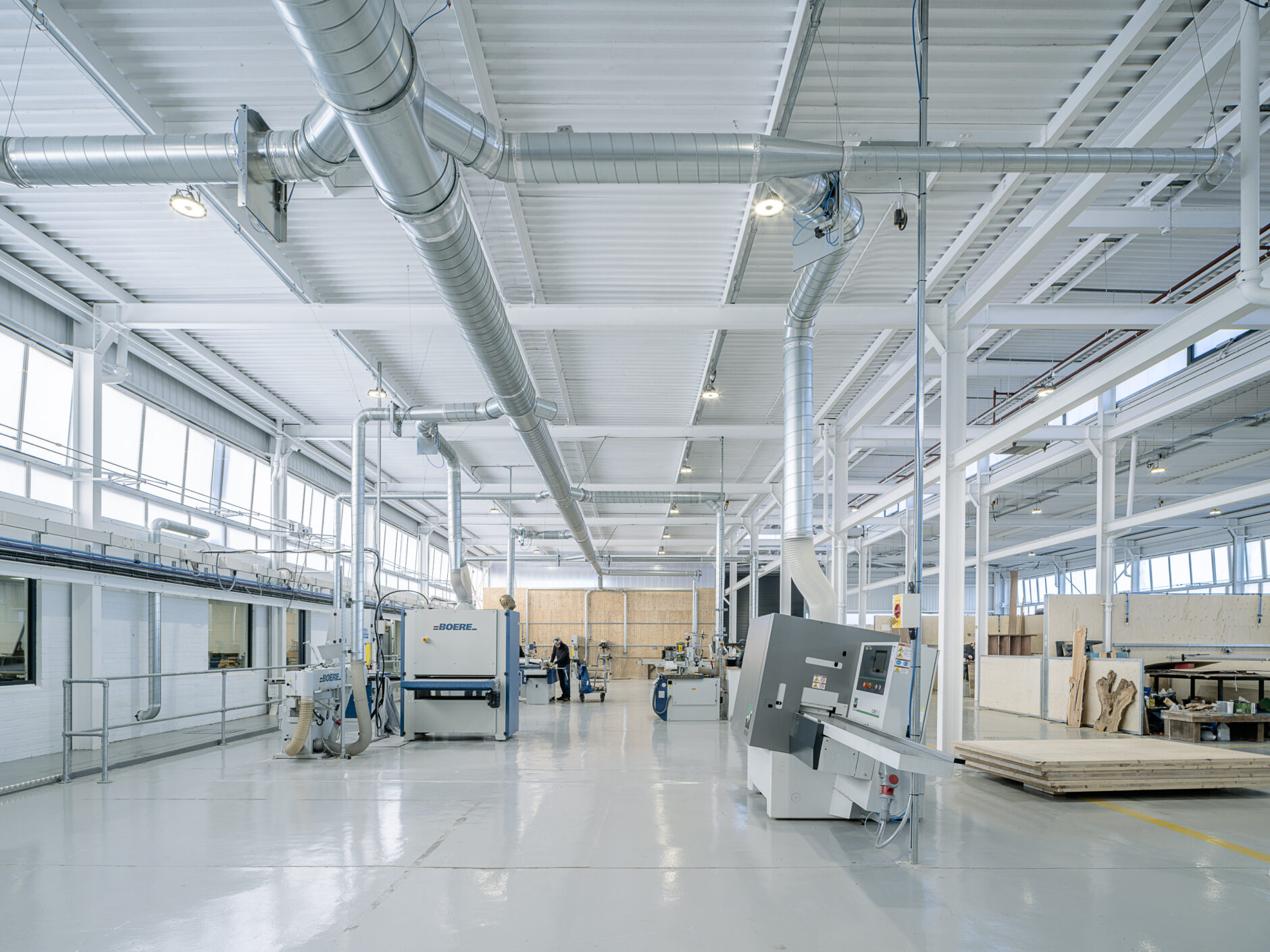
Looking along the south-facing side of Bloqs’ new open access factory kitted out with £1.3m of new light industrial equipment. Architects: 5th Studio. Photo: Timothy Soar.
The team is developing Bloqs’ CNC suite with a new Dynestic 7505 flatbed and a 5-axis CNC router, another leap forward in flexible, creative making possibilities, expanding the versatility of their machines, and bespoke training for using them. These state-of-the-art items have come through Bloqs’ partnership with equipment makers like Weinig UK/Holz-Her UK. The firm loves the idea that talent in the industry can be developed as they train lots of fledging businesses to master their equipment which some of them are in turn going to buy themselves.
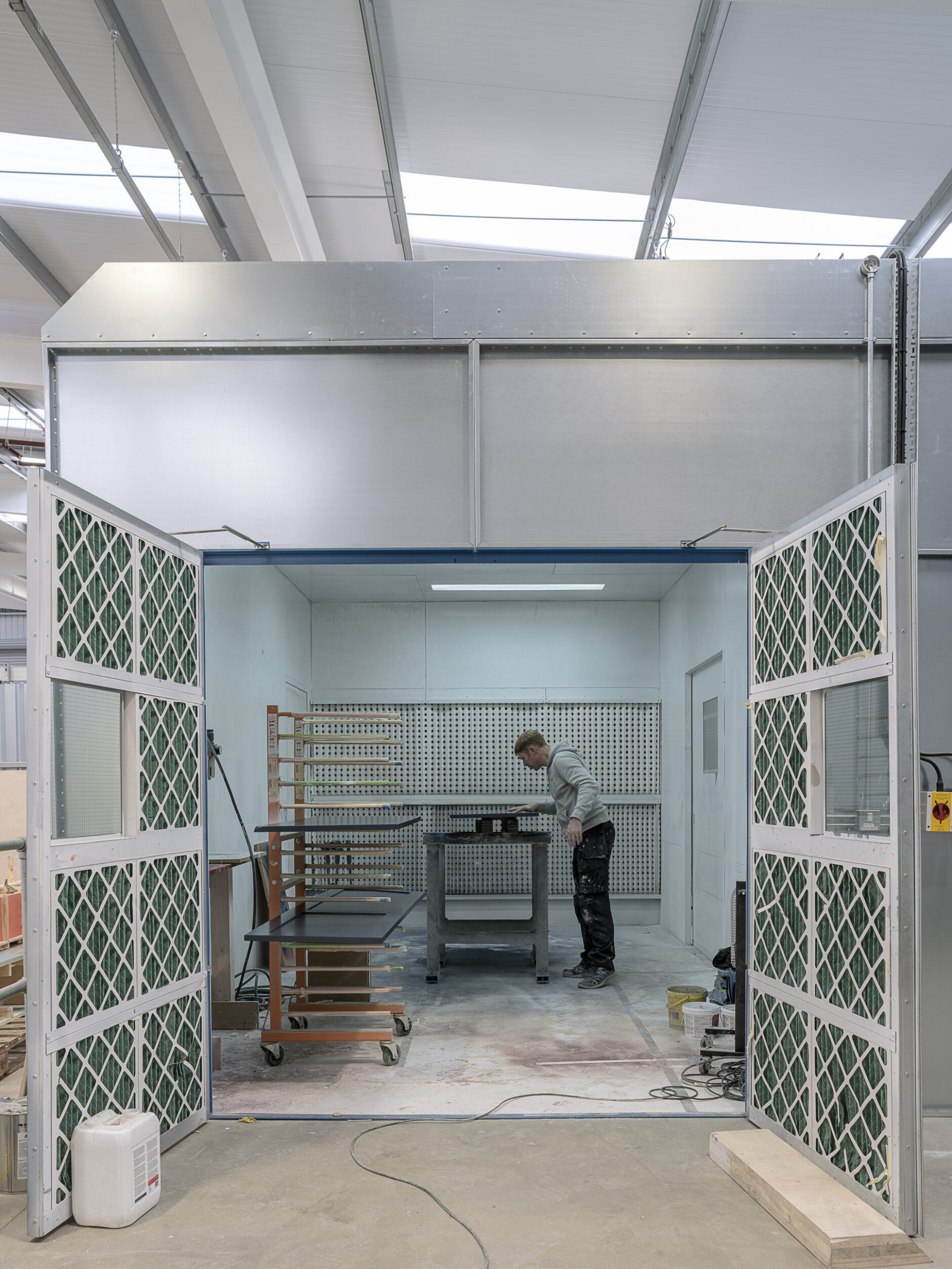
One of the spraying and drying rooms adjoining the main space of Bloqs’ open access factory. Architects: 5th Studio. Photo: Timothy Soar.
Also, while most of the new space is for fabrication, with Bloqs’ engineering department added in 2019 – the year membership passed the 1000 mark – product designers, designers and engineers can now make components. ‘A vast panoply of things becomes possible’, says Parra. Now in the new factory there’s woodworking in one area, metalworking in another – where Bloqs’ brand new sign was made – digital printers and sewing machines in their own spaces on the southern side of the complex, where there’s a row of meeting rooms in which workshops can also be staged. In parallel outside a row of scruffy shipping containers is being fitted out as offices, with one for Enfield Council. ‘It’s always wonderful when the landlord moves in’, says Parra. ‘Shall we charge them rent?’, he jokes.
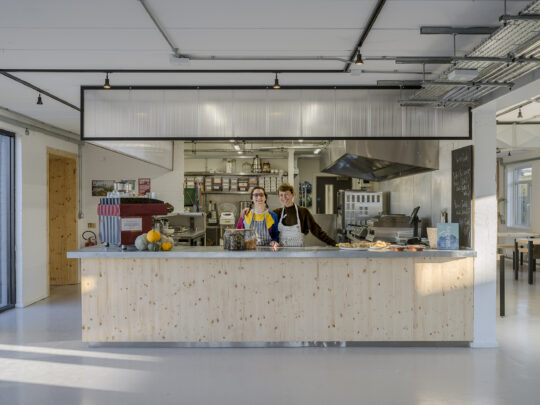
The Bloqs Kitchen Bar Deli serves mouth-watering affordable Mediterranean dishes, and is open from 8am-3:30pm, Mon-Sat. Photo: Timothy Soar.
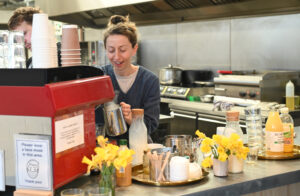
The Bloqs’ Kitchen Bar Deli servery. Photo: Stuart Wilson for Getty.
And to refuel, relax, network and fire up ideas with others, or simply work from a laptop, there’s the Bloqs café, from the beginning the social heart of the enterprise. Now it has a much bigger footprint as Bloqs’ Kitchen Bar Deli for eating, networking and co-working, open to the public (8am-3:30pm, Mon-Sat), and run in style by new executive chef Marianna Leivaditaki, formerly head chef at Morito and Moro restaurants, and author of Aegean: Recipes from the Mountains to the Sea featuring her native Cretan cooking (2020).
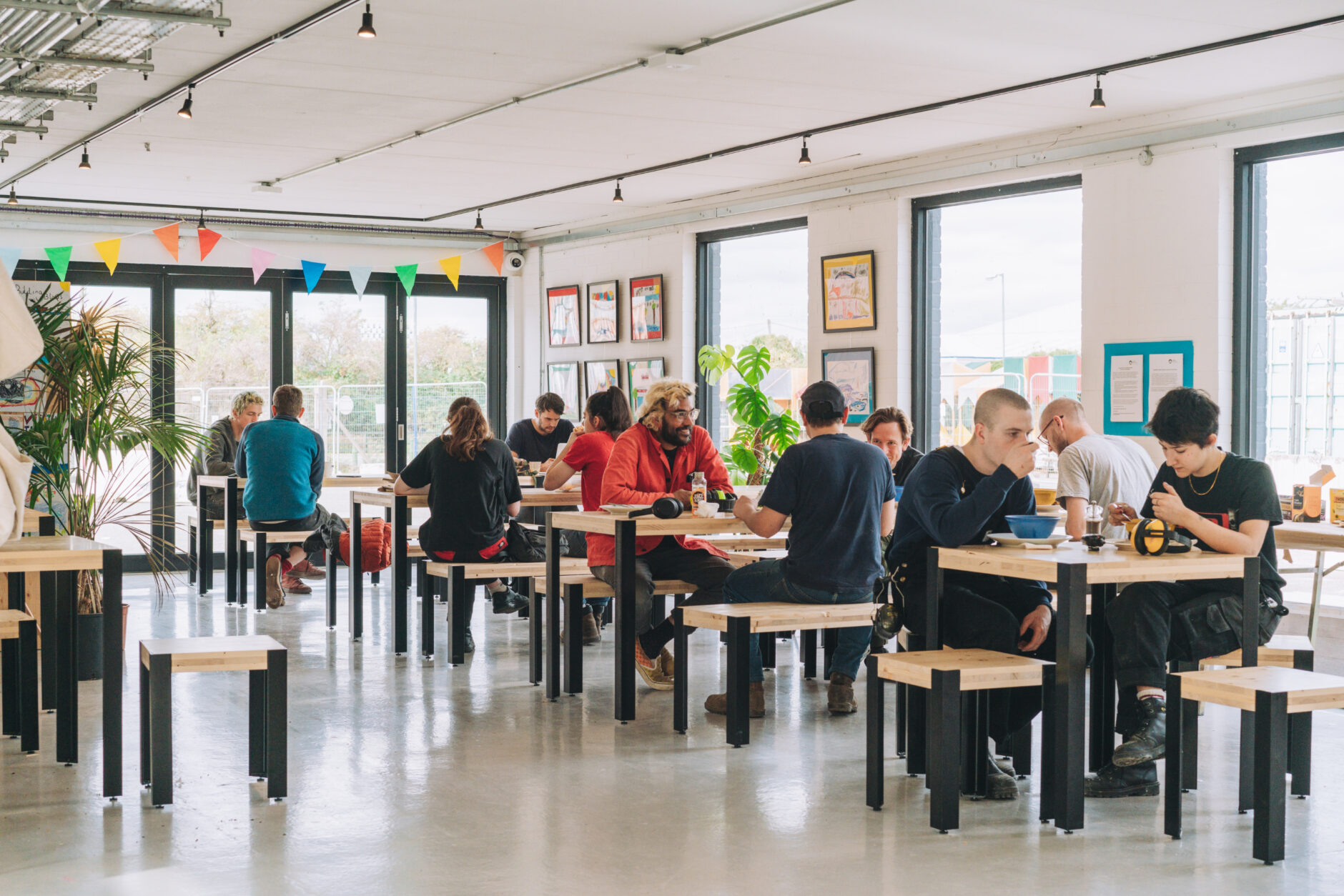
Bloqs Kitchen Bar Deli for meals, networking and co-working is open to its maker members, partners and the public from 8am-3:30pm, Mon-Sun. Photo: Claudia Agati.
The airy and bright eating space at the front of the building, where she often works at her laptop, opens out onto an outdoor space for socialising, with seating, planters and an stage where BloQs will host music events and performances. ‘I met Bloqs’ founders when they were tiny and knew how difficult it was’, she says. I have so much respect. I’m very in synch with what they’re doing. I think this can become a great community hub. People in this area don’t have many places to go’, she says.
Marianna’s introduced a delicious new Mediterranean menu with a take away deli service, and beer on tap. ‘I cook very simple food. It’s important to keep it accessible and give people an extra experience’. They ‘get a healthy lunch, the vibe is good. Loads of people come and say, I could never leave Bloqs now, you’re turning me into a health freak!’.
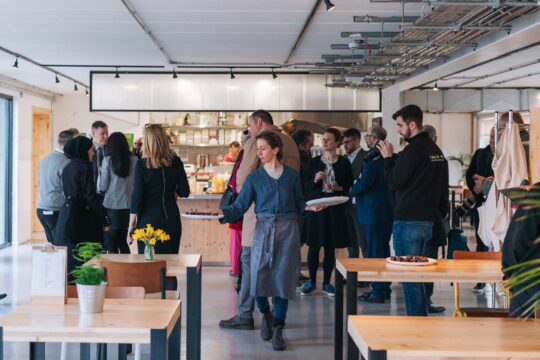
The Kitchen Bar Deli at Bloqs’ new open access factory on launch day, 10 February 2022. Photo: Claudia Agati.
She’s got parties, private hires, special events including weddings on her agenda for Bloqs. They are going to be using the space for evening seminars. Options will expand. Valentine’s Day meal boxes were on sale, for example. ‘I’m asking what people want, getting feedback, it’s all about a continual conversation’. Opening for business at 8am in the morning she regularly finds a queue of film production staff from the next door studios waiting to get their takeaways. Just earlier a wild bird photographer dropped in, boaters regularly come in from the Lea Navigation just in front of BloQs.
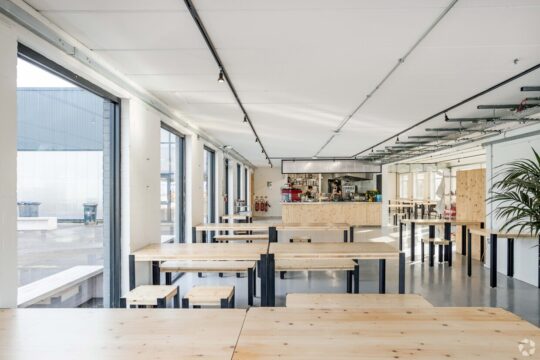
Bloqs’ Kitchen Bar Deli at its new open access factory. Photo: Amelia Hallsworth.
Her new home is perpetually stimulating. ‘There’s great minds here, so there are great ideas. With everyone you speak to, you either learn something or you have a really good chat’. Her passion for what she does here underlines the fact that there are few spaces like this in London where the creative worlds of cooking and making intersect like this, and even fewer which are open to the public.
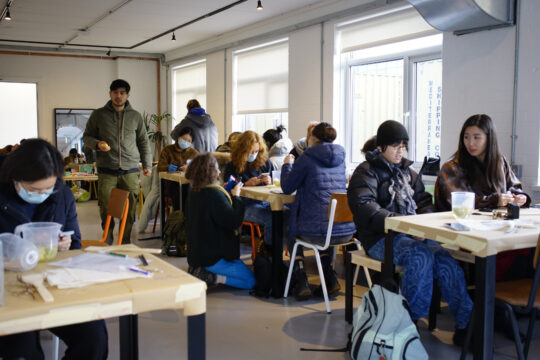
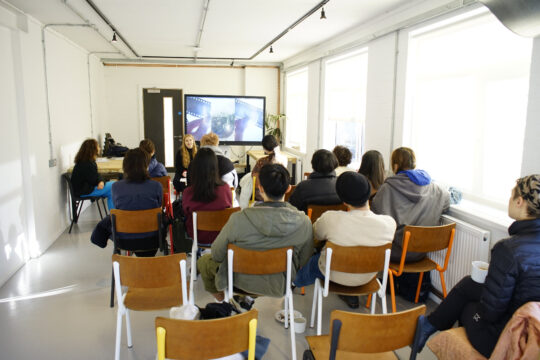
The Foraging and Sustainable Photography workshop led by artist Kathryn Atrill at Bloqs’ new open access factory in one of its meeting spaces, 4 December 2021. Photo: Elijah Serumaga.
Now that Bloqs has a series of workspaces there’s also a versatile base for an expanded range of workshops and other educational activities. For example, the Foraging and Sustainable Photography workshop held on 4 December 2021, led by artist Kathryn Atrill, roving the nearby Tottenham Marshes, cameras in hand benefitted from plenty of space to work and Bloqs’ great catering facilities to hand. Providing hands-on experience of foraging and the sensory process of creating analogue film developers from plants and household materials, the workshop is an introduction to sustainable photography and image making processes in the ecological crisis. December’s event proved very successful and Kathryn will hold another one on Saturday 12 March from 10:00am, based at Bloqs, booking details here.
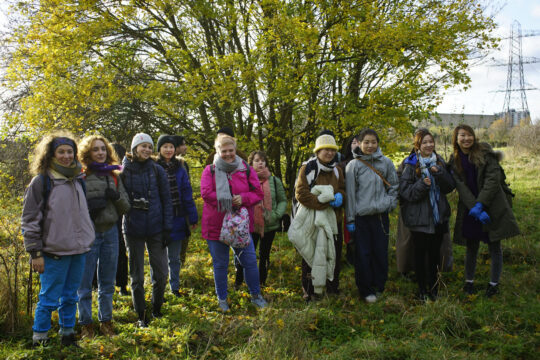
Participants in the Foraging and Sustainable Photography workshop led by artist Kathryn Atrill at Bloqs’ new open access factory in one of its meeting spaces, foraging in the nearby Tottenham Marshes, 4 December 2021. Photo: Elijah Serumaga.
Bloqs’ members have a lot of memories of good times in their homely original space on Anthony Way, for which Enfield is now looking to find a new tenant. ‘A lot of people just enjoy the sociability of Bloqs’, Parra adds, ‘of knowing faces. Lots of our makers work for themselves, and that would commonly mean that they don’t have colleagues, or see people on a regular basis as they might be secluded. The difference here is that there are a lot of people you get on with and get to know. The makers can commission each other and pull together teams to do bigger jobs which they wouldn’t have otherwise been able to do’, he explains. ‘They socialise together, break down the barriers; once they’ve done that they can interact and do business with each other’.
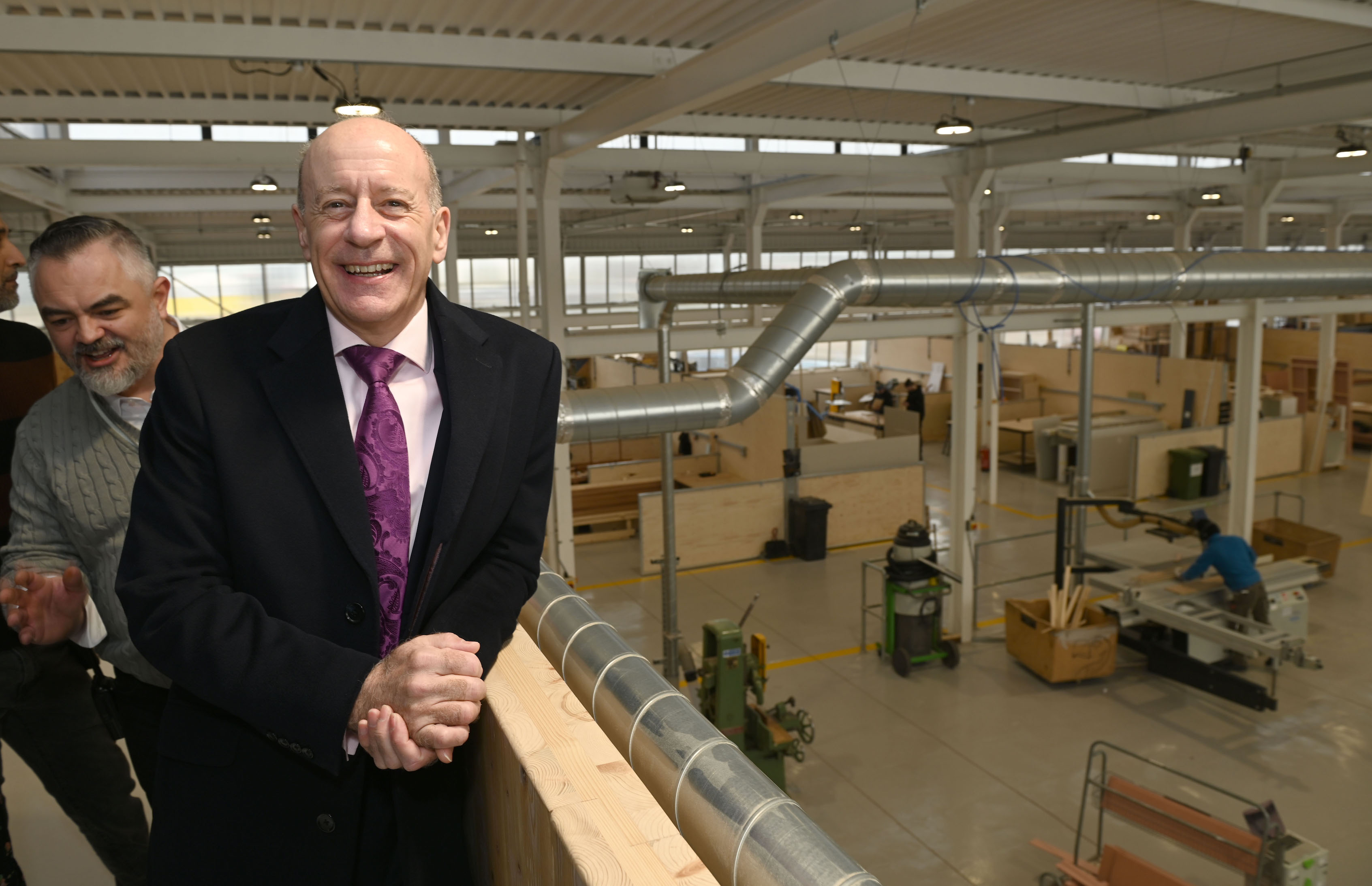
Jules Pipe, Deputy Mayor of London, with Al Parra (left), one of Bloqs’ co-founders and directors, enjoying the atmosphere of the new open access factory at Meridian Water. Photo: Stuart Wilson for Getty.
Toby Larkin, a carpenter member, says that in the three years since he’s been a Bloqs member he’s learned more than in his previous ten years of work. ‘Everyone shares here – that’s how you learn’, says Steph Leake, a furniture maker member. Clare Graham is a furniture and product design student on a 9 month placement at Bloqs from Nottingham Trent Uni. ‘Everyone’s really friendly’, she says. Steph loves the fact that there’s ‘more light’ and more seating in the café. Going forward she’d like to see Bloqs open in the evening on one or two nights (it’s open from 8am, Monday to Saturday; and closes at 6pm).
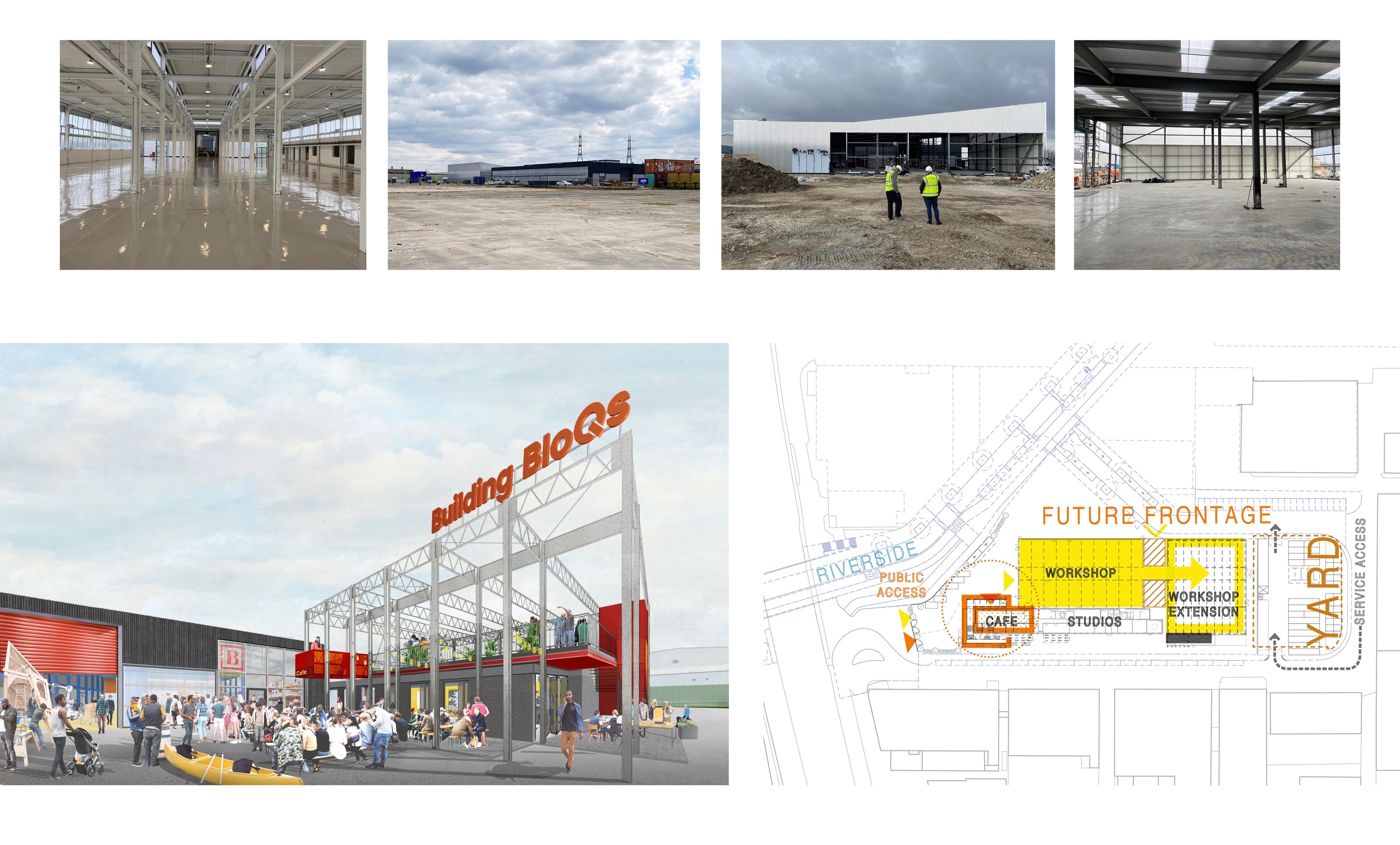
The new Bloqs’ open access factory designed by 5th Studio was conceived by the architects as a way of kickstarting regeneration at Meridian Water. Photos, visualisation and plan of the layout: courtesy of 5th Studio.
Bloqs are ‘very strong at fostering a sense of community. Having a really good quality canteen and rest areas, providing opportunities for collaboration and networking, so their members don’t feel Bloqs is simply a place of employment, they feel part of something bigger’, says George. ‘I think a stronger community is always one that has regard for diversity and Bloqs are committed to reaching beyond those who might traditionally work in such a place, and that is something they’ve made progress on but remains a work in progress’, he says. ‘Bloqs want to raise their profile within the borough, and this is viewed and seen and felt by people here as a company and organisation that they’re proud of, and enjoy going to for either the food and culture or even to work. Creating the really strong ties into the community is something they’ve started to do now. It will take time’.
Educational synergies
With the word out about the new space up and running, Bloqs is attracting visits by teaching staff in the further education sector. Product/3d design departments have lost so many technical studio spaces over the years, and, with such a drought of facilities they need, Bloqs’ accessibility and versatility is very appealing. Not only have the staff been coming into Bloqs to train on their expanded array of equipment; they then deliver training to their students. Royal College of Art fashion postgraduate students say the facilities outdo what they’ve had in the past at undergrad level. One further education college is talking to Bloqs about hiring their whole engineering department for at least one day a week. Bloqs’ engagement with schools and FE colleges is ‘slowly building and will only gather momentum’, says Freshwater.
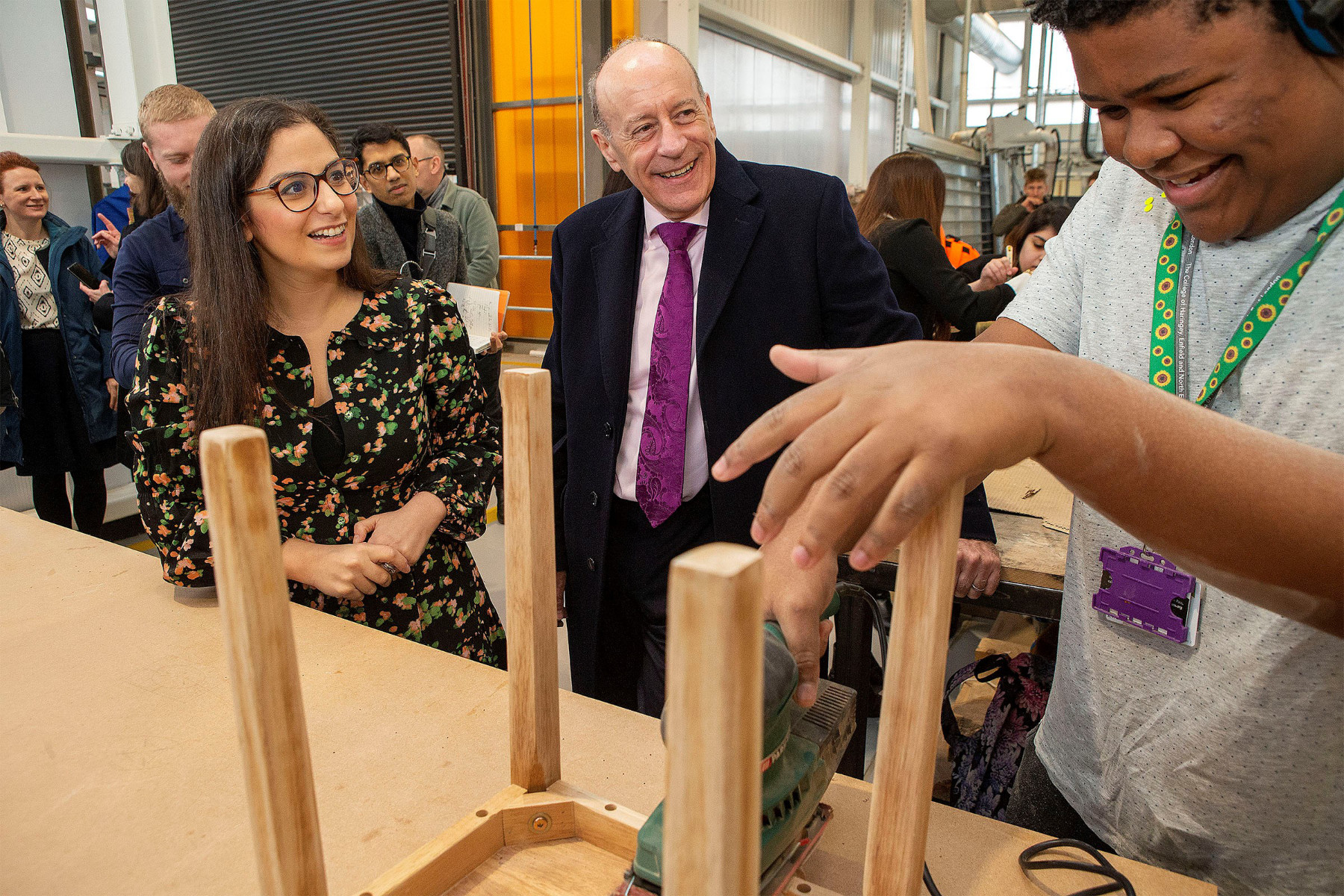
At the launch of the Bloqs’ open access factory on 10 February 2022, Cllr Nesil Caliskan, Leader of Enfield Council, and Jules Pipe, Deputy Mayor, talk to a student from West Lea School, based on three campuses locally and catering for students with special educational needs. Bloqs teaches DIY to the School’s students, who refurbish furniture to sell in their charity shop. Photo: Simon O’Connor; courtesy of Enfield Council.
As a maker member, Parker is very aware of the fact that Bloqs gives back to the local community, supporting education, jobs and livelihoods. ‘They do a brilliant job teaching DIY to special needs pupils’, she observes, referring to the partnership Bloqs has with West Lea School, which is based on three campuses locally in Upper Edmonton, and caters for students with special educational needs.
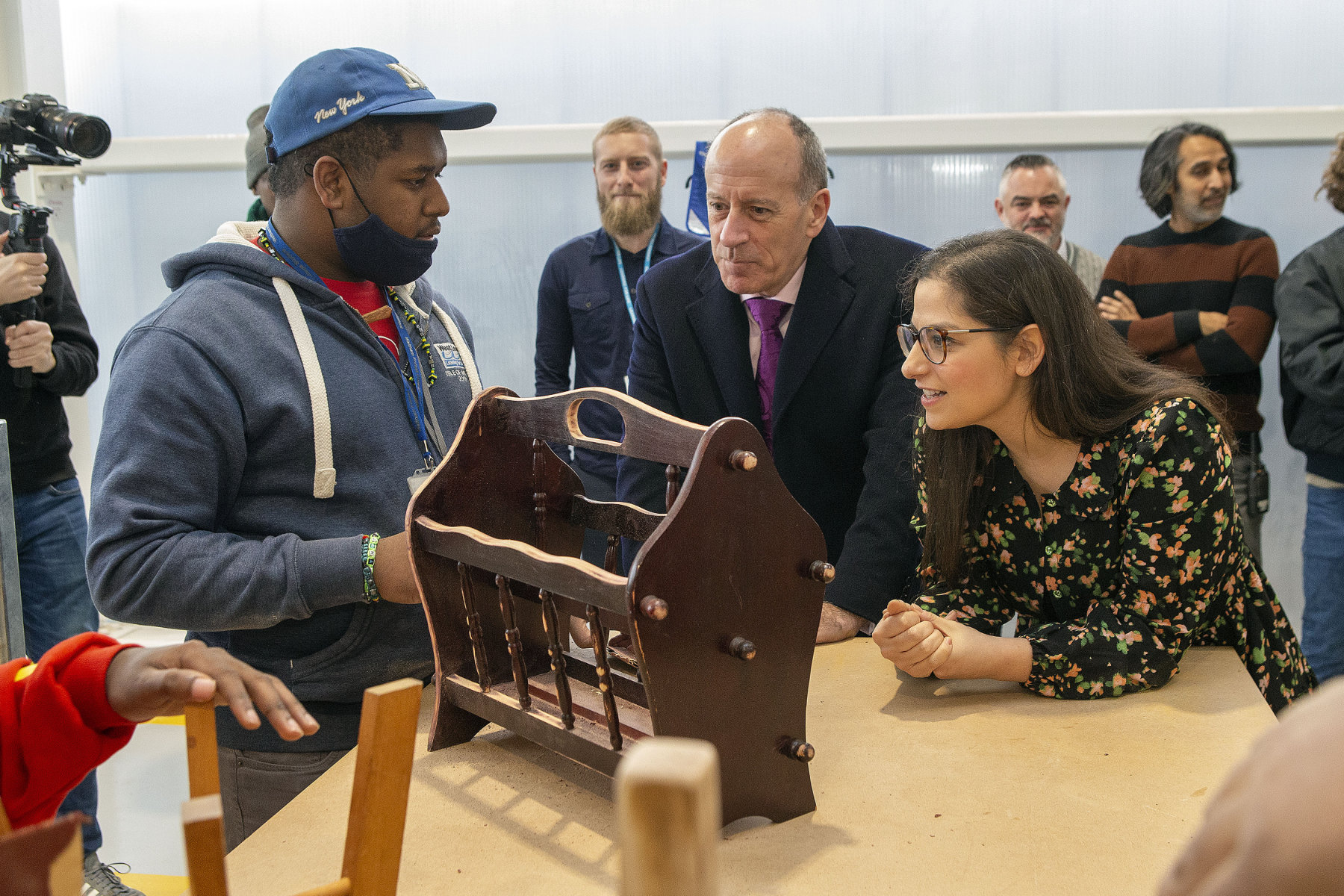
At the launch of the Bloqs’ open access factory on 10 February 2022, Cllr Nesil Caliskan, Leader of Enfield Council, and Jules Pipe, Deputy Mayor, talk to a student from West Lea School, based on three campuses locally and catering for students with special educational needs. Bloqs teaches DIY to the School’s students, who refurbish furniture to sell in their charity shop. Photo: Simon O’Connor; courtesy of Enfield Council.
Schoolchildren from West Lea refurbish – upcycle – furniture they sell in their charity shop, for donations. ‘It’s a really cool model. Children get exposed and in tune with making’, says Serumaga. As part of its ‘Learning for Life’ vocational training, the school has now set up a new printing enterprise with Bloqs, and collaborate with Vistry and Taylor Woodrow, one of the firms delivering the infrastructure works, making some of their PPE which will be used at Meridian Water.
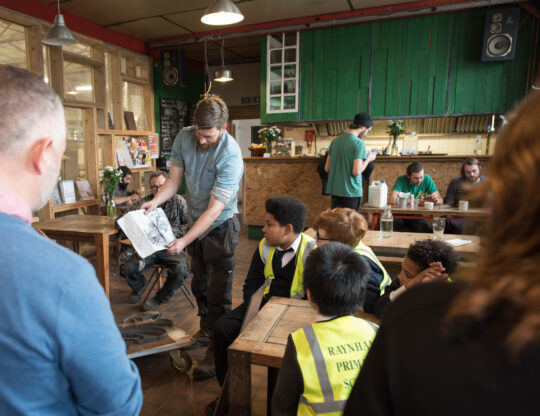
Schoolchildren from Raynham Primary School visiting Bloqs’ original space at 4 Anthony Way. Photo courtesy of Bloqs.
Groups of schoolchildren from Raynham Primary School in Upper Edmonton, to the west of the site, have regularly visited over the years, enjoying the experience of watching makers at work and deepening their own creative skills. They see what amazing things can be done using machines like flatbed CNC routers and vertical panel saws, and often get given a fun opportunity to upcycle smaller items. Recently pupils have also enjoyed doing drawing sessions outside by the canal as part of workshops arranged with Canal River Trust and Hinterlands London.
Some of these children and young people go on learn to use this versatile equipment when they are old enough. ‘The biggest thing with a project like this is that we have a real opportunity here to inspire kids who are 5, 10, or whatever, to say, and in 20 years’ time when they are 25, this will be here, a ‘motoring’ place on your doorstep, with workspace, employers, a myriad of opportunities, apprenticeships, learning, film studios. I think Bloqs, as a real touchdown space, can be a real catalyst for some of that learning’, says Freshwater.
Bloqs, a location in evolution
From Parra’s perspective, Bloqs, once a remote place, is now ‘on the waterside with visibility to future residents, the boating community, to walkers and cyclists who can see us and watch us develop as a space they can participate in and be part of’. Bloqs will increasingly bring a hive of activities to the river, opening it up and making these spaces feel safe. As things progress, they’ll continue supporting Meridian Water’s broader biodiversity efforts with tree areas and other more permanent landscaping areas around the building.
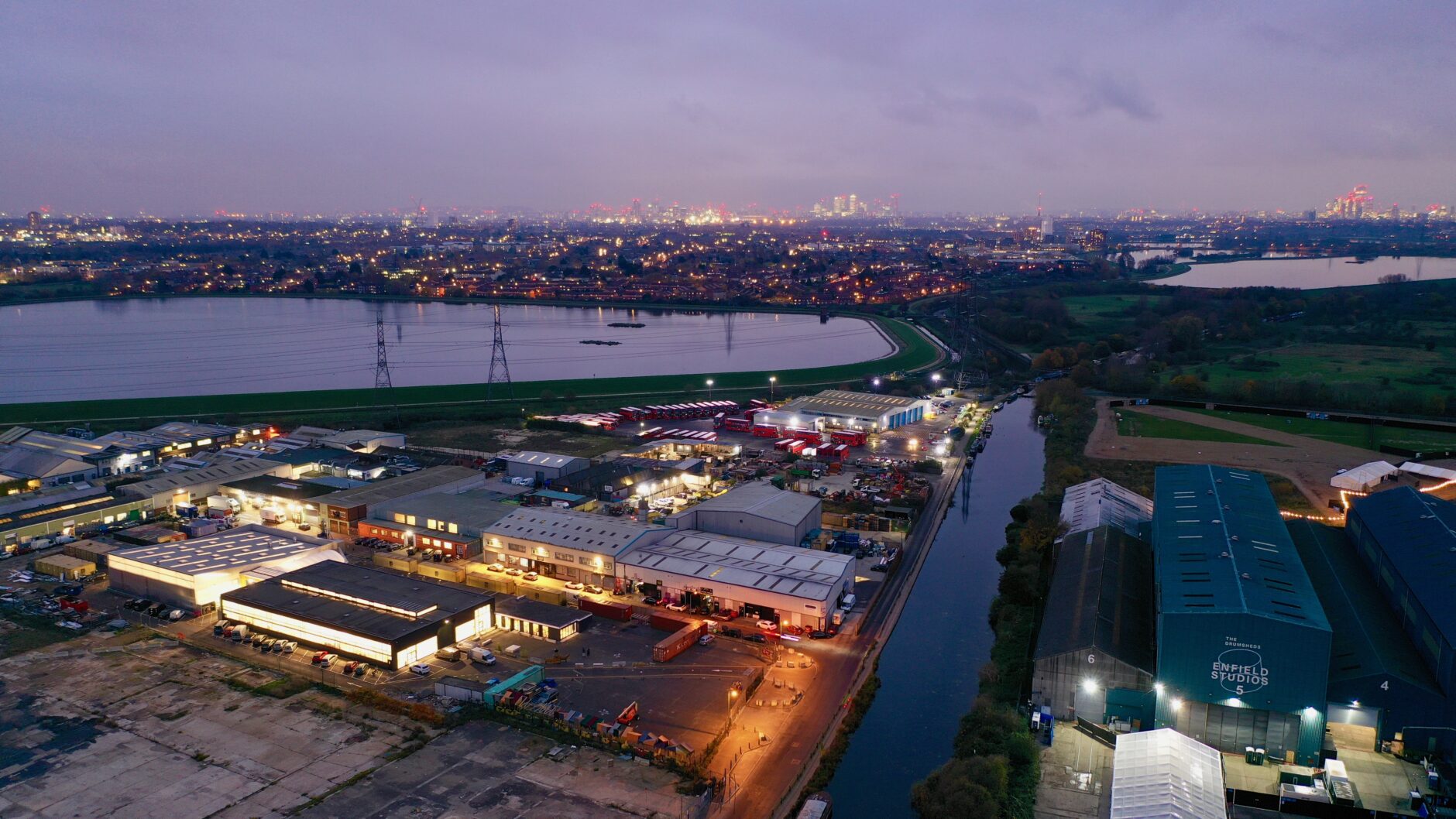
Aerial view of the Bloqs open access factory at Meridian Water by the River Lea Navigation, looking south towards the Banbury Reservoir, Tottenham Marshes and Walthamstow Wetlands. Photo: Alvie Hussein.
Two years ago Enfield was awarded £170m in Housing Infrastructure Fund grant by central government for Meridian Water’s ‘strategic infrastructure’ – new east-west spine road as part of the realignment of the road network, bridges, naturalisation of the Pymmes Brook running through the site and remediation of land on the east side. Putting public transport first, the first Meridian Water building delivered in 2019 (for which KCA was lead architect, with Periscope the landscape architects), was the new £46m rail station, with its gold-hued canopy roof, close to the area’s retail titans IKEA and Tesco.
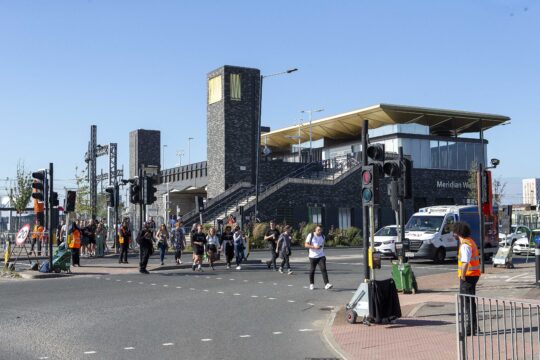
Meridian Water rail station delivered by Enfield Council in 2019, lead architect KCA. Photo courtesy of Enfield Council.
The whole setting will take another leap forward as a lively civic environment when a new bridge landing right by the new Bloqs building is delivered. The new bridge will mean the 18 minute trek from the station to Bloqs – ‘obviously a bit dark at night’, says Freshwater – shrinks to a five minute-long direct route. The new bridge and spine road just next to Bloqs will hugely increase visibility, says Peter George. ‘There’ll be multiple users of vehicles, buses, cyclists and pedestrians who will view Bloqs for the first time. The design of the building is deliberately oriented to speak to both the river edge but also the road edge so that people are aware that parts of the building and the courtyard entrance area are open and welcoming to the public’, he adds.
A Bloqs regular, Parker is experiencing Meridian Water ‘growing really quickly’ – it ‘will lift the area’, she says. ‘It was a flat building site when we first came here in 2018 but in the last two years we’ve seen massive changes, it’s come far in a short time’, she says. ‘That bridge will really help, making the route from the station well-lit’. Bloqs’ spacious public realm, which includes on-site parking, will touch the canal, giving its café and plans they have to green this area lots of possibilities to create an oasis here where passersby can come – either past IKEA and Tesco, or along the canal – to stop, take it all in and feel welcomed into the space.
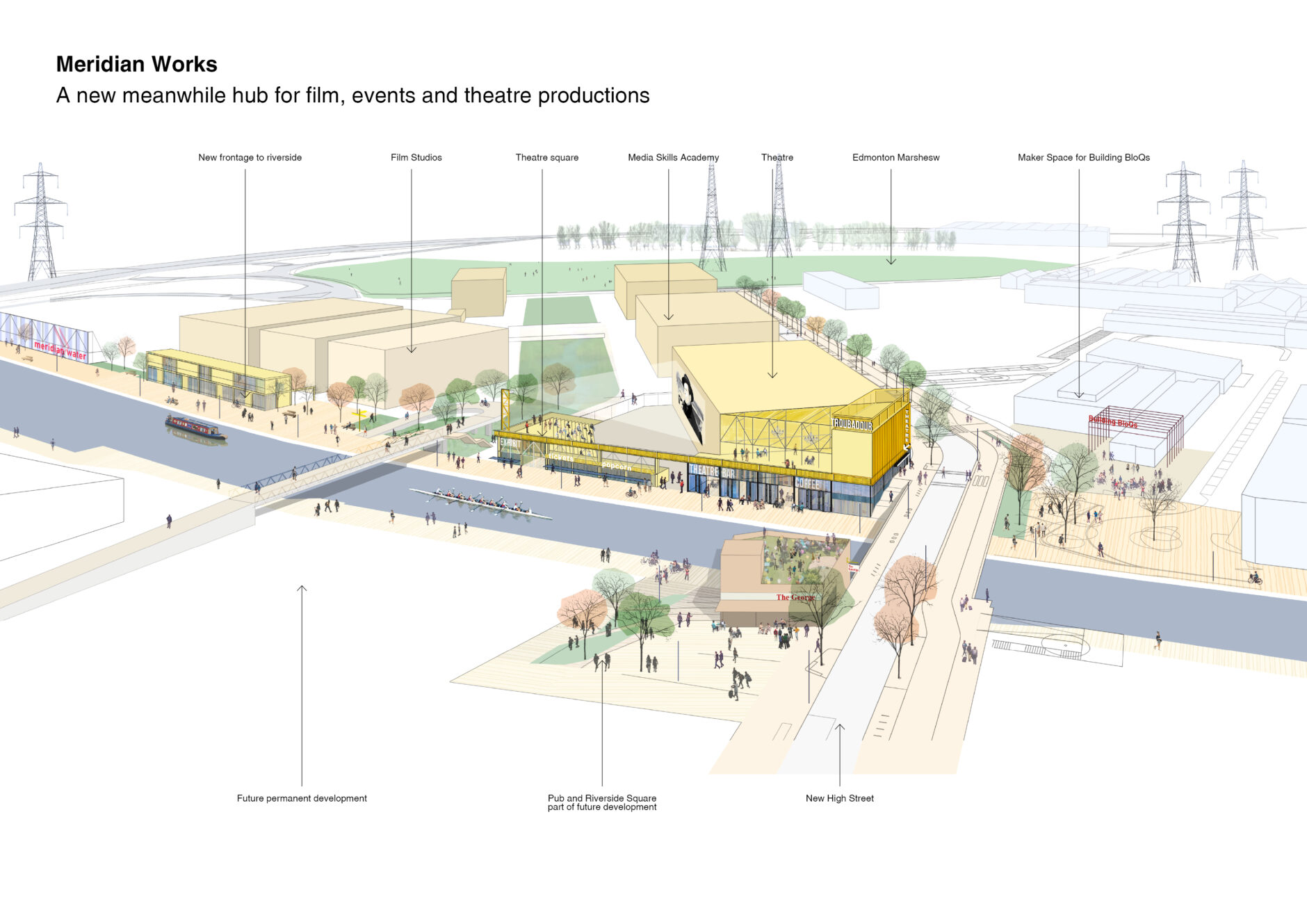
Bloqs’ new open access factory and the Meridian Water Film Studios as part of the Meridian Water meanwhile masterplan, 5th Studio, architects of Bloqs’ building launched on 10 February, 2022. Visual courtesy of 5th Studio.
After ‘rocking up here’ almost a decade ago, Bloqs ‘are really the guardians in that location of that really important pivot, where the (east-west future) high street crosses the Lee Navigation, with Towpath Road in front. The building is in the centre of a space that’s going to become ever more significant’, says Holbrook. His practice 5th Studio’s work on Meridian Water’s meanwhile masterplan, with Bloqs in a pivotal role, strategically designs a shift in perceptions of the whole place. 5th’s approach aims to enable impactful interrelationships between the different elements of Meridian Water across the site as they grow and evolve in the short and longer term, like a family. A lot of the industrial buildings have already been demolished, but one of the strategies has been to try to ensure that nothing else gets knocked down unless it really has to be.
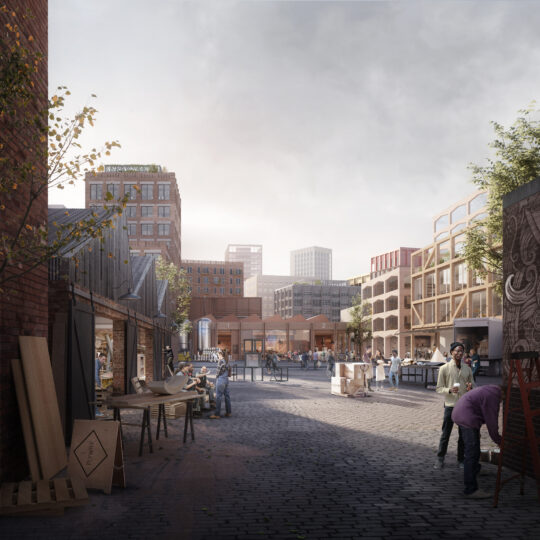
Makers’ space, one of the diverse future places conceived for Meridian Water, a visualisation by Kjellander Sjöberg Architects, spatial lead, masterplanning team. Image: KS Architects/Darc Studio.
‘Your place to make and create’ – the Meridian Water placemaking pillar that’s a quintessential element of its DNA, drives the identity of this whole area east of the canal. Bloqs, and its newer neighbours, the film studios, are prime movers in an active culture of businesses that can scale up. Bloqs on Anthony Way and Towpath Road are in a new frontier where ‘creative production and employment should start to aggregate’, with more pioneering activities settling around them. They’re ‘wild west places’, as Holbrook likes to describe them.
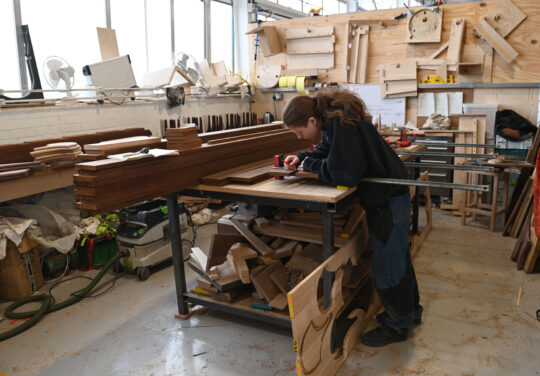
A maker member of Bloqs working at its new open access factory. Photo: Stuart Wilson for Getty.
There’s great latent potential to everything that’s already here – physical structures, people and landscapes – for bringing about the fruitful transition over 20-25 years into a newly sustainable place, Holbrook reckons. He’s bang on in saying there’s something very powerful about the relationship across time between the long term, big scale, slow masterplanning and development strategy at Meridian Water and ‘this very fast, can-do thing on the ground’. It’s refreshingly far from old school masterplanning, which would have rased everything and created a monocultural housing area. Meridian Water does things in a resourceful, adaptive and relational way, and Holbrook sees Bloqs as ‘a trailblazer as a model for that’.
Creative production
The expansion of Bloqs as an anchor and generator of the creative industries in Enfield also enables it to continue performing as both a magnet for new creative businesses and a strong protagonist in supporting the quality and reach of creative arts education locally. Standing resolutely for accessibility and the merits of a circular economy, Bloqs’ model is an inspiring one for SME businesses coming to Meridian Water and local businesses looking to partner through collaborations and be part of supply chains.
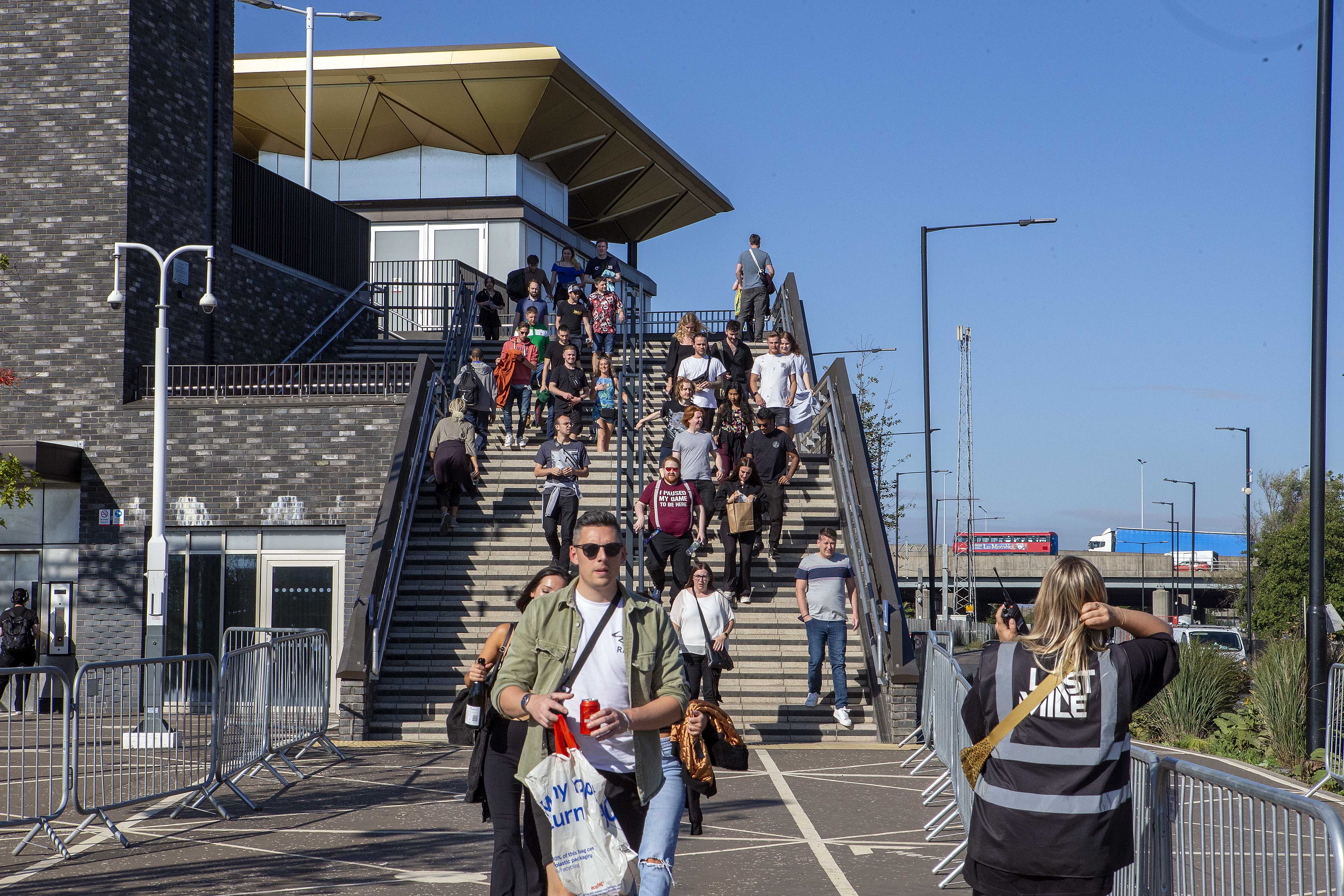
The arrival of music festival goers in Sept 2021 at Meridian Water rail station, on their way to the Meridian Water site. The rail station project was delivered by Enfield Council in 2019. Lead architect KCA; landscape design, Periscope. Photo courtesy of Enfield Council.
Enfield’s a young and diverse borough with a strong tradition of entrepreneurialism. Bloqs’ presence at Meridian Water opens a new chapter in local business culture, propelled by a shift away from consumption – retail big boxes along the North Circular, storage and logistics, to production. Production – that catch-all word encompassing conceptual design, ‘content creation’, research and development prototyping innovation – is the beating heart of the creative industries. The area’s already seen the booming growth of the film and tv sector, particularly during the pandemic. On Bloqs’ doorstep are Troubadour Meridian Water Studios and Enfield Studios and locally, Netflix, OMA, VGM and the London Film Foundation. All this has led those in the biz to describe the borough as ‘Enflix’. Then there’s the rise in craft brewing locally, Beavertown and Enfield Brewery’s Enefeld, another whole story in its own right.
To help fuel local economic recovery and jobs opportunities, what are needed are more affordable facilities fit for purpose across the city, and equally in Enfield, a borough that has the space. As a genre, spaces for creative production need to be scaled appropriately, so that takes time. They need support spaces – offices – and vitally, to be fully sustainable on brownfield land. By creatively repurposing old buildings through versatile adaptation their character is evolved as a way of breathing new life into the area.
Waste not, want not, and seeding the future
Bloqs is clearly remaking itself in a highly resource-efficient manner while staying true to its roots. Firstly, through ‘so many people using one workshop space’ with its own set of machines, the land use is intensified. Whereas if all their members needed their own workshops, ‘the footprint of that would be enormous, not affordable’, says Parra.
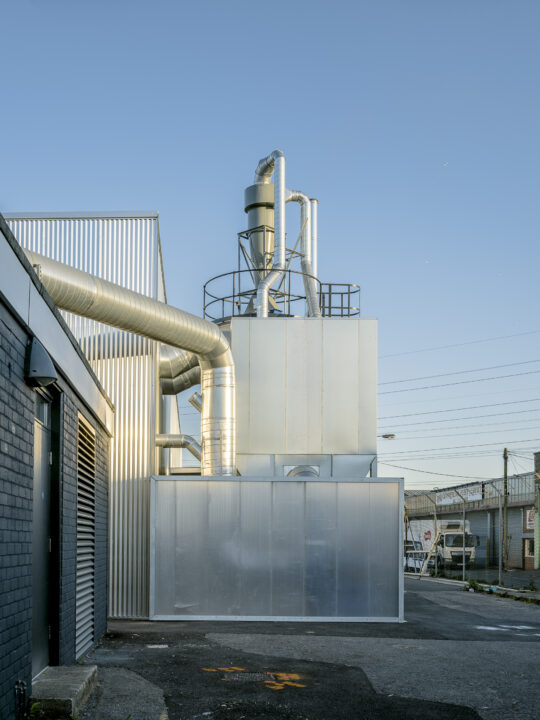
Bloqs’ new factory has a biomass boiler providing renewable energy for heating and hot water from all its waste wood chip and saw dust through dust extraction. Photo: Timothy Soar.
Secondly, waste processing. Adhering to circular economy principles from the start, Bloqs encourages members to recycle and share all leftover materials. The factory recoups energy from all its waste woodchip (offcuts) and saw dust through dust extraction, like a vacuum cleaner, via their big new biomass boiler which provides renewable energy for heating and hot water.
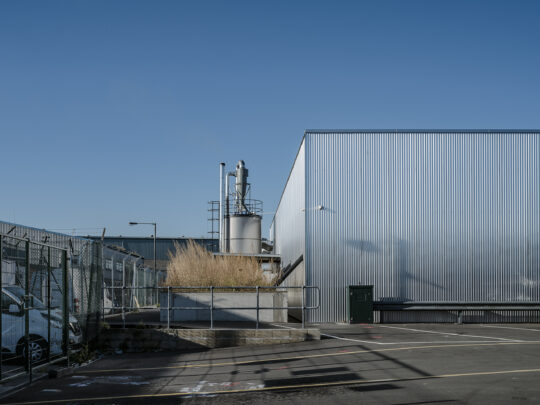
Bloqs’ new factory’s biomass boiler providing renewable energy for heating and hot water from all its waste wood chip and saw dust through dust extraction; and rain garden, a sustainable drainage system, on the corner of the building. Photo: Timothy Soar.
Before, a lot of its wood waste was going to landfill, ‘a damn crime these days’, he insists. The water that runs off the roof goes into the rain garden, a sustainable urban drainage system (SuDS) from where in summer sunflowers crane their heads up to the sky. Parra and his colleagues will include SuDs in the community gardening projects they’re planning, and Freshwater mentions ‘potentially a space to nurture and grow new trees for the site’.
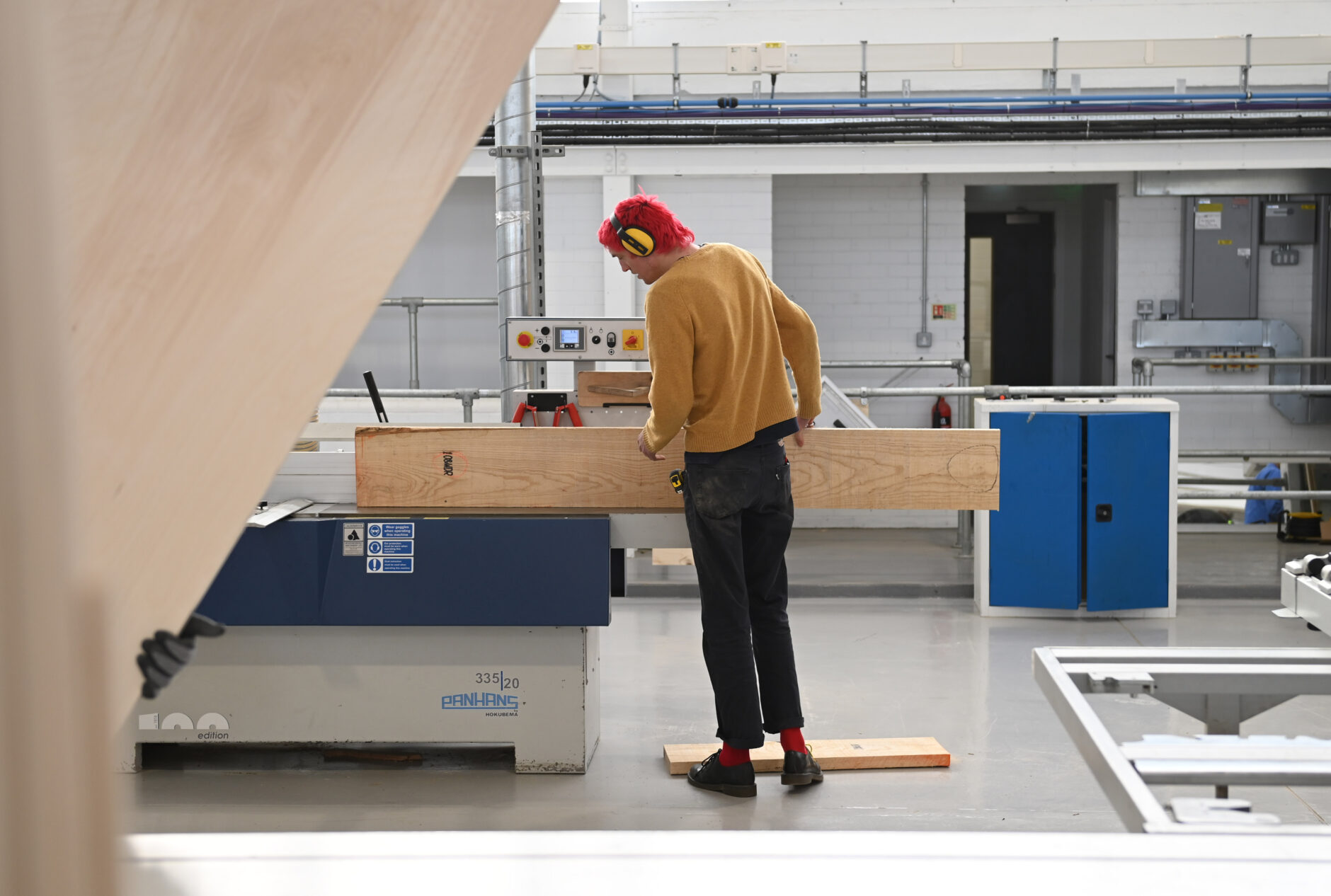
Making in the big airy space at Bloqs’ new open access factory. Photo: Stuart Wilson for Getty.
Thirdly, ‘accessibility is the very foundation and bedrock of what we’re about. We regard this as a service, a public space belonging to our members, and accessible to residents locally in order that they can make a living’, he says. The Bloqs model makes an otherwise overly expensive process economically viable through a variable overhead, because when makers don’t have work, they aren’t asked to pay charges. Only when they’ve grown to a certain size is the charge a fixed one. It means makers can access all Bloqs’ benefits: networking with other makers and visitors, shared access to machinery and facilities, which give people the social and economic means to build their own livelihoods.
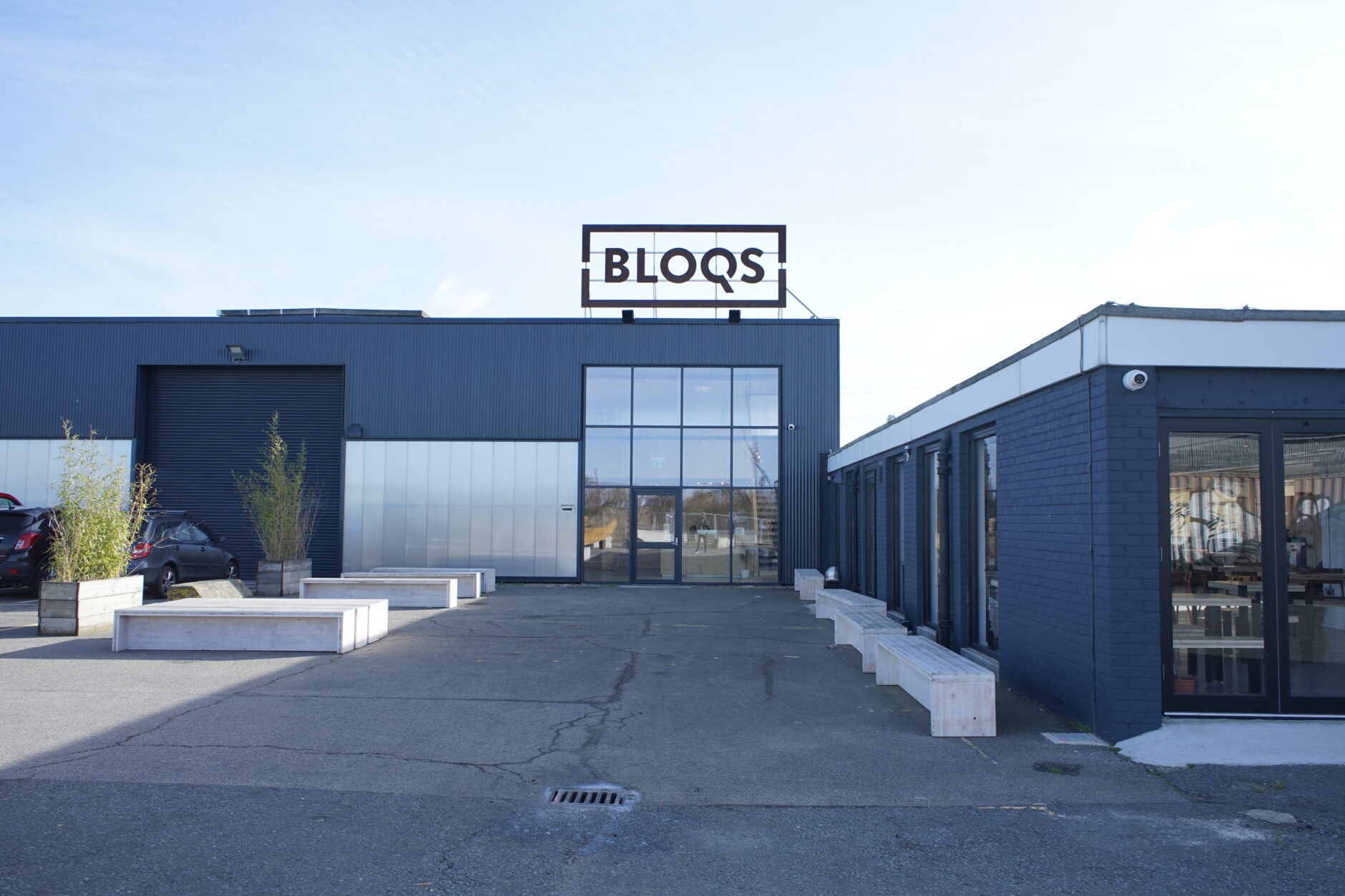
The entrance to Bloqs with the new Bloqs sign made on-site at the open access factory. Photo courtesy of Bloqs.
As a meanwhile opportunity operating on a 12-15 year lease, Bloqs is contributing towards Meridian Water’s meanwhile jobs target, and Enfield is obviously keen to retain them on site when that lease ends. There is clearly a major opportunity to contribute to the permanent jobs target in due course. ‘They’re symbolic of the type of partnership we want to achieve in the context of Meridian Water, particularly in the context of our creative industries set up’, says George, but also ‘other businesses that catalyse growth in other industries in a similar way’.
Meridian Water‘s Employment Strategy is based on multiple industries, and ‘what Bloqs has done has seeded the creative industries at Meridian Water as well as supporting the culture industry’. In ‘understanding the synergies between their businesses and what Bloqs does, and being inspired by their business model’, firms can benefit in many ways, one being generating their own circular economy practices, which also works to foster collaboration: ‘What one business considers to be waste, another considers to be the core components of a future product’, he explains.
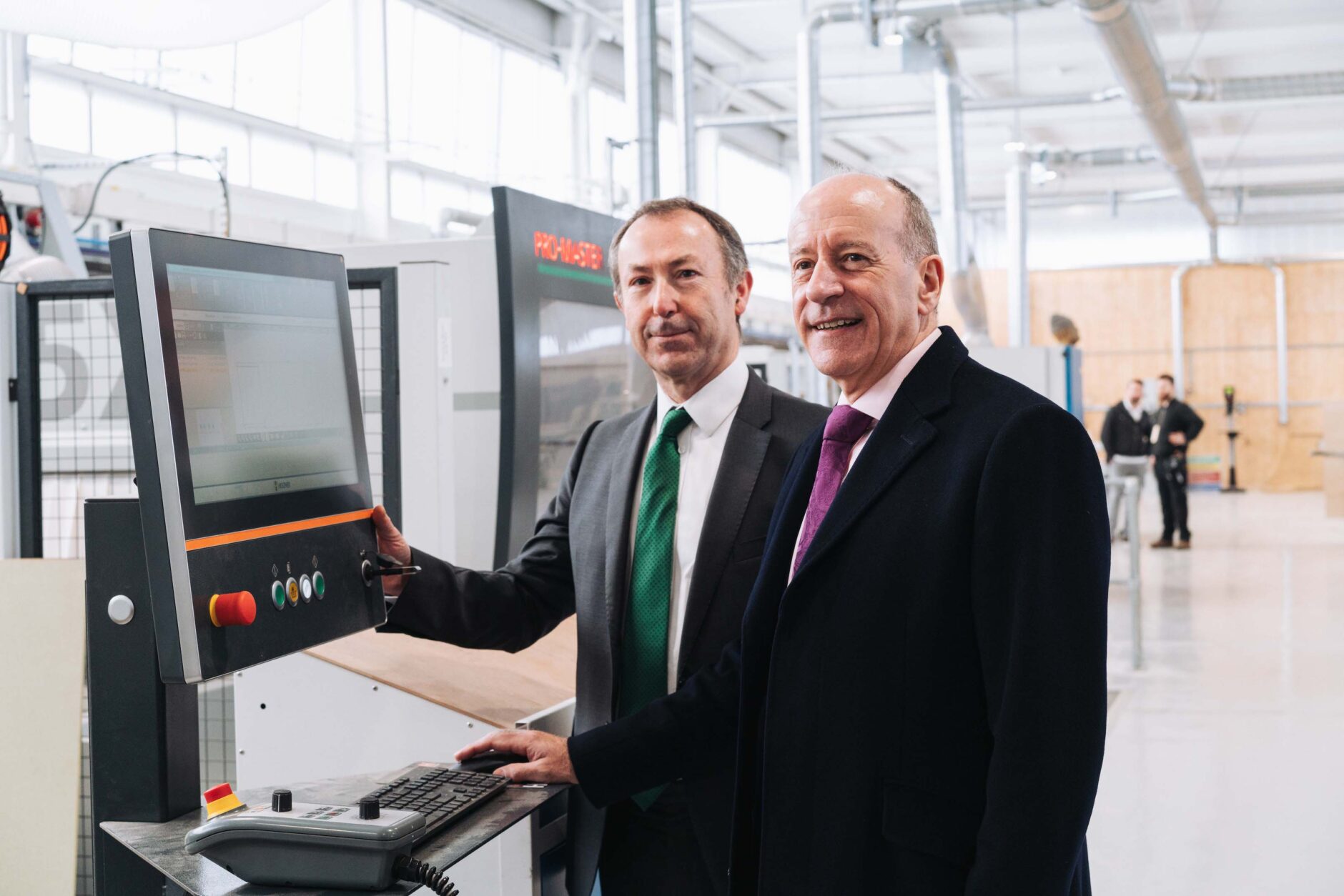
Jules Pipe, Deputy Mayor of London (right) with Malcolm Cuthbertson, Managing Director, Michael Weinig UK, of which Holz-Zer is a subsidiary, equipment makers and partners with Bloqs, at Bloqs’ new open access factory, on launch day, 10 February 2022. Photo: Claudia Agati.
The legacy
‘Bloqs is a new kind of laboratory for a new day. It’s a space for innovation and to help usher in the city’s next phase’, Parra explained to the audience at the London Real Estate Forum (LREF) in 2017, underlining the social enterprise’s commitment to redistributed manufacturing’s huge possibilities through the right kind of workshop model Bloqs represents, one that allows ‘uptapped talent to surface and make their mark’. ‘If our city has a robust network of workspaces and makers, we’ll have the raw materials for a successful future’, he said.
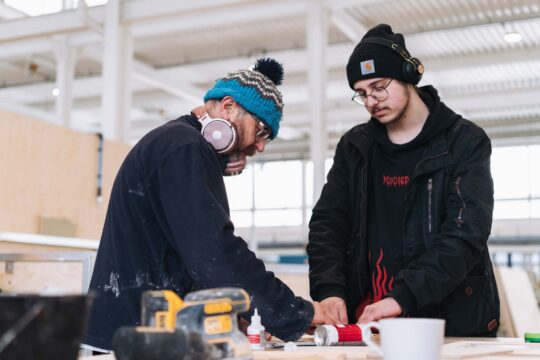
Bloqs maker members working at the new open access factory. Photo: Claudia Agati.
‘What really distinguishes us from other open access workspaces is that we’re designed specifically to enable commercial activity’, Parra told the audience at the Bloqs’ open access factory launch on 10 February 2022. ‘With this new facility we can give our community the space to make it work, we can create partnerships with education providers, manufacturers, suppliers and our local communities’. ‘I’ve done my research and there’s no one operating at this scale’ with this much ‘space, work benches and machines and onsite technicians’, Serumaga emphasises.
Marked out by its strong conceptual identity, scale, cross-sector nature and sheer affordability, Bloqs’ new factory has its own DNA and shows the way for a whole model of community maker spaces, just as they envisioned some years back. There is a network of open workshops across London and the home counties Bloqs has been part of from the start, and maker spaces exist around the UK. Fantastic initiatives including Poplar Works, a new maker space for fashion (a Poplar HARCA project with the London College of Fashion and the Trampery), Peveril Gardens Studios, an arts studios and public roof garden, run by Forma (Old Kent Road), and the Trampery Fish Island Village (a 6 acre ‘campus’ for fashion and other creative start ups opening in 2022) next to the Olympic Park, have emerged in recent years. All these initiatives realised on the ground are helping to shifting the conversation, which includes more attention to retrofitting, sustainable investment patterns and zero carbon initiatives towards taking culture and creative uses far more seriously as part of the fundamental financial basis of London’s recovery, says Rumi Bose, Principal Project Officer, GLA (speaking at the NLA’s Makers Spaces webinar, 4 March 2022).
The creative industries represent one in six of UK jobs. The sector contributes over £116.9 billion to the UK, according to the DCMS (2019), which is 5.9% of the UK economy. It also stated that the sector increased by 43.6% between 2010 and 2019. Looking forward from the pandemic, Creative UK, the independent network for the UK’s creative industries, revealed not long ago that this diverse sector alone has the potential to create a 300,000 new jobs and generate an extra £28bn for the UK economy by 2025. Bloqs, in promoting innovation and collaboration in the way that it does, supports the removal of obstacles to that trajectory, by making sure operations and spaces are socially, economically and environmentally sustainable. ‘The economic results are robust. Makers make a living here. They pump revenues back into supply and service in the local area. Incomes go towards tax and back into the communities makers live in and make home’, Parra said at LREF.
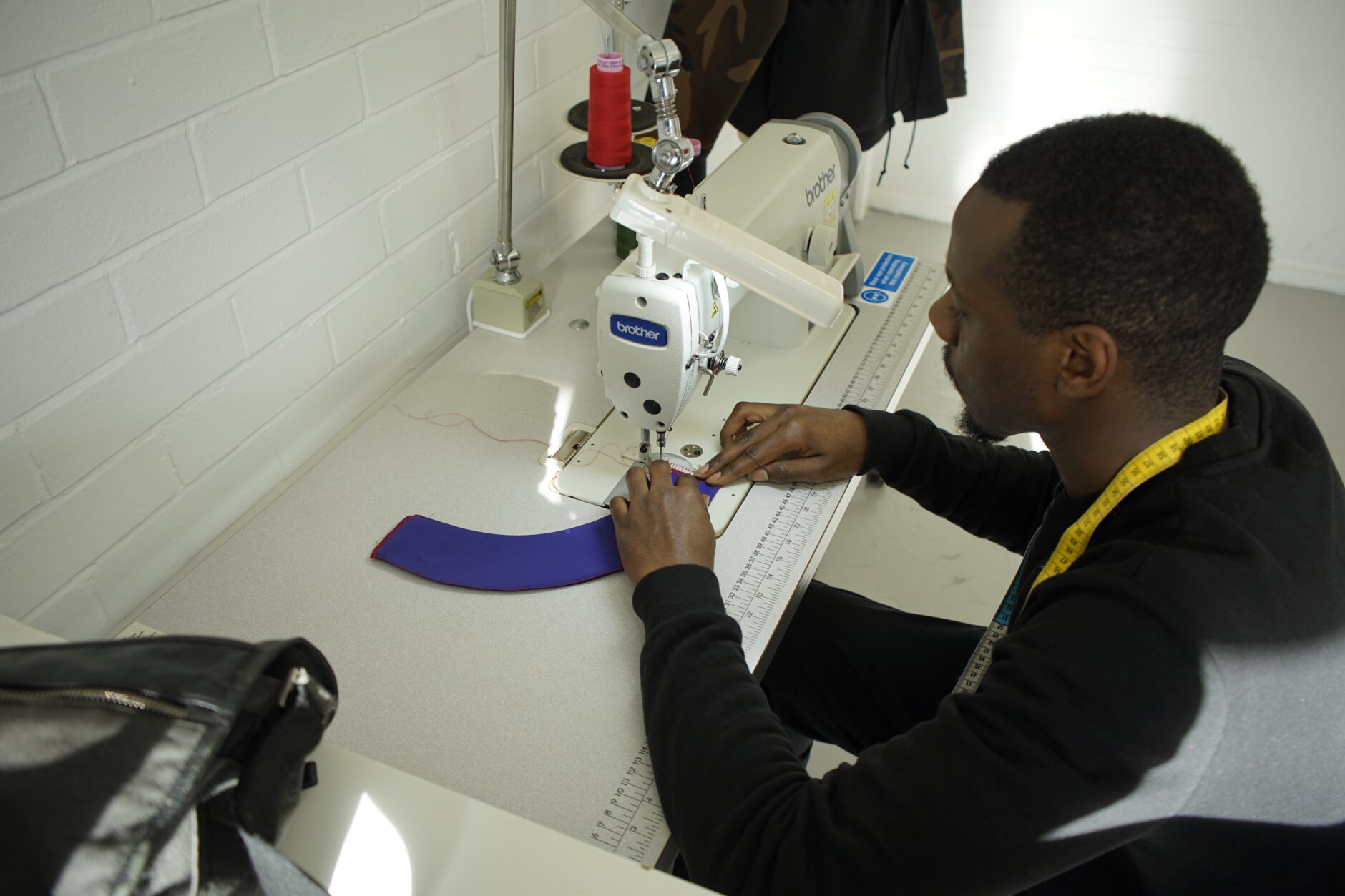
A maker member of Bloqs working in the fashion and sewing studio at the new open access factory. Photo: Elijah Serumaga.
Joseph Henry, Principal Project Officer, North East Regeneration, at the GLA, has monitored the completion of Bloqs 2.0. He can see just how well it is lowering the barrier for access for people to have social and economic experiences. ‘Here you can meet and work with people who aren’t like you. It’s beneficial for all Londoners that Bloqs widens the perspective of making that ‘all makers are middle class artisans with beards’, for example.
Henry sees the advantage of Bloqs’ locating making skills and business in the same space, because as Meridian Water – of which it is part – develops, it is simultaneously building up an ecosystem of people at what he calls its enterprise centre. ‘With Meridian Water there is a lot of commercial ground floor use coming on’. Now, with the classic models of ground floor uses diversifying and adapting post-pandemic, he imagines there could be an outlet for manufacturing on the ground floor of one or more of the buildings, or more workshop-type spaces. There’s also the potential of the retail offer that will come from Bloqs-produced artefacts of various kinds, if makers club together to take on a retail unit.
It’s this kind of creative interaction with Meridian Water and its locality by different maker organisations that also interests the GLA, for its insights into how things might be done elsewhere in London as well, Henry says. ‘It’s ok to do the one project, but what does that mean for the city, for the wider conversation?’, Henry asks. A lot, he believes. It supports the sustainability of the creative industries, their embeddedness in local communities and impact on their economic and social health from the ground up.
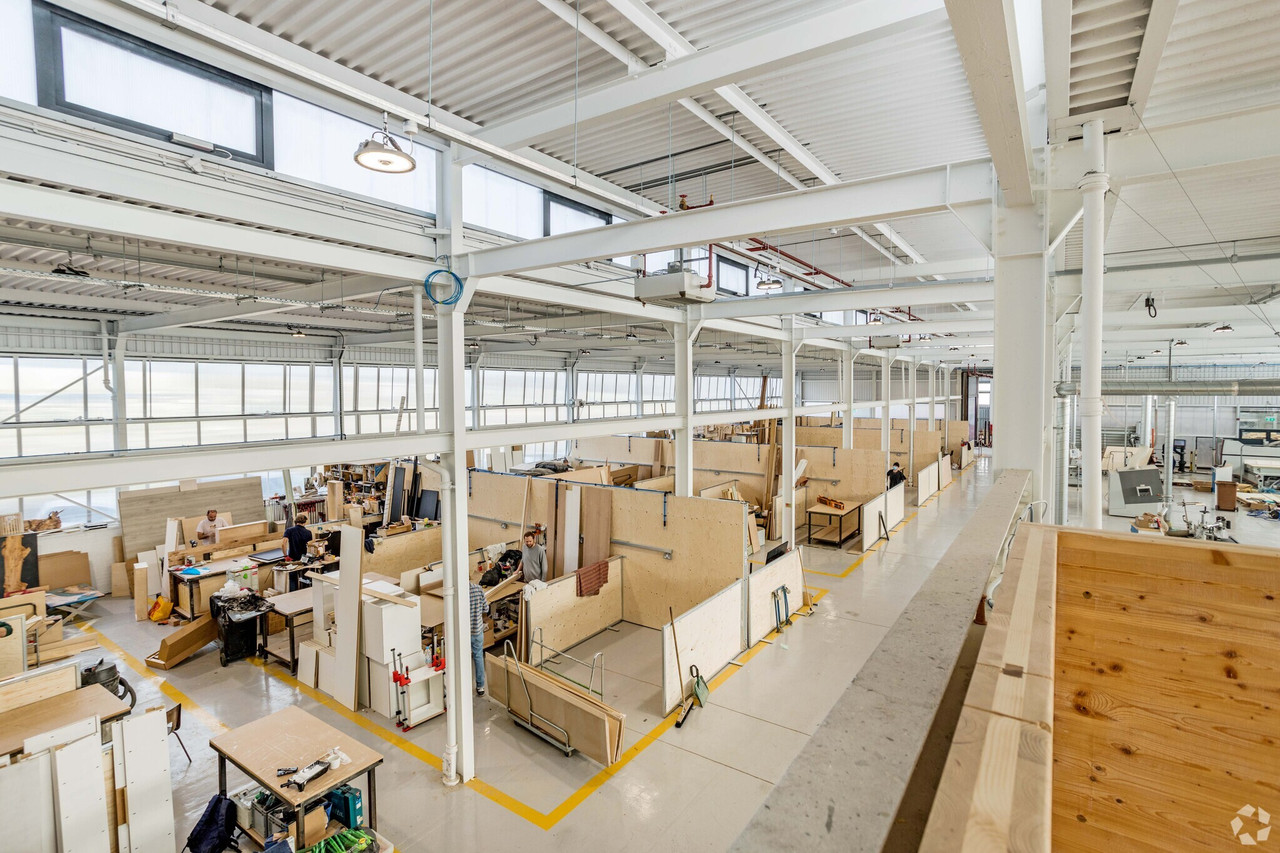
View from the upper level of Bloqs’ new open access factory. Architects: 5th Studio. Photo: Amelia Hallsworth.
What makes Bloqs work is ‘the personality of the individuals involved managing the model, he feels. ‘Their convergence is unique. They are able to make things happen, and have a long term commitment to the project’. While the GLA has helped through being a facilitator of the project, he recognises that Bloqs people have the ability to embed themselves at Meridian Water for the long term. Getting Bloqs 1.0 set up was a major achievement for its founders. It was only because of the public money from the GLA and Enfield Council that they could take advantage of the opportunity to relaunch as 2.0. ‘They probably didn’t expect to be delivering a centrepiece of urban regeneration when they first set up Bloqs!’, says Henry, delighted at the outcome.
Architecture educationalist Neil Pinder, who teaches at Graveney School in Streatham, south east London, founder of the not-for-profit HomeGrown+, and part of the architectural consortium working on the Meridian Four mixed use phase at Meridian Water, regards Bloqs as ‘a brilliant hands-on innovative and groundbreaking resource’. For him keeping it affordable is key, and receiving the right funding going forward is critical, which in the context of the big picture of central government reducing arts allocations as part of secondary education, is worrying. He echoes Parra and Henry’s wish to see hubs like this around London which foster the educational skills of local people so they can benefit them, because ‘there’s a big skills shortage’.

Approaching the new Bloqs open access factory at Meridian Water. Architects: 5th Studio. Photo: Amelia Hallsworth.
Bloqs, with its affordable workspace and cultural assets, is highly significant for the place-based approach to transforming and diversifying its industrial areas, town centres and employment opportunities Enfield adheres to, supporting a legacy that enables everyone in training opportunities, entrepreneurship and reskilling, and local creative growth of the cultural industries and allied collaborators. ‘The success we expect Bloqs will deliver now the building is open gives the Council a lot of confidence and kudos that we’re able to deliver these types of projects’, says George. It ‘will support future business cases to deliver similar types of employment projects, meanwhile or permanent, in the future’.
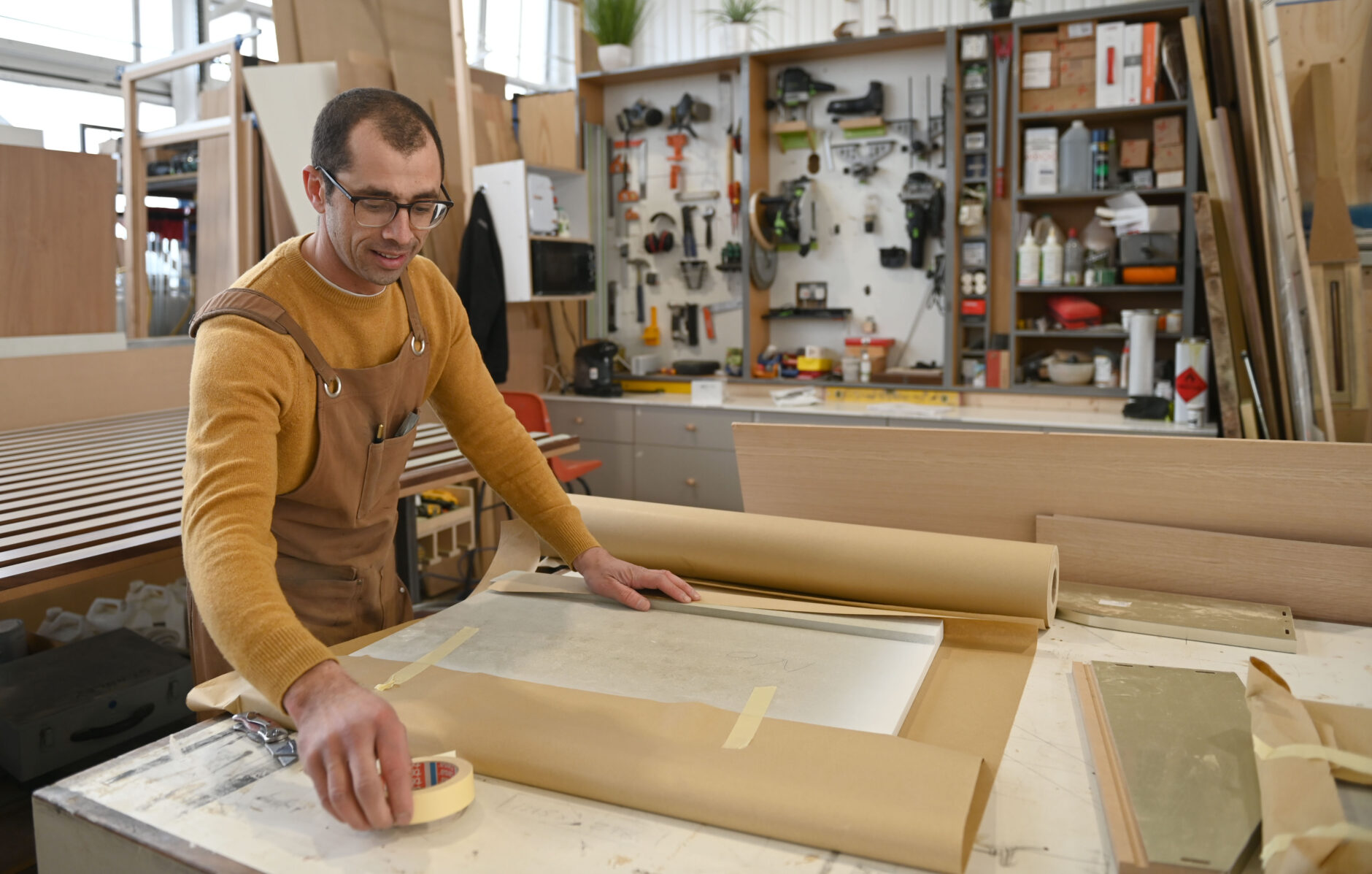
A maker member of Bloqs at work in the new open access factory designed by 5th Studio. Photo: Stuart Wilson for Getty.
Meanwhile has to be integral, not incidental, within new developments like Meridian Water, George believes, and his advice to other local authorities and non-profits who want to generate real lasting value from their meanwhile strategies is ‘to think about meanwhile in terms of an opportunity to seed something much greater than the parts’, one where neighbouring businesses pursue and benefit from collaboration opportunities – enriching a neighbourhood’s social amenity and value.
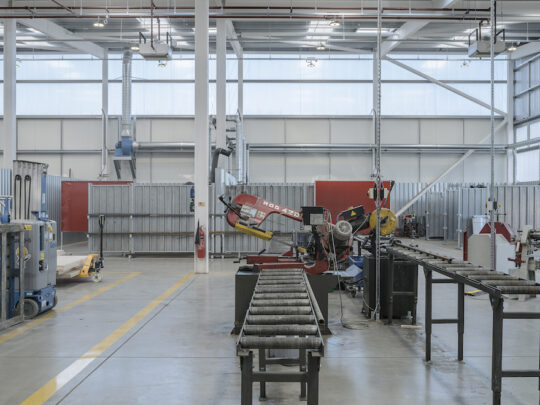
Bloqs new open access factory. Photo: Timothy Soar.
That is also a key goal of the Mayor’s Cultural Infrastructure Plan: A Call to Action for London (2019), and its strategies to encourage everyone to pull together and protect and grow the city’s cultural facilities have been widely influential. However, particularly after the damaging impact of the pandemic, a big question remains for London’s creative business owners. Where will they affordably operate from in the coming months and years? And, irrespective of how far some working-from-home remains a pattern, how best can creative making premises be integrated within our communities, because they are demonstrably valuable in a ‘15-minute city’ model.
The ’15-minute city’ is a neighbourhood vision where walking, cycling and public transport enables easy and quick access to homes, workspaces and community amenities, localising its economy and reducing dependency on vehicles. Bloqs and Meridian Water show the will for it to be done. This kind of organic developmental approach is needed more widely.
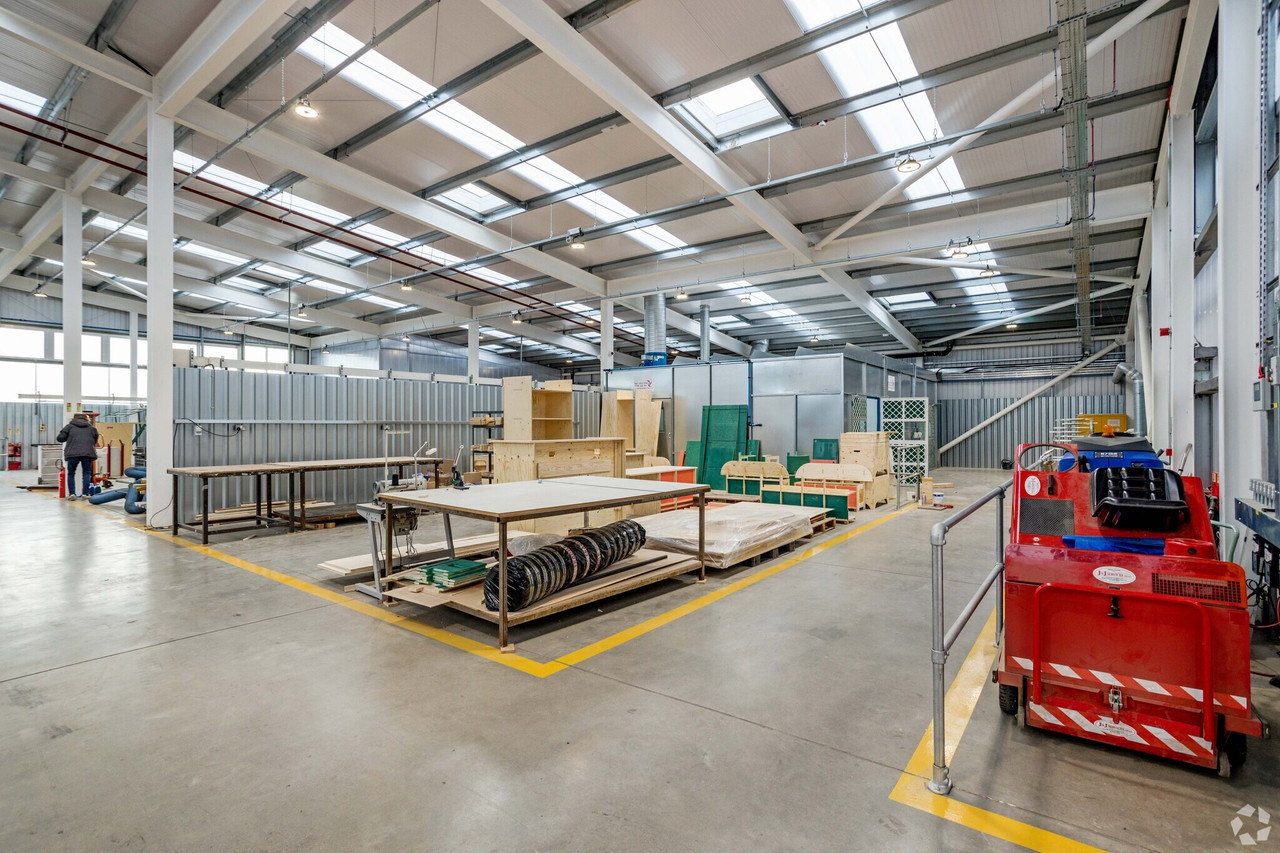
Bloqs’ new open access factory at Meridian Water is a generative grassroots cultural model every city and town could benefit from. Photo: Amelia Hallsworth.
To put this in a wider context, overall the creative industries sector is made up predominantly of agile and lean micro businesses. It’s been growing at five times the rate of the UK economy as a whole. Since the pandemic hit creative businesses have been ‘on a knife edge, with thousands of creative business and jobs lost’, the Creative Industries Federation reported to the UK government in 2020.
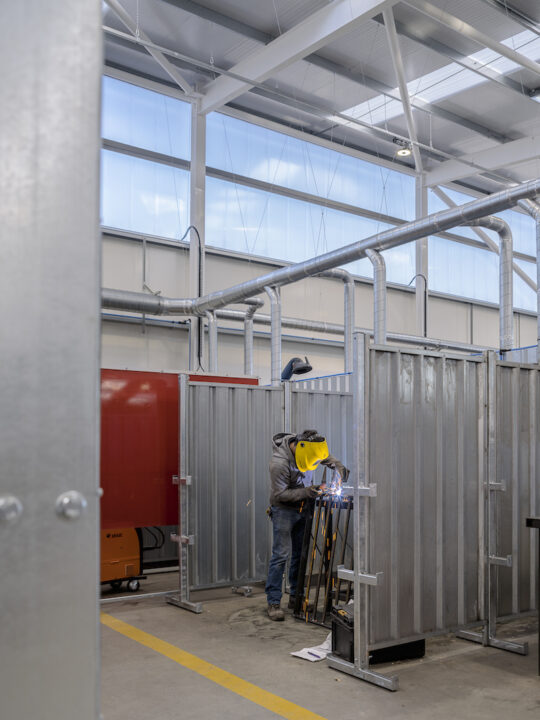
Bloqs’ spacious new open access factory. Photo: Timothy Soar.
To counteract this the sector has been proactive and ingenious in driving its own renewal, modelling, piloting and implementing new business models and ways of working. ‘Targeted and effective means of supporting each other and the most vulnerable in society has also been at the heart of their thinking’, the report underlines. This further incentivises and supports a holistic vision of creative innovation – and, as the sector recovers its fire power, it’s vital for the health and wealth of UK society as a whole.
Bloqs, as a generative grassroots cultural model every borough could benefit from, sounds amazing. How can we make it feasible? Making in London as an entrepreneurial activity clearly has a much higher entrance than, say music, online digital or market trading, because makers need access to expensive equipment, and to rent a membership space.
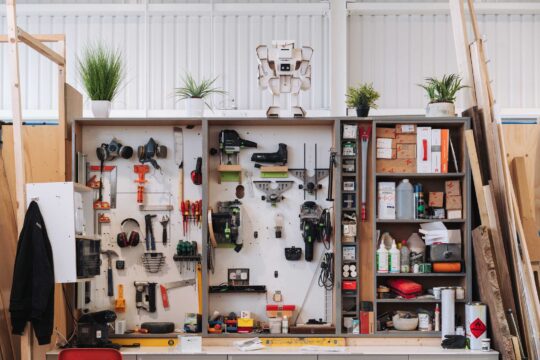
Bloqs’ new open access factory boasts an impressive shop at the front of the building selling all the possible things makers need for their work. Photo: Claudia Agati.
Making, in our increasingly screen-based world, gives us the physical intimacy and psychological rewards of hands-on activity and shared learning. It’s carried out in places ideally kitted out with resources, and if help is close at hand, so much the better. Making fosters creativity, community, enterprise, wellbeing and resilience in visceral and complementary ways.
Ensuring making skills are accessible to all in the way Bloqs is doing through its enlightened social enterprise model is a fantastic way to build resilient communities in the UK and elsewhere. Factories like Bloqs could and should become a top priority across cities and towns in the UK, scaled in ways that stack up financially, solutions that grow out of local needs and nurture new civic connections of different kinds, as Bloqs is doing. And none should have to put up with leaky roofs.
At a time of sorely needed civic recovery missions, it would put some of those redundant department stores and smaller former retail units to good use, for example. One is already being repurposed in Newcastle to create the new Farrell Centre, a creative exhibition space for engaging in architecture and planning. While not a maker space, it will be a place that’ll include creative start ups. News of Bloqs’ new factory has already prompted people to ask whether an open access maker workshop could be part of the future of Sheffield, where John Lewis has closed down.
As someone who’s loved making all kinds of things since I was tiny, and who benefitted greatly as a teenager from experiences in art, design and production at youth theatre and at Goldsmiths College in south east London, I see Bloqs as a massively creative, uplifting, engaging and all round sustainable and sound answer to so many questions and challenges being faced in London and cities and towns across the UK. Studying how Bloqs, and related models of great promise, are happening in London and around the country, needs to hasten the expansion of funded social impact projects of huge value to all community members.
Thanks a million, Bloqs and all its partners, for bringing ‘the space you need to make it happen’ into being. A factory the scale of 74 football fields is fortunately not being planned in north-east London. Instead, there’s Bloqs, and it’s the creative industrial real deal.